- • 2+ years of experience in how the AI development lifecycle impacts systems, distributed computing, and cloud-native paradigm
- • Main research focused on how blockchain security could be enhanced by 65% within decentralized infrastructure
- • Other research projects (36+), looking at how future trends could impact network security in AI automated systems
- • Had 16+ publications in the Journal of Computer Science and secured +$16M in grant funding over the last two years
- • Assisted 13+ senior researchers and computer science professors in completing various applications by debugging codes
- • Participated in various other aspects of the software development process, including assessing briefs, writing code, and testing systems to ensure 100% accuracy
- • Built 10 full-stack web applications with Java and Ruby
- • Was tasked to help 5 researchers with the development of for-academia software with a focus on security
- • Analyzed the code specifications and transformations to comply with 100% of all security, accuracy, and client-briefed protocols and parameters
- • Met all mandatory schedule dates within the development process - receiving 98% approval in customer satisfaction

9 PhD Resume Examples & Guide for 2024
Your PhD resume must highlight your extensive research and expertise in your field of study. Tailor it to showcase how your unique skills are transferable to the job you're applying for. Demonstrate your proficiency in critical thinking and problem-solving through concrete examples of your work. Articulate your ability to communicate complex ideas effectively, as this is key to standing out.
All resume examples in this guide
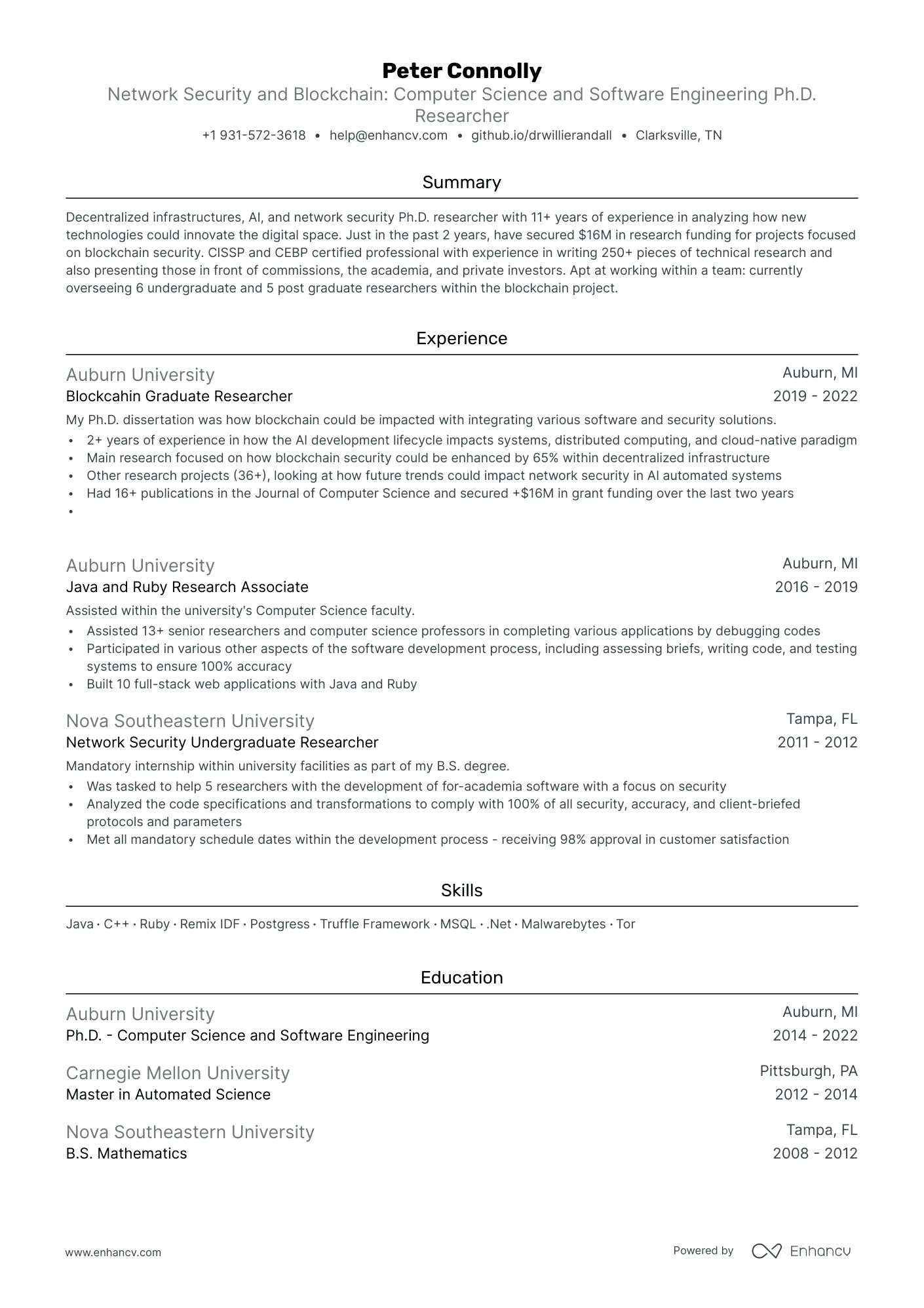
Traditional
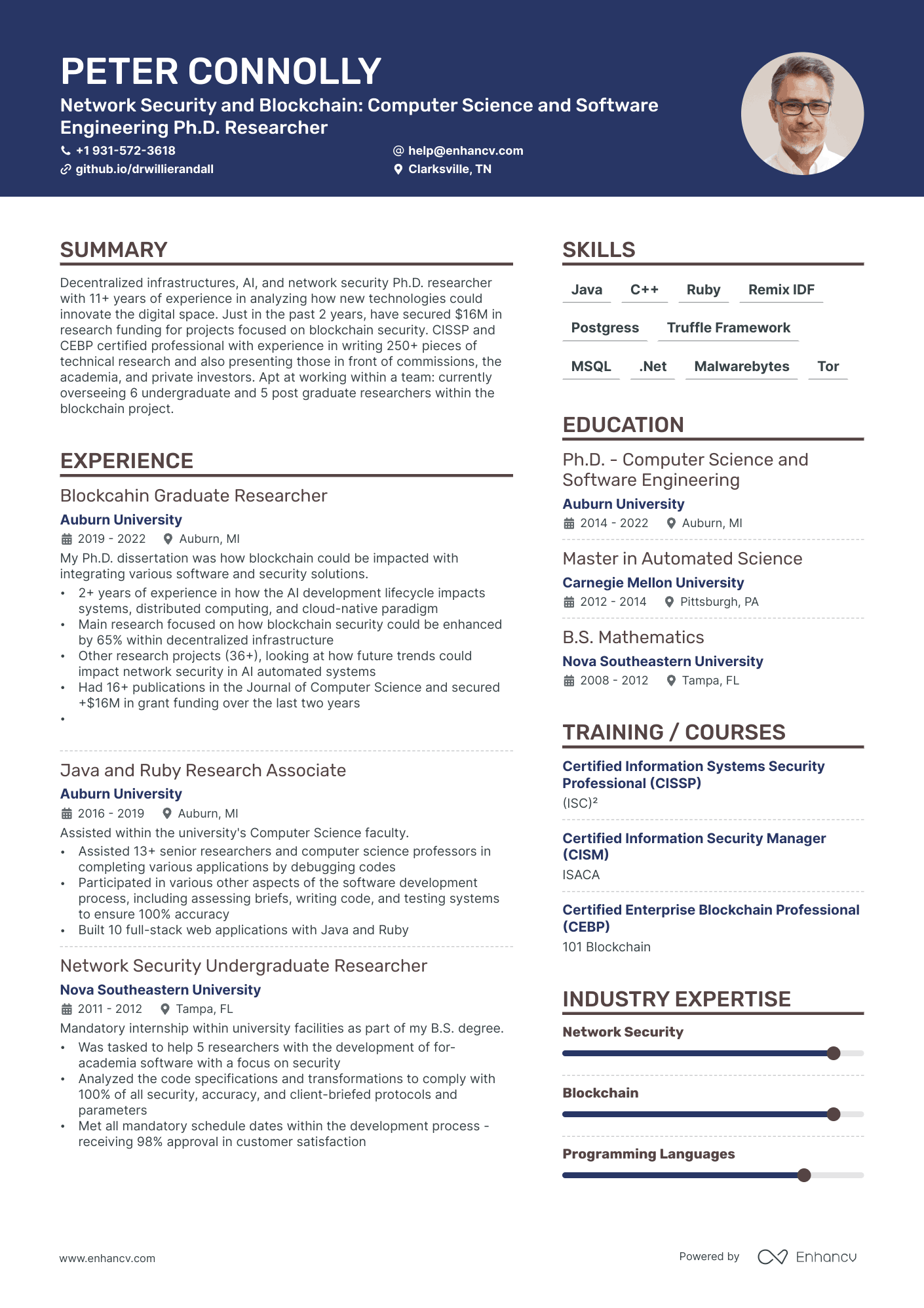
Lecturer in Molecular Engineering and Bioengineering Researcher: Biomedical Engineering, Ph.D. resume example
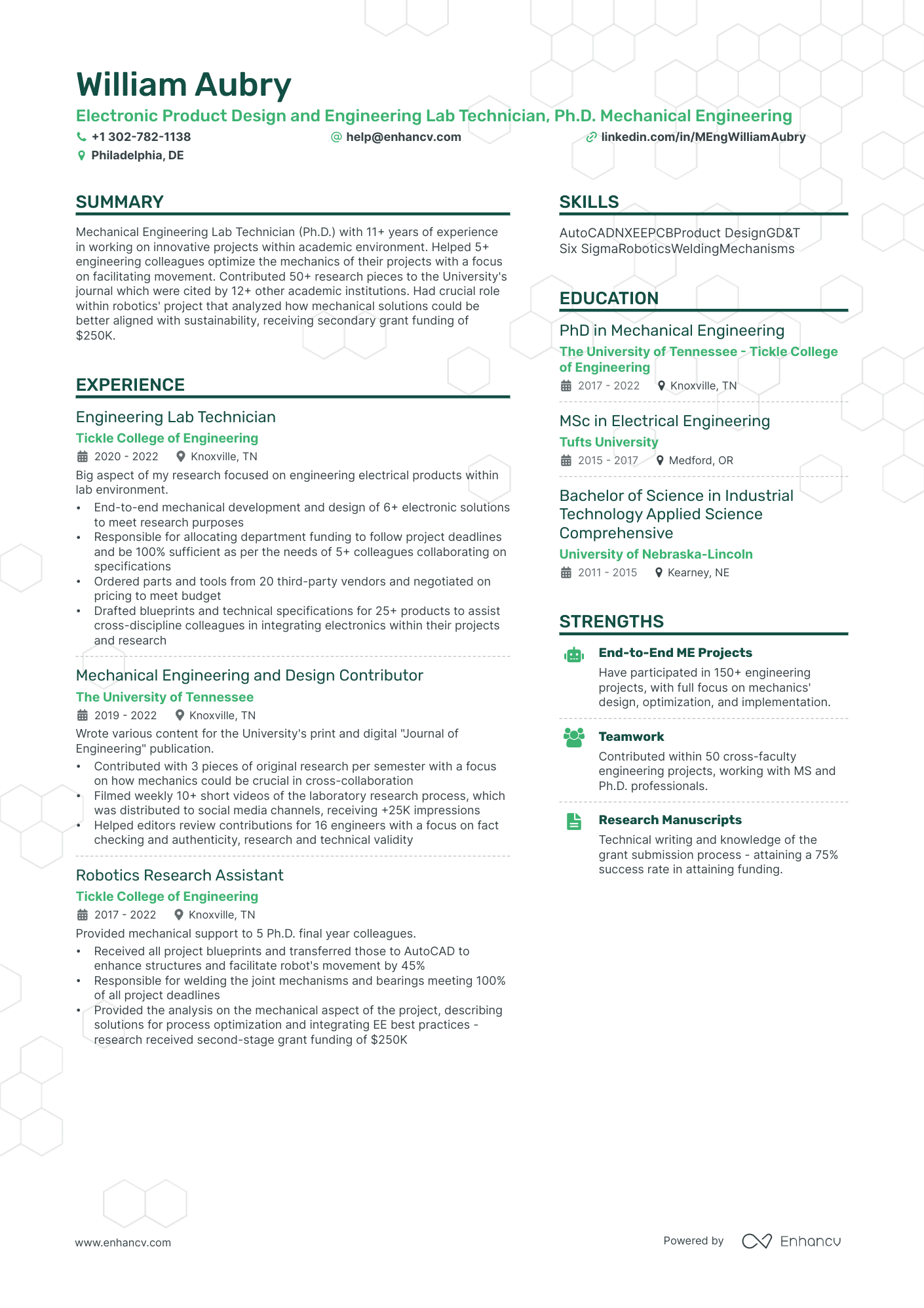
Electronic Product Design and Engineering Lab Technician, Ph.D. Mechanical Engineering resume example
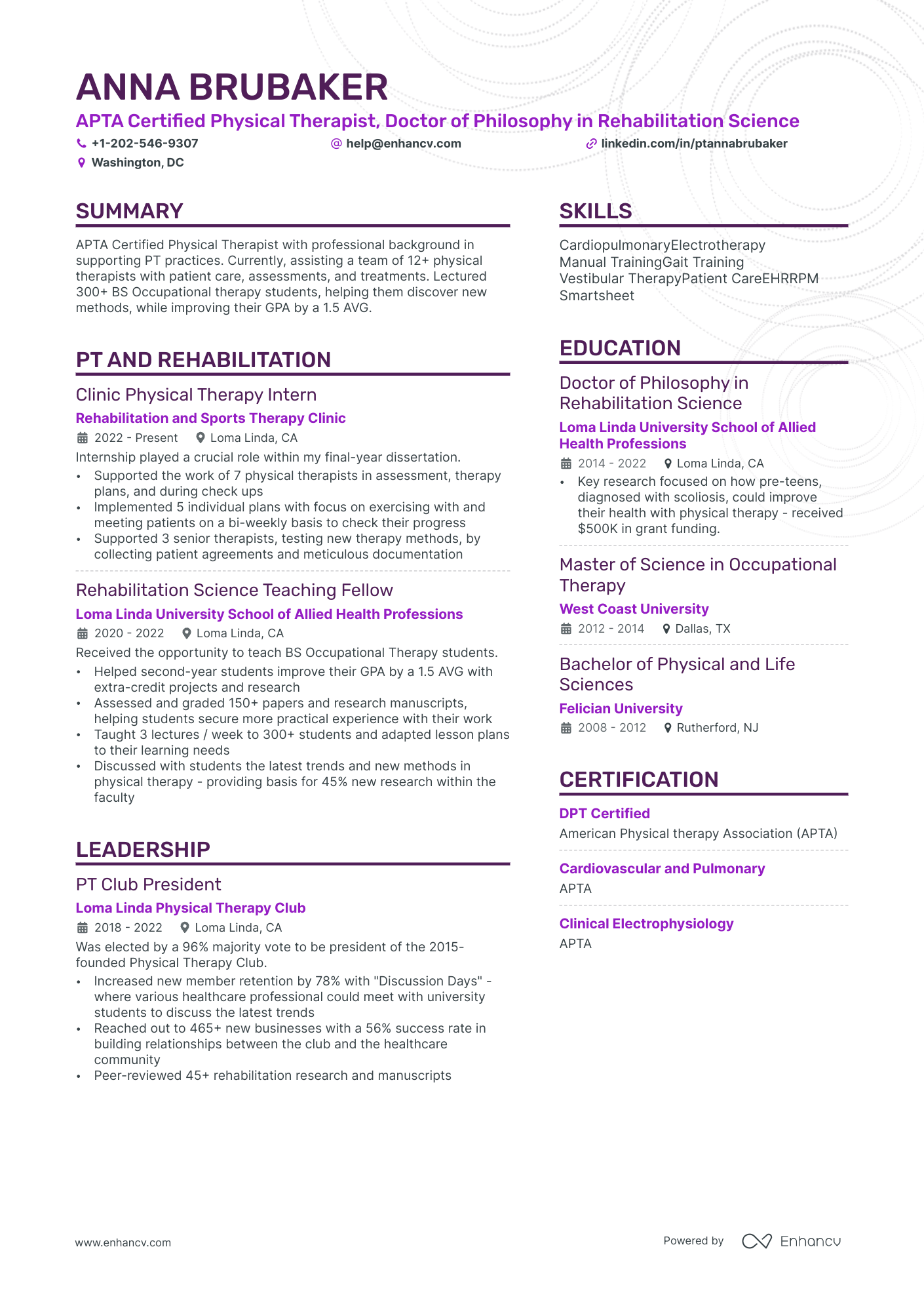
APTA Certified Physical Therapist, Doctor of Philosophy in Rehabilitation Science resume example
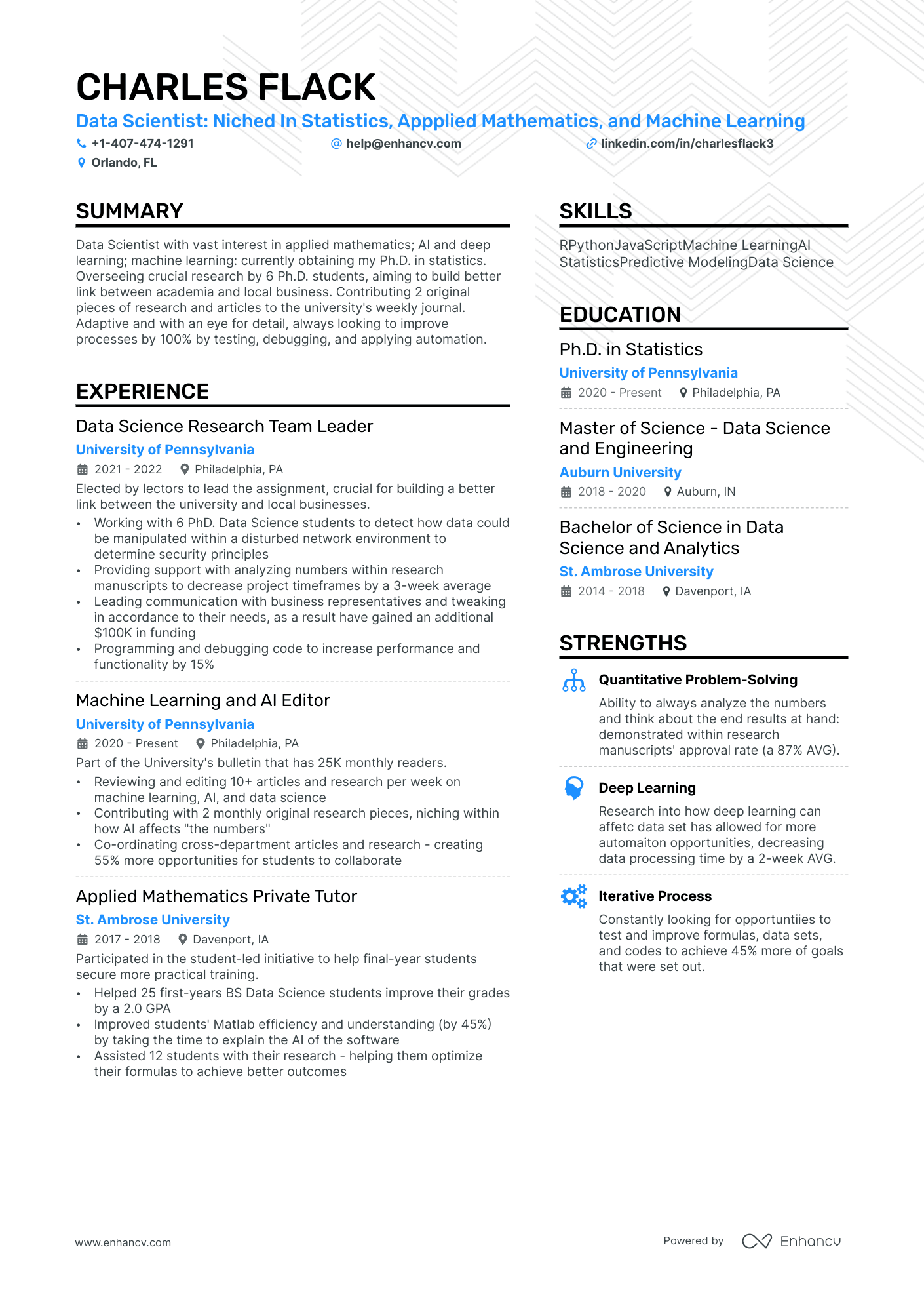
Data Scientist: Niched In Statistics, Appplied Mathematics, and Machine Learning resume example
Resume Guide
Guide Overview
Additional Resumes
Extra Reads
Writing Your Ph.D. Resume
Resume Header Tips
Ph.D. Resume Summary
Resume Experience Section
Systematizing Your Experience
How to Include Your Degree
Ph.D. in Progress on Resume
Skill Set for Ph.D. Resumes
Certifications on Resume
Additional Sections
Key Takeaways

George C. Jones's 8-year-Odyssey to his doctoral degree in engineering is finally complete. All he has to do now is complete his Ph.D. resume.
Little does George know that within the next three years, he'd apply to 500+ roles and still not be any closer to working in the renewable energy sector.
A little birdie told us why.
Everywhere George applied, he was labeled as an "egghead": book-smart with no real-world experience.
At least that's the story his resume told.
Unfortunately, George's sad "tale" depicts many graduates’ job searches.
By 2030/31, the US is expected to have 221,000 Ph.D. graduates . While this may be fantastic news for the academic community, the job pool is limited.
Swimming into the big blue sea - a.k.a. the "real world" - would require Ph.D. graduates to adapt their resumes to the business or industry requirements.
And listing vague bullets pinpointing your experience just won't do.
Enhancv knows how to translate your skills, knowledge, and achievements to ensure your resume stands out in the vast talent pool.
Because a well-written Ph.D. resume , showing skills, passion, and knowledge, is your ticket to the moon and beyond.
Our exclusive, Ph.D. resume guide will answer some of the following questions for you:
- What are some of the biggest, unintentional mistakes Ph.D. graduates tend to make when writing their resumes?
- Perfecting the top one-third of your resume: how to get recruiters' attention every time?
- 102 of the most popular Ph.D. skills you need to add to your resume right now!
- Lacking much professional experience: how to align your academic background with job expectations?
- Get inspired with more ideas about formatting, writing your resume summary, and including your academic body of work in a way that works.
4 additional Ph.D. resume samples and why they work
Ph.d. bioengineering graduate.
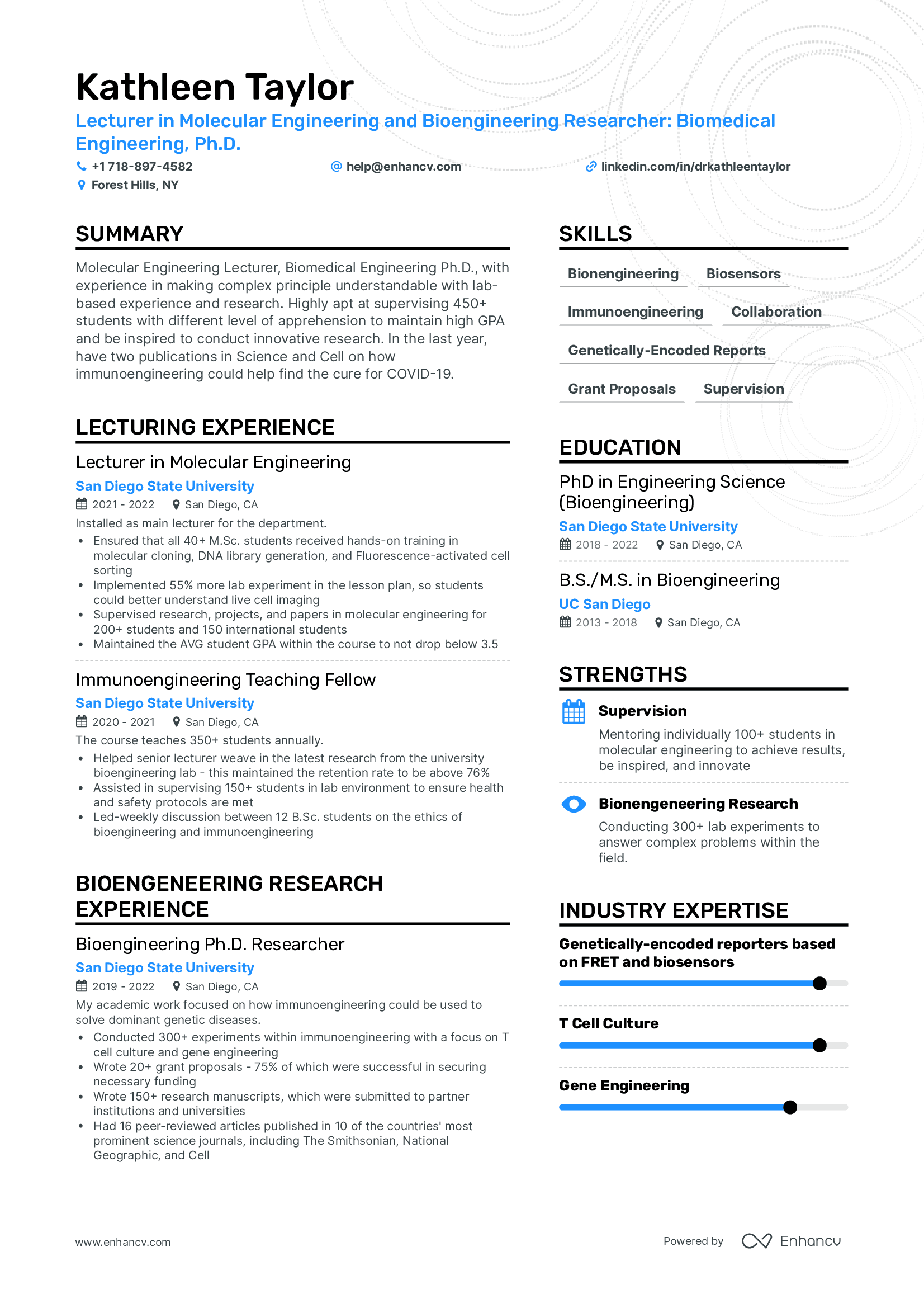
This Ph.D. Bioengineering Graduate has certainly focused her effort on getting that tenure-track position.
Here’s why her resume works.
Within the top one-third of Dr. Taylor’s resume (the headlines, summary, and skills section), you’ll find many relevant keywords for the job advert.
She has also used the summary to qualify and quantify her results to help recruiters better understand her strengths.
The experience section is split into two parts: the first one notes all relevant teaching experience; the second section showcases depth and knowledge of research.
Dr. Taylor has included industry experience and strengths to further define her skill set and show results.
This approach would also be very helpful for any Applicant Tracking System (ATS) reviewing the resume, as it cross-aligns the candidate’s talents with the job requirements.
Ph.D. mechanical engineering
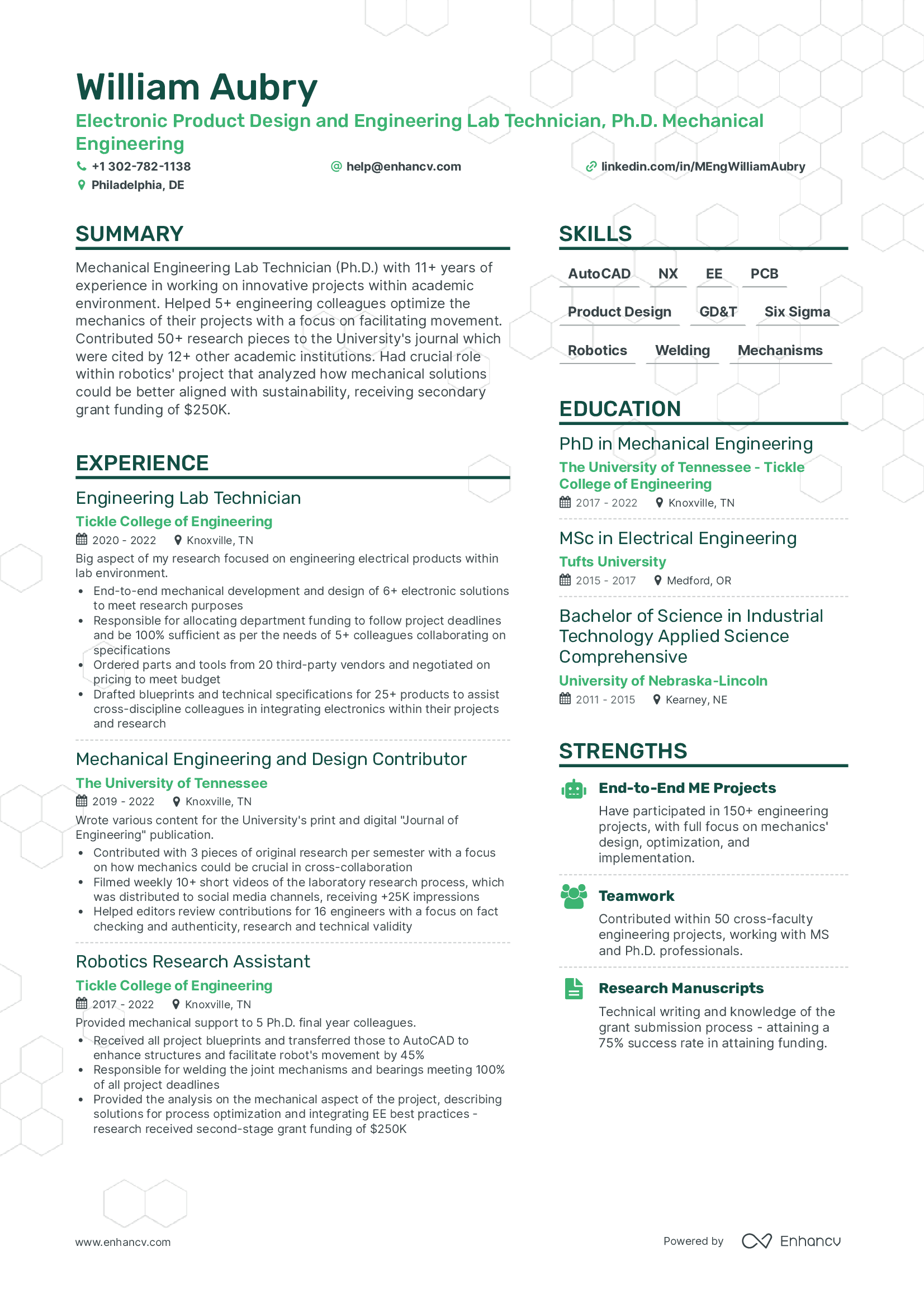
If you’re wondering how to translate your academics into real-life experience, check this example out.
Dr. Aubry’s resume headline highlights his area of expertise and his Ph.D. degree, while his summary qualifies his key academic achievements, contributions, and success.
Dr. Aubry’s skills section focuses more on the technology he is apt at within the specified job requirements.
His roles as a lab technician, contributor, and research assistant also hint to recruiters that he’s results-oriented and can show how his work affected the industry.
Finally, his strengths section cross-aligns soft skills that are important for the role, including mechanical engineering knowledge, cross-disciplinary teamwork, and technical writing.
Apta certified physical therapist
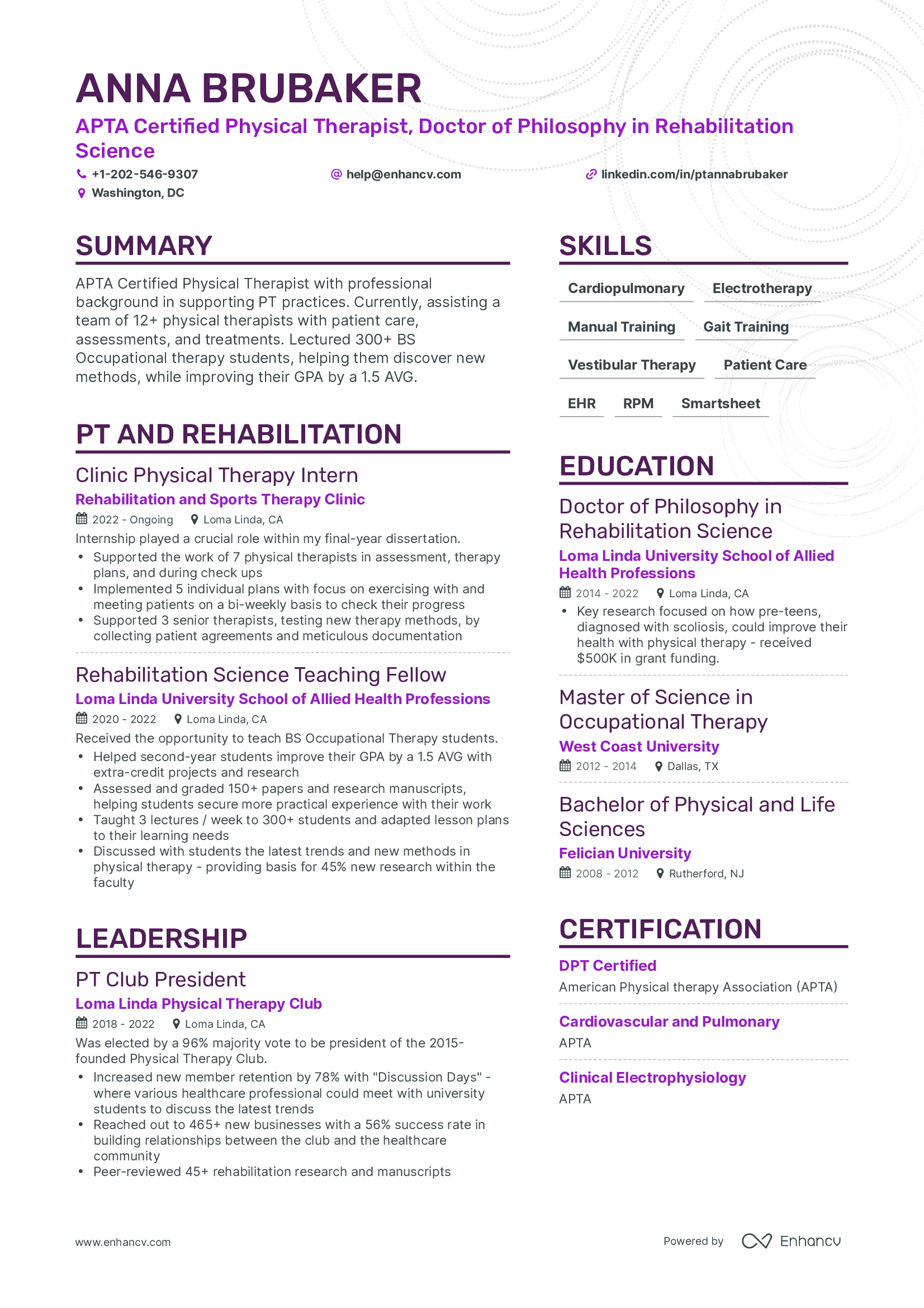
In some industries, a specific certification can be a real game changer to meeting ATS standards.
Dr. Brubaker knows this and that’s why she has used her resume to highlight her American Physical Therapy Association (APTA) certification within various sections (headline, summary, and certification).
Another reason why Dr. Brubaker’s resume works is that it pinpoints her niche of expertise with tangible results.
Her education section not only lists all of her degrees, but she has turned recruiters’ attention to the grant funding her Ph.D. thesis secured (an outcome of the project).
Did you notice how she curated the experience section? Dr. Brubaker started with her more job-oriented responsibilities, followed by a leadership role.
if you’ve participated in any extracurricular activities during your studies, they could indicate various soft skills on your resume, including leadership, initiative, organization, etc.
data scientist, ongoing Ph.D. in statistics
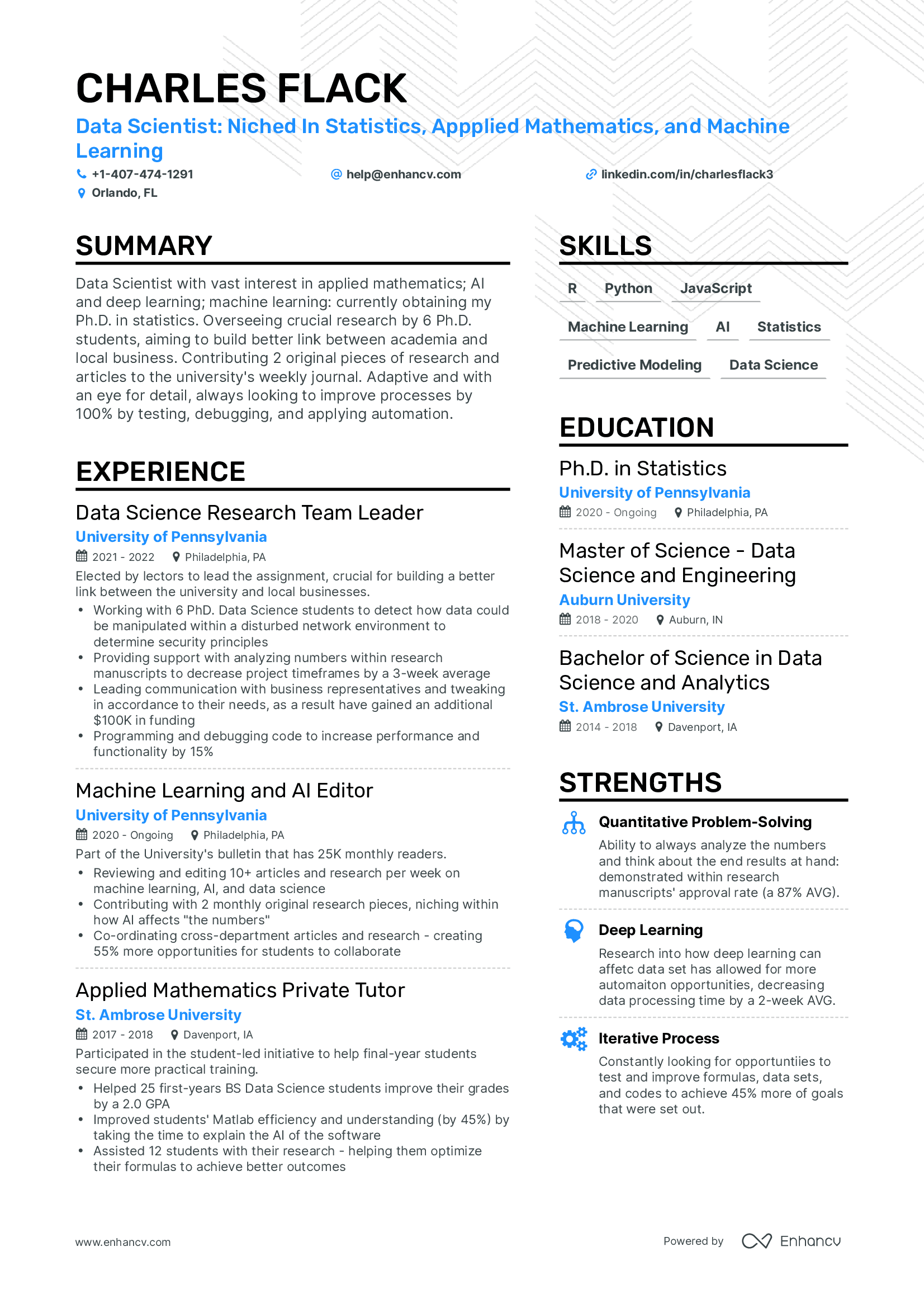
Are you a current Ph.D. student, wondering how to include your ongoing degree on your resume?
Charles Flack’s resume includes some of the best how-to practices.
Charles uses the resume headline and summary’s first section to specify his research niche, which is followed by his ongoing Ph.D. Status.
N.B. Remember that the recruitment process is one of building trust with honesty. If you note in your resume that you’re a Ph.D. graduate (without this being the reality), recruiters will find out.
Continuing with Charles’s resume summary. It goes on to include an array of expertise and soft skills (e.g. leadership, adaptiveness, perfectionism) all within achieved results in academia.
His experience section includes roles in leadership, technical writing, and private tutoring, denoting individual skills and contributions.
The strengths Charles has included are more specific and tie in with data science roles. Those include quantitative problem-solving, deep learning, and iterative process.
21 Ph.D. related resume examples to help you get inspired
- Entry-Level
- Grant Writer
- Lab Technician
- Research Associate
- Research Assistant
- Lab Assistant
- Lab Manager
- Finance Intern
- Data Science Intern
- Entry Level Engineering
- Entry-Level Mechanical Engineer
- Software Engineer Intern
- Nursing Student
- Data Analyst Entry Level
Quick steps to success in writing your Ph.D. resume to get recruiters’ attention
Let's start with a big no-no: your academic CV, the one you used to secure that tenure position, is a No-go. Put simply - it lacks personality .
HRs and the Applicant Tracking System (ATS) need more context to your experience.
Unfortunately, here comes one of the biggest disadvantages you may face, leaving academia. Often, Ph.D. graduates get rejected as they lack practical work experience .
Don't get discouraged. Instead, find a resume format that works for you.
For Ph.D. graduates that have less work experience, we recommend a functional-skill-based format . It will help you highlight your unique skill set and academic excellence.
Also, it'll align your niche area of expertise with the role expectations.
Now that we've settled the formatting debate, let's look at a couple of more quick pointers for your Ph.D. resume.
1. The top one-third of your resume - the resume header and summary - is crucial to getting a high score on the ATS.
That's why you should try to include as many of the advert's relevant requirements within this section.
2. Expand your qualifications and skills within the experience section.
Don't just list plain bullets, but focus on the outcomes of your studies, research, or publications.
How to write your experience bullets:
3. Speaking of impact, detail your accomplishments within your academic work.
Focus on the picture and your research's influence on the scientific field, business/ industry, or communities.
Bonus: Remember to always list all work and academic experience that is relevant to the job you’re applying for.
Your Ph.D. experience can open many doors for you, giving you a front-row seat on the cutting edge of new technologies.
But let's not get ahead of ourselves, here are a couple more bits and pieces to keep in mind when writing your Ph.D. resume.
What recruiters are looking out for in your Ph.D. resume:
- What methodology or technology have you used to prove your research?
- If you've ever led teams, were you able to manage them successfully?
- Would your niche area of expertise contribute to the organizational goals?
- Can you bring to the table more than just theoretical knowledge?
- How fast can you adapt to a non-academic environment and deliver tangible results?
Ph.D. resume's five most important sections:
- Resume header with keywords from the job description
- Resume summary cross-aligning requirements with experience
- Resume experience to expand on the summary
- Education section, listing all diplomas
- Professional achievements in research and publications
Your Ph.D. resume should balance your knowledge with how fast it can be applied in a real-world environment.
That's why you need to be precise about the resume sections you chose to prove your merit.
Mythbusters: Your PhD resume header under the Enhancv microscope
After endless hours of searching different platforms, you've finally found that cancer research position that perfectly matches your profile.
Avoiding all emotional attachment and excitement, you finally decide on the following header:
2 PhD resume header examples
Let’s look at the bright side of things. If the organization would like to get in touch with Dr. Garnett, they'd easily find his contact details .
But on the other hand, he is making one huge mistake: Dr. Garnett isn't taking advantage of the power of the top section of his resume. More specifically - his headline .
This crucial section could provide Ph.D. graduates with an opportunity to include all relevant keywords that could match their profile. And at the same time, tease their professional story.
This may be obvious, but this example works as it shows that Dr. Garnett is not only a Ph.D. graduate, but his specific area of research and interest, which should supposedly match with the role he’s applying for.
A rule of thumb for headers is to never be vague about your research and expertise.
You could list your Ph.D. degree within your resume title so that it’s the first thing recruiters (and the ATS) see.
In the case of Dr. Garnett, his resume title could read “Dr. David Garnett, Ph.D.”.
Our suggestion is to be wary about the organization you’re applying for because if the culture is more informal, this may come off as “pretentious”.
Ph.D. resume summaries: HRs’ favorite instrument for advanced career storytelling
The Ph.D. resume summary is a really useful section for good first impressions and explaining your experience.
The summary can be used to highlight your skills, strengths, and achievements. While telling the story of your professional growth.
We know how important real-world examples are for you.
So, without further ado, here's how Dr. Lucina Collard rewrote her resume summary. And in the end, got the attention of a prestigious software development company.
2 PhD resume summary examples
Dr. Collard may have spent too much time in the lab, as her Ph.D. resume summary just lists what courses she took and her thesis statement.
No results, no outcomes.
In the end, she did decide to include some soft skills and passions, but without actually pointing out the “why” behind her work. This doesn’t make sense at all.
Here’s what her modified resume summary looked like in the end:
This summary works for one simple reason: it qualifies the achievements.
Dr. Collard has noted that within the past 6 years, she has been specializing in the job advert keywords “robotics” and “mechatronics”. The award is also a nice touch to paint the big picture of her experience.
Dr. Collard is apt at achieving results within a dynamic environment. That includes various professionals from different backgrounds.
When talking about her thesis, she goes on to show her familiarity with the process.
Editing Dr. Collard’s summary may seem just like one small step for her, but it’s actually a giant leap to securing an interview.
Making your Ph.D. resume experience section stand out for all the right reasons
When listing their experience section, most Ph.D. graduates are probably making the same mistakes.
The first one: leaving out your academic practice, thinking that recruiters only want to see work experience.
That's not true at all.
Your education would not only prove your technical capabilities, but also your soft skills. But, more on that in the following paragraphs.
The second error: those tricky job titles.
You'd find 1000+ resumes, listing each experience using the given academic titles; e.g. Professor, Lecturer, Post Doctorate Student, Graduate Student, etc.
Robotic vs personalized approach: 1:0.
The ATS, reviewing your resume, is set to recognize keywords that are vital for the job. The faster those appear at the top of your experience, the better.
Instead of listing that you used to be a "Lecturer at XYZ University", go with "Data Science and Machine Learning Lecturer at XYZ University".
Third slip-up: those tricky experience bullets.
Some Ph.D. graduates just list all their courses, research, and publications.
This isn't the way to go.
You should rather align your knowledge with the job description to prove tangible results.
A couple of questions to help:
- What did this course help me learn and achieve that could be applicable to the job I'm applying for?
- How did leading lectures help me to cooperate better within the learning environment?
- What grants did my publications secure for the educational institute?
- What effects did my research have on the big-picture subjects within the field?
- The more you can get into the actuality (and practicality) of your education, the higher your chances are to get your first interview booked.
Let’s look at an example of how your experience can be showcased within your resume as crucial for the job.
Phd resume experience examples.
- • Got PhD in Philosophy
- • Took Philosophy of Mind, Brain, and Behavior Course
- • Took Ethics Course
- • Wrote Diploma on ‘To Be Or Not To Be: The Ethics of The Human Existence In The 21st Century’
This experience section is pretty negligent and robotic. Did you just get a diploma during those three-plus years?
You may be exiting from a leading higher education institution, but putting in the extra effort to your resume shows that you are diligent.
And that you’re actually invested in getting that particular job.
- • Contributed 60+ publications to the university scientific journal, niching within human rights, ethics, and the big why of human existence
- • Peer-reviewed publications for 12+ philosophy colleagues and professionals with a focus on consistency and validity of the thesis
- • Collaborated with 10+ professionals from arts, science, and biotech fields to question and understand the ethics behind their projects
- • Apart from the scientific paper for my final thesis, entitled 'To Be Or Not To Be: The Ethics of The Human Existence In The 21st Century’, published a short video on the university website to help inspire young professionals of philosophy to always stay alert
There’s no ground for comparison between the two examples. But let’s look at some of the basics.
The first experience bullet hints that the professional can write technical papers for their niche.
Next, the candidate showcases an eye for detail, collaboration, and teamwork.
Finally, they have found a way to get their thesis submitted on time and also make it more understandable.
On a side note - did you notice how a better job title could be a complete game-changer?
One bonus tip on better systematizing your Ph.D. experience
General practice is that you'd create one single resume experience section.
But what if while writing your Ph.D. resume, you realize that in the past six years, all your experience is for the same institution?
Here's an idea to spice up your experience section. You can create a couple of experience sections, based on functionality.
Thus highlighting job advert keywords and, at the same time, including more details.
So you could have some of the following headers, under which you could classify your work:
- Research Experience
- Technical Experience
- Analytical Experience
- Leadership Experience
- Mentorship Experience
- Teamwork Experience
- Higher Education Experience
Feel free to align your transferable skills, which would be beneficial for the job you're applying for.
How should you include your degrees within your Ph.D. resume education section?
Here's the advice you've probably been waiting for; introducing…
… "How to write about your degree without sounding like a snob?"
And there are two possible scenarios at play.
The first is that you're applying for a job related to your area of study.
You should list your Ph.D. degree in detail, including research topics, method expertise, and publications.
As you're writing for non-specialized audiences, don't go overboard with the complex terms. Instead, weave keywords from the job requirements within your education section.
In the second case scenario, you're applying for a job that has nothing to do with your degree.
Keep your education section plain and simple with your degree, university/college, dates, and location.
Either way, remember to always list all of your degrees in chronological order, starting with the latest.
This isn't just some made-up rule or HR caprice. Your resume education helps recruiters determine if:
- Your basic training and knowledge would fit the job
- You stayed focused on your coursework and graduated on time
- You would be a good fit for the team. Some companies tend to hire graduates from the same university
Ph.D. in progress: Should you include your potential degree on your resume?
Being transparent on your Ph.D. resume is what builds that fantastic initial relationship with the company you're applying for.
Thus, you have to be very clear and precise, especially in your education section.
If you're still pursuing your Ph.D. degree, shift the focus from the future to what you've achieved so far.
Your education section could answer any of the following questions:
- How applicable your degree is to the job opening?
- Which of the courses you've completed would help the company grow?
- Is your education a stepping stone within your professional experience?
- What is your expected graduation date?
Being on the course to completing your Ph.D. is definitely commendable, but sometimes life happens. And you may be forced to drop out of your Ph.D. education.
Should you then list the degree you didn't complete?
The answer is 100% yes, as your Ph.D.:
- fills gaps within your professional experience
- is valuable experience
- has helped you gain new knowledge
Making it clear to recruiters that your degree is "Incomplete" or that you "Didn't Graduate" is very important.
List your degree, dates, university/college, and status.
If you get to the interview stage, recruiters will ask you why you dropped out. Be prepared to talk about why it wasn't the best option for your career at the time, or hint at the circumstances.
Even if it's hard to believe, HR managers are people - just like you and me - and they are able to show understanding and compassion.
Ph.D. resume: Is there a dream skill set your potential employers would like to see?
Recruiters review your resume to see how your experience aligns with the role, with a big focus on transferrable skills.
Or in other words, what else can you bring to the table to help the business or institution grow?
And transferable skills can be both hard (or technical ) and soft skills .
Your hard skills include the technology you used to complete your studies.
Consider the opportunities you've has to:
- test and measure antennas parameters in an Anechoic chamber
- audit in a lab environment renewable energy sources' efficiency
- develop software, using Python, to patch cybersecurity risks
The list can go and on and on. Your Ph.D. has probably provided you with a pretty solid technical background.
When writing your resume’s separate technical skills section, ever wonder which technology should go first?
Rule of thumb: align the technology within the job description with your expertise.
The more proficient you are at a certain skill, the sooner you should list it.
Wondering what some of the most popular Ph.D. resume hard and technical skills are?
Check out our list, based on some of the most popular industries.
PhD resume technical skills for various roles:
15 hard skills for opportunities in business consulting:
- Knowledge of different business-crucial frameworks, including Benchmarking, Balanced Scorecard, Porter’s Five Forces, The GE-McKinsey Nine-Box Matrix, The BCG Growth-Share Matrix, Core Competencies
- Data Management and Analysis
- Advanced Data Modelling
- Strategy, Planning and Implementation
- Assessing and Managing Risk Using Frameworks
- Statistics and Understanding Correlations
- CRMs: Salesforce, Zendesk, Bitrix24, etc.
- Lead Generation Software: Zendesk Sell, Pipedrive, HubSpot, etc.
- Project Management Software: Jira, Hive, Asana, etc.
- Employer and Customer Satisfaction Surveys
- Proposal Writing
- Scheduling Software: Calendly, Google Calendar, Doodle, etc.
- Revenue Optimization and Sales
15 technical skills for biology, biotech, biochemistry, and medical research:
- Design, conduct, and analyze scientific research
- Tissue Culture
- PCR (Polymerase Chain Reaction)
- Gel Electrophoresis
- Western Blot
- Molecular (Gene) Cloning and various techniques
- Flow Cytometry
- Mass Spectrometry
- Confocal Microscopy
- Cell-Based Assays
- Radioimmunoassays
- Data Analysis in biotechnology, bioinformatics, and medical research
- Laboratory and Equipment
15 engineering technical skills to add to your PhD resume:
- Manufacturing: Forging, Welding, Assembling, etc.
- Quality Control
- Industrial /System Design and Analysis
- Conceptual, Logical, or Physical Data Modeling
- AI and/ or Machine Learning
- Design Tools: AutoCAD, SolidWork, 3dsMax, etc.
- Programming Languages: C++, Python, Java, etc.
- Equipment Diagnosis
- Project Management: Trello, Zoho, Microsoft Project, etc.
- Data Analysis Software: Microsoft Power BI, Tableau, Qlik Sense, etc.
- CNC Programming
- Advanced Physics
- Structural Analysis
- Nanotechnology
15 recommended computer science technologies:
- Programming languages: C++, PHP, Swift, etc.
- Software engineering and development: Atom, GitHub, Chrome DevTools. etc.
- Cloud Platforms
- Data migration and deployment
- Application Programming Interfaces (APIs)
- Integrated Environments Management
- Network Maintenance
- Cybersecurity
- Machine learning AI
- Business Intelligence and Statistical Analysis Tools
- SQL Consoles
- SAS Development and Forecasting
- Data Modelling Tools: ER/Studio, Archi, Ludichart, etc.
- Automation Tools
15 academic and research technical skills:
- Technical Literacy
- Presentation and visual: Tableau, Prezi, PPT, etc.
- Learning platforms: Moodle, Classroom, Teams, etc.
- Surveys: Google Forms, MailChimp, Kahoot, etc.
- Data-Processing Software: SPSS, RStudio, NVivo, etc.
- Academic Networks: Google Scholar, Academia.edu., ResearchGate, etc.
- Academic Research and Technical Writing
- Email Writing
- Data and Information Analysis
- Copyright and License
- Videoconferencing: Zoom, Teams, Google Meet, etc.
- Applications for Securing Grants and Funding
- Peer Reviews and Co-Writing Interdisciplinary Technical Papers
Moving on to your PhD resume soft skills
There's still no precise formula for how soft skills are gained and applied in the workplace.
How many times have you seen an advert that requires "a can-do attitude and teamwork"?
Yet soft skills are on all recruiters' must-have checklists.
In the case of Ph.D. applicants, these transferable skills are built thanks to all the healthy habits you've maintained through your education, including your:
- collaboration
- ability to meet deadlines
Soft skills hint to recruiters more about your character and style of work.
Here are some ideas as to which ones you can include within your resume:
37 PhD soft skills to spice up your resume:
- Critical / Logical Thinking
- Problem-Solving
- Time Management
- Brainstorming
- Creativity and Innovation
- Meeting Deadlines
- Working Under Pressure
- Negotiation
- Project Management
- Organization
- Prioritization
- Flexibility
- Independent Work
- Ethical Decision-Making
- Leadership or Mentorship
- Collaboration
- Teaching or Lecturing
- Conduct Meetings
- Supervision
- Feedback and Evaluation
- Motivating Others
- Communicating Ideas
- Presentation
- Constructive Debating
- Leading or Participating in Group Discussions
- Public Speaking
- Accelerated Learning
- Attention to Detail
- Writing Proficiency
- Quantitative Literacy
- Listening and Reflection
When describing your leadership or mentorship soft skills, here are a couple of questions you could answer within your resume to qualify your achievements:
- What actions did you take to maintain a constant and successful team dynamic?
Mix in extracurricular certificates
Back in the day, you earned a couple of extracurricular certificates and wondering if you should include those on your Ph.D. resume.
Again, it's a matter of analyzing how necessary your certification is for the job.
E.g. if AICPA's CPA certificate is listed as obligatory within the job description - and you have earned yours - you know what to do.
Certificates show that you're willing to put in the extra effort to stay relevant. Proving that you're committed, flexible, and a life-long learner.
So, think about the relevancy the certificate would have within your field.
Then, consider including some of these popular certificates:
Top 50 PhD certificates from various institutions for your resume:
- Association of Clinical Research Professionals (ACRP) - Certified Professional
- ACRP - Clinical Research Associate Certification
- ACRP - Clinical Research Coordinator Certification
- American Health Information Management Association - Coding Specialist Physician-Based Certification
- Nationally Registered Certified Patient Care Technician
- National Healthcare Association (NHA) - EKG Technician Certification
- NHA - Phlebotomy Technician Certification
- NHA - Clinical Medical Assistant Certification
- American Association of Medical Assistants - Medical Assistant Certification
- Red Cross - Nursing Assistant Certification
- Behavior Analyst Certification Board, Inc. - Registered Behavior Technician
- American Association of Professional Coders - Certified Professional Coder
- Pharmacy Technician Certification Board - Certified Pharmacy Technician
- Society for Clinical Data Management - Clinical Data Manager
- American Medical Writers Association - Medical Writer Certified
- Board of Editors in Life Science - Board-Certified Editor in Life Science
- International Society for Medical Publication Professionals - Certified Medical Publication Professional
- Regulatory Affairs Professional Society - Regulatory Affairs Certification
- Google Project Management Professional
- Society of Petroleum Engineers - Petroleum Engineering Certification
- American Institute of Chemists - National Certification Commission in Chemistry and Chemical Engineering Certification
- Coursera - Software Engineering MasterTrack Certificate
- Cisco Certified Network Professional in Service Provider Operations
- CompTIA Security+ Certification
- (ISC)² Certified Information Systems Security Professional
- American Society for Quality (ASQ) - Quality Engineer Certification
- ASQ - Reliability Engineer Certification
- Advanced Certificate Program in CFD-Aircraft Aerodynamics
- Engineer in Training License and Certification
- Society of Broadcast Engineers - Certified Audio Engineer
- Association of Technology, Management, and Applied Engineering - Certified Technical Professional
- International Council on Systems Engineering - Systems Engineering Professional Certification
- American Academy of Project Management - Certified Planning Engineer
- Heating, Ventilation, and Air Conditioning Master Specialist Certificate
- iNARTE Electromagnetic Compatibility Designer Engineer Certificate
- American Academy of Environmental Engineers and Scientists - Board Certified Environmental Engineer
- American Public Power Association - Key Accounts Certificate Program
- Global Association of Quality Management - Certified Agile Developer
- Environmental Protection Agency - Operator Certification Program Management
- Institute of Management Accountants - Certified Management Accountant
- National Association of Certified Public Bookkeepers - Certified Bookkeeper
- Association of International Certified Professional Accountants - Certified Public Accountant
- Chartered Financial Analyst Institute - Chartered Financial Analyst
- Internal Revenue Service - Enrolled Agent
- The Institute of Internal Auditors - Certified Internal Auditor
- Association of Certified Fraud Examiners - Certified Fraud Examiner
- National Association of Sales Professionals - Certified Professional Sales Person
- Institutes of Management Consulting - Certified Management Consultant
PhD resume: let’s get creative with a few more resume sections
When completing your Ph.D. resume, you should always find ways to stand out from the crowd.
That’s why we’ve compiled for you some of the most popular sections which you could add to your resume.
Before doing so, always question each section's relevance to the job you're applying for.
- Publications or Projects - focus on topic, methodology, and impact; include your grant ID code, if your research won any funding
- Academic Awards - once more, consider if those would shine a better light on your expertise
- Conference Presentations - this would showcase your public speaking abilities
- Language Skills - be honest when listing your language proficiency
One final word of warning - your Ph.D. resume offers limited space to showcase your expertise, so try to make the most out of it.
key takeaways
- The extra effort to align your Ph.D. skills with the job you're applying for always gets recruiters' attention.
- Include as many relevant keywords within the header and summary of your Ph.D. resume.
- Have separate sections, detailing how your academic background has helped you attain experience, skills, and certifications.
- List chronologically all degrees you've earned through your education, with an adaptable approach to details.
- Remember that the recruiters or the ATS assessing your resume may not be that scientifically literate. Substitute complex terminology with impact and results.

Looking to build your own PhD resume?

- Resume Examples
What does a president’s resume look like?
What is your leadership style - interview question (+ answers), how do you write a phone number on a resume, influencing the recruiter with a resume website, four steps to creating a personal development plan, why we love (and hate) personal resumes.
- Create Resume
- Terms of Service
- Privacy Policy
- Cookie Preferences
- Resume Templates
- AI Resume Builder
- Resume Summary Generator
- Resume Formats
- Resume Checker
- Resume Skills
- How to Write a Resume
- Modern Resume Templates
- Simple Resume Templates
- Cover Letter Builder
- Cover Letter Examples
- Cover Letter Templates
- Cover Letter Formats
- How to Write a Cover Letter
- Resume Guides
- Cover Letter Guides
- Job Interview Guides
- Job Interview Questions
- Career Resources
- Meet our customers
- Career resources
- English (UK)
- French (FR)
- German (DE)
- Spanish (ES)
- Swedish (SE)
© 2024 . All rights reserved.
Made with love by people who care.
How to transition from PhD to consulting?

Going from PhD to consulting can feel intimidating. It's hard to know which consulting firms recruit PhDs, and at which level. And it can also sometimes feel unclear if you'll be using your PhD skills at all or completely starting from scratch.
So let's walk through how you should manage your transition from PhD to consulting step by step. From which firms to target to how much you will be paid and how to ace your applications and interviews.
Click here to get expert help on your resume from a consultant recruiter
Which companies recruit phds and at which level.
Consulting firms help clients solve some of the most difficult problems they face in their business. As a consequence, firms like McKinsey, BCG and Bain have always been competing with each other to recruit the smartest talent possible. Historically, top consulting firms were mainly hiring MBAs but that has changed over the past few decades and they now also target undergraduate and PhD students.
However, not all firms recruit PhDs at the same level. Some firms like Bain or Oliver Wyman recruit PhDs at their undergraduate entry level which they respectively call Associate Consultant and Consultant. This recruiting approach can feel a little bit frustrating as a PhD given you've spent much more time studying and also usually have more work experience than a typical undergraduate.
But the good news is that some firms have started to recognise this issue and to hire PhDs at the level just above the entry level one. This most notably includes McKinsey and BCG which respectively hire PhDs at Junior Associate and Senior Associate levels. As you can see in the graph below, these are equivalent levels despite the fact that the two firms call them differently.

As you've probably understood by now, McKinsey and BCG are great firms to target as a PhD because you will get in a at higher level than other firms which has got a few advantages:
- First, you'll receive a higher base salary from the start. ~$95k instead of the typical ~$80k for undergraduate entry level.
- Second, you'll be further along in your career and be given more responsibility from day one.
If you want to target these two firms, we would recommend taking a look at the recruiting events they regularly organise for PhDs: the McKinsey Insight Programme and the Bridge to BCG Programme . Both are one to two day workshops during which you get a chance to network with people from McKinsey / BCG , participate in realistic case experiences and get a better feel for whether you'd enjoy being a consultant. We would definitely encourage you to apply if you can.
In addition, if you have done a PhD in life sciences, we would also encourage you to take a look at consulting firms which have a strong focus on healthcare and pharma. This includes LEK , ClearView , Navigant and ZS Associates among others. These are smaller firms than McKinsey or BCG in terms of size but they have a strong culture of hiring PhDs and could be a good addition to your list.
Finally, McKinsey, BCG and the other consulting firms we have mentioned above take part to the PhD to consulting conference every year in the UK. We would recommend attending if you are based in London.
Why should you become a management consultant?
Consulting is intense and your interviewers will want to make sure you have carefully thought about why you want to become a management consultant . In our experience here are the top 3 aspects of management consulting that are most relevant to PhD students.
First, management consulting is not completely unlike doing research. A big part of a management consultant's job is to solve client problems. Going to work for firms like McKinsey or BCG will therefore give you the opportunity to continue using the skills you have developped while doing your PhD: from gathering data, to breaking down problems into manageable pieces and to articulating your ideas in a structured way. Here are a few case examples if you want a more precise idea of the type of projects consultants work on.
Second, one of the differences between management consulting and academia is the pace at which things go. You typically go less deep in the problems you solve in management consulting. But you are asked to solve them much faster. There's an emphasis on speed over depth. The bright side of this is that you will typically see the results of your work much faster as a consultant. On some projects you could even see your recommendations being implemented and have a direct impact on revenues / profits while you are still working at the client site.
Third, if you've decided academia isn't for you and are attracted to the business world, consulting can be a great stepping stone. McKinsey, BCG and Bain are sometimes referred to as " CEO factories " because a lot of their alumnus go on to manage Fortune 500 companies. For instance, both Sheryl Sandberg (Facebook COO) and Sundar Pichai (Google CEO) are former McKinsey consultants. Not all consultants go on to do great things but some do!
Having a clear idea of why you want to be a consultant is important because it's a demanding job which often involves long hours and a lot of travel.
How to land and ace consulting interviews?
Now that you know what firms to target, let's talk about the consulting application process. For most firms it looks something like this:
- Resume and cover letter
- Maths and logic test
- 1st round interviews
- 2nd round interviews
Each round of interview typically includes 2 to 5 interviews where you will be asked a mix of case questions and fit questions .
The first hurdle you will need to overcome is writing a great PhD consulting resume (template available here) . Our four main tips to achieve this as a PhD student are as follows:
- First, you should use a consulting specific structure for your documents: "Education", "Work experience", "Extra-curricular achievements" and "Additional skills". There's no need for specific sections on your publications or the conferences you attended.
- Second, you should write result-oriented bullet points. This means all your bullet points should start with action verbs (e.g. lead, analyse, etc.) and quantify the impact you've had as much as possible (e.g. lead a collaboration between 4 researchers which resulted in 3 publications)
- Third, you should work hard to simplify the topic of your research. The person reviewing your resume won't know more about your field than the average Financial Times reader. You need to dumb it down for them. They don't need to understand what you did in detail. Conveying a high level idea of your field is often enough.
- Finally, some recruiters have small prejudice against PhD students. They think they are good problem solvers but lack soft skills. In your resume, you should therefore make every effort to show off your soft skills. Two easy ways to do this are to talk about the different collaborations you've worked on, and the different presentations you've made at conferences.
Once your resume and cover letter have been accepted you will need to start preparing for case interviews . This type of interviews lasts about 30 minutes during which you will analyse and solve a business problem. These cases are usually inspired from past consulting projects your interviewer will have worked on.
For example, your interviewer could ask you: "Your client is Coca-Cola, and their profits have been declining in recent years. Can you help find the root-cause of the profit decline and turn the situation around?"
We've helped more than 20,000 students prepare for consulting interviews in the past and in our experience the following four-step approach makes for a great preparation.
- First, you should aim to develop fast and reliable maths skills . All case interviews involve some maths but PhD students in sciences often underestimate that part because they are used to doing more complex maths in their research. But doing simple additions, subtractions, divisions and multiplications QUICKLY and ACCURATELY is a completely different skillset to solving complex integrals (as an example). It requires some practice!
- Second, the real secret to case interviews is CONSISTENCY. You will have 5 to 10 interviews before getting an offer. In order to succeed you therefore need to consistently crack cases. In our experience, the best way to achieve this is to always use the same step by step method. We've developed our own method which you can learn about in our case interview programmes. Or you can also develop your own.
- Third, you should practice as many case interviews as possible. Practicing with peers and playing the role of the interviewer / candidate in turns is extremely helpful. But in addition, we would also recommend practicing by yourself as this gives you more time to think about the questions and about the perfect answer you can give. In addition, some candidates also use a consulting interview coach to fine-tune their preparation.
- Finally, you should not forget to spend some of your preparation time on fit and PEI questions . These are questions such as " Why McKinsey? " or "Tell me about a time you lead a team through a difficult situation?" These are often overlooked by candidates but carry an important weight in interviewers' final decision.
Consulting can be a great stepping stone for PhD students who aren't willing to go into academia and would like to enter the business world. McKinsey and BCG are particularly active in the PhD recruiting space. And so are other smaller firms with a strong presence in healthcare and life sciences such as Navigant, Clearview or ZS Associates. Getting an offer in consulting can be a bit challenging but if you follow our guidance on resumes, cover letters and case interviews your chances are actually quite high.
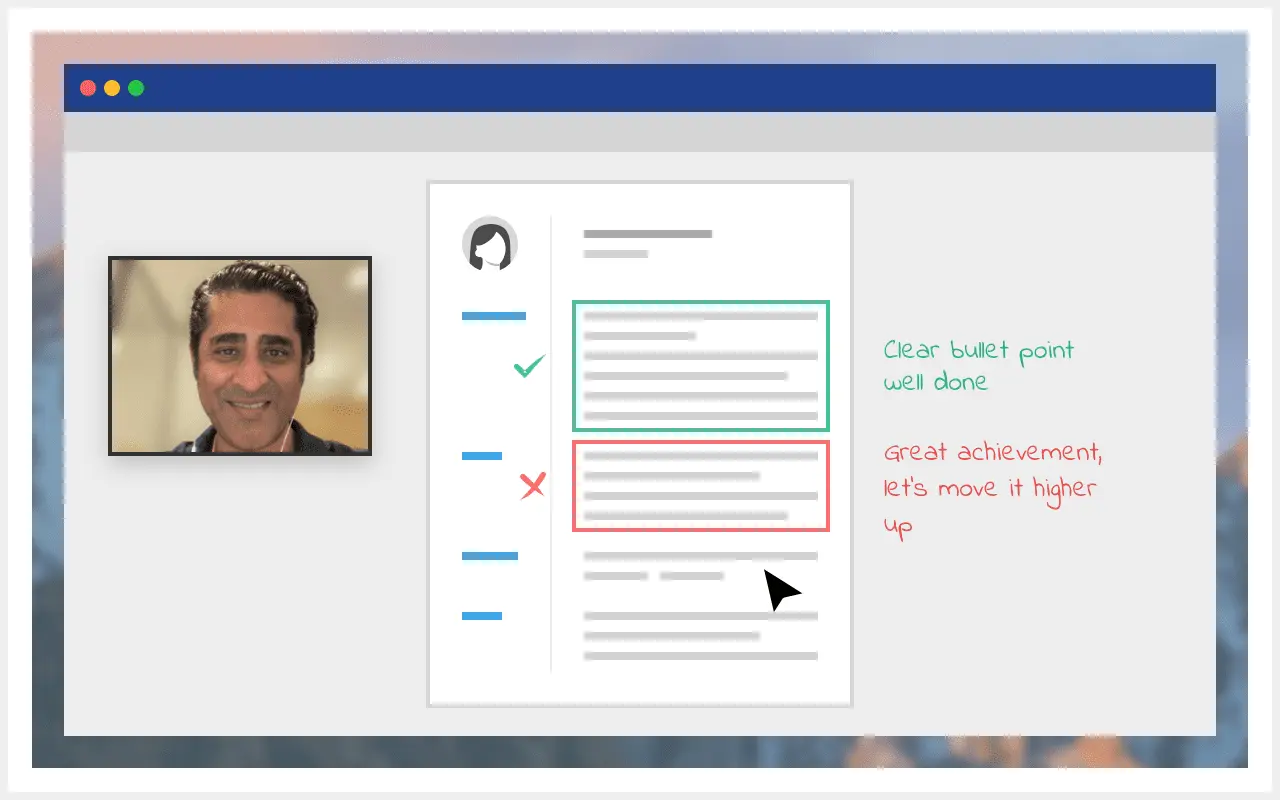
Career in Consulting

Consulting Resume: 11 steps to get interviews (2024)
How to write a consulting resume that passes the screening phase?
Top-tier consulting firms receive thousands of applications per year.
And only 30% of those applications pass the screening phase.
The other 70%?
They go to the rejection pile.
And weeks of intense preparation and years of effort are wasted.
So, here is my promise:
If you read this guide, this won’t be you!
In this in-depth guide, you’ll learn:
- What matters for consulting firms
- How to stand out (Hint: by writing EPIC bullet points)
- Which mistakes lead to rejection (and how to avoid them)
And here is the best part:
This article also includes the following:
- A simple step-by-step guide to writing a perfect management consulting resume
- Consulting resume templates you can download
- Three consulting resume examples that work in 2023
- A checklist to assess the readiness of your document
So if you want to apply to top-tier consulting firms, this guide is for you.
Let’s dive right in!
Table of Contents
Get the latest data about salaries in consulting, the screening criteria: what recruiters want.
There are many ways to answer this question.
For instance, recruiters want to know if you won’t make them lose their time.
In other words:
They don’t like to invite you for an interview and see that you can not a good fit.
And from that perspective, recruiters are very risk-averse.
If they have any doubt that you are not a good fit, they’ll reject your application.
An example?
Does your resume have a typo?
If yes 👉 rejected.
(maybe you’ll make typos while making a presentation to a client.)
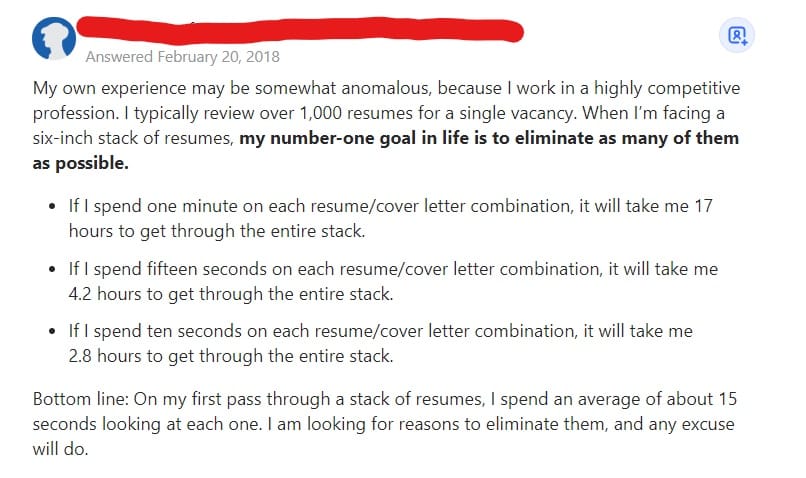
Another way to answer this question is:
Recruiters want to know if you can become a management consultant.
They want to know if you possess the characteristics of a successful consultant.
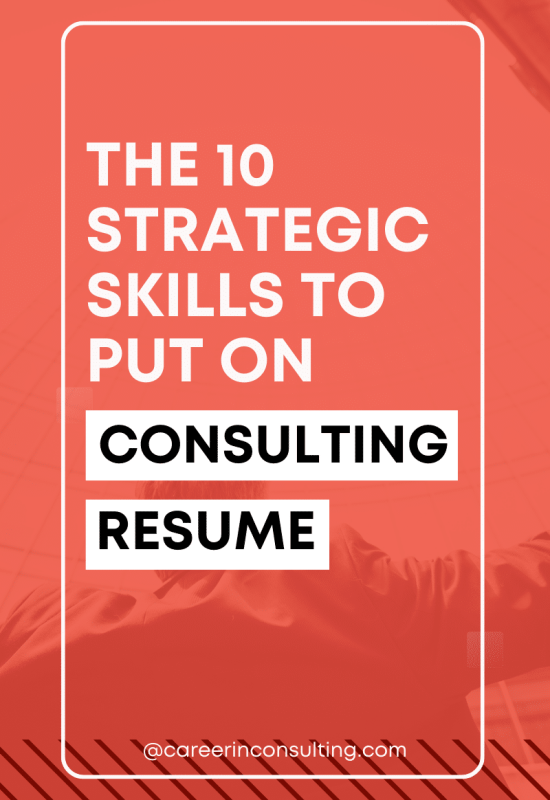
Those characteristics and skills for your consulting resume are:
Academic excellence
Problem solving.
- Analytical and quantitative skills
Capacity to influence
Communication skills.
- Results Orientation
- Clients Orientation.
The exact terminology can change depending on the firm.
But, all strategy consulting firms look for the same characteristics.
And if you want to become a management consultant, you must have those characteristics.
Now, let’s define the consulting resume skills sought by consultancies:
Recruiters will assess the following:
- The reputation of your college
- The awards you earned. For instance, being on the Dean’s list
- Your scores on standardized tests like GMAT.
Recruiters will assess your capacity to address complex challenges, develop practical solutions, and navigate ambiguity.
Problem-solving requires logical reasoning and the ability to use both quantitative and qualitative analysis to reach solutions.
Recruiters will assess your capacity to work effectively with others to achieve a common goal, respect diverse perspectives, collaborate productively, and contribute positively to the team dynamic.
- Your working environment: have you worked in intense work environments like consulting, investment banking, or a startup/scaleup environment?
- The progression of your career (have you been promoted faster than your peers?)
- Your involvement in activities outside of school or work
- Whether you had/have leadership roles at work, in clubs, or organizations
- Exposure to working with people
- Experience in working with different stakeholders/functions (which is a big part of the day-to-day job of a management consultant).
Recruiters will assess your experience in making others act upon your recommendations.
That’s what McKinsey calls personal impact.
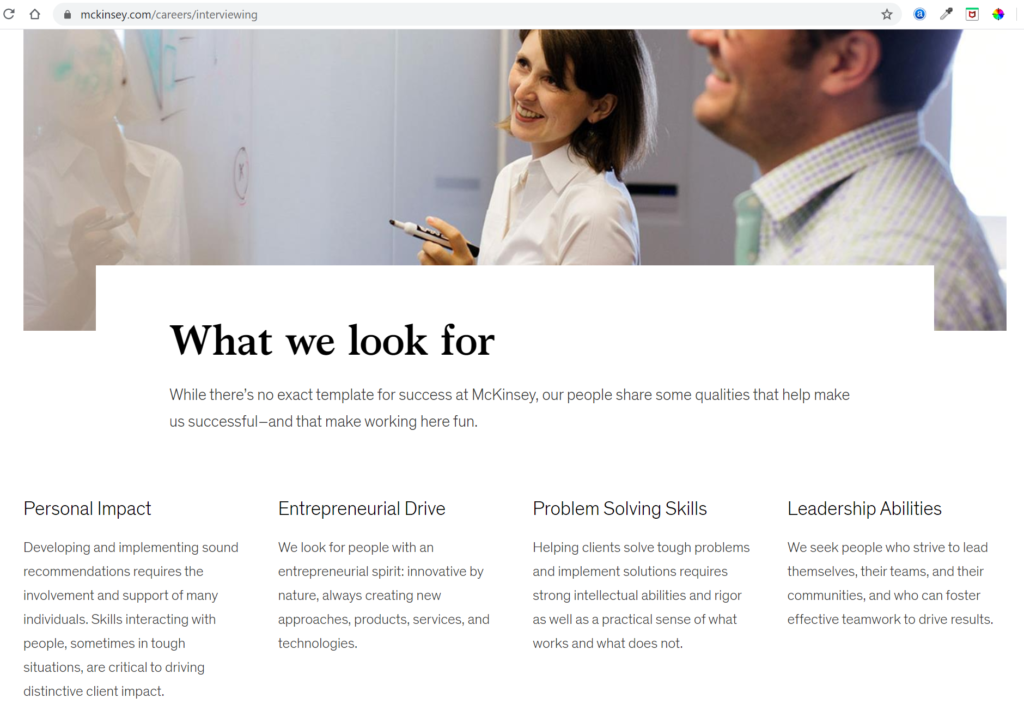
Management consultants are change agents.
Thus, consulting firms want to assess if you can be a change agent too .
Recruiters will assess your capability to convey information clearly and effectively through both written and verbal means.
In consulting, this includes the ability to present complex ideas in a straightforward manner and effectively engage with clients and team members.
Quantitative and analytical skills
- The major of your degree (math, physics, finance, etc.)
- Your work experience: does it involve heavy quantitative work? (for example, banking, finance, consulting, marketing, private equity, etc.)
- If you have experience in quantitative work (modeling, data analysis, etc.)
Results orientation
Recruiters will assess your experience in making quantifiable contributions.
That’s what Bain & Company calls Results delivery.
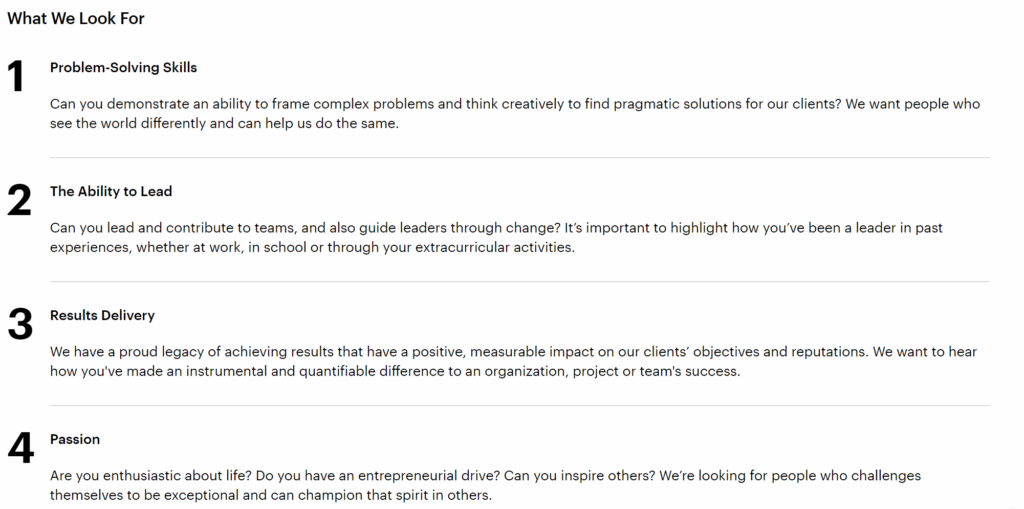
Clients orientation
Recruiters will assess your capacity to understand and meet clients’ needs, including building strong relationships, adapting solutions to client contexts, and ensuring client satisfaction.
This skill is critical in consulting due to the client-centered nature of the work.
Must you have all these characteristics?
Short answer: no.
If you have all the above characteristics, it helps.
But you don’t have to.
If one (or two) of these characteristics is average, consulting firms can still invite you for interviews.
Related articles :
Your answer to the question Tell me about yourself must be consistent with the information on your resume.
Check this article explaining how to craft a superior answer to the question “ Tell me about yourself .”
Also, read this article to learn more about the recruiting process at McKinsey.
Besides, I’ve written articles about the recruiting process at Boston Consulting Group and Bain & Company .
The 6 sections in a consulting resume
First, let’s start with the mandatory sections all resumes must have.
All consulting resumes should include the following four mandatory sections:
- Work experience
- Other information
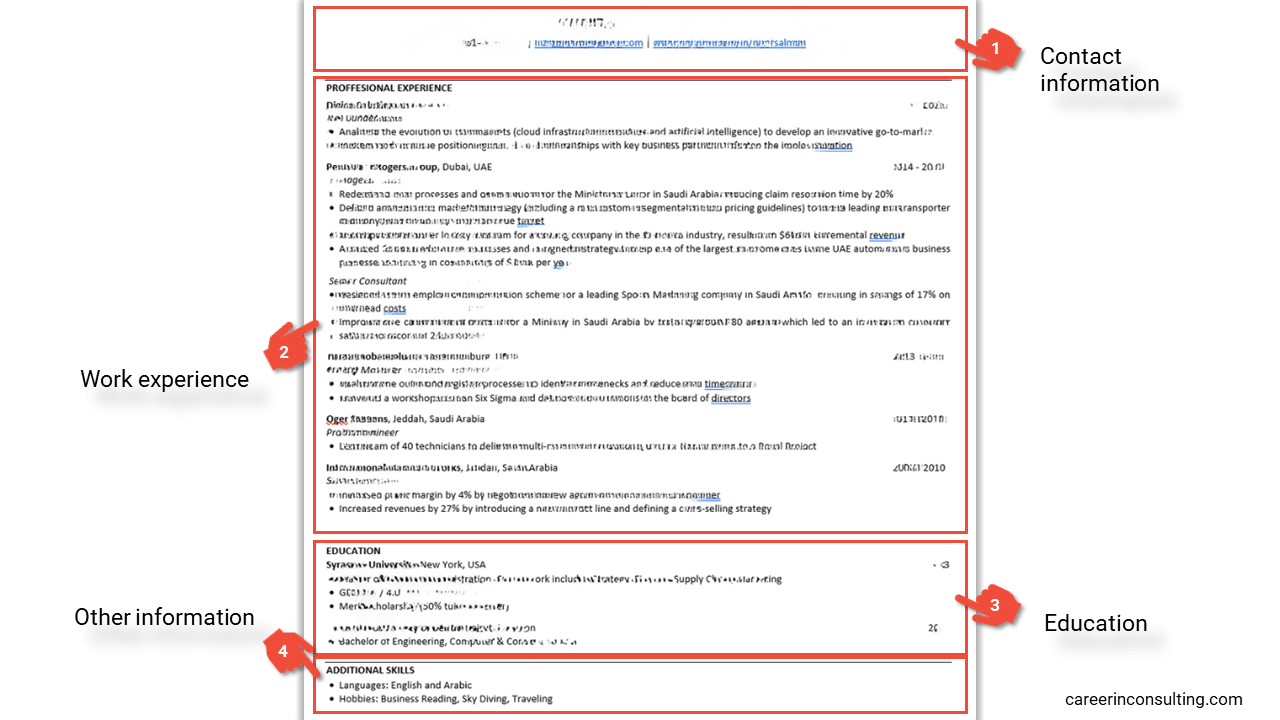
These sections provide consulting firms with an overview of your achievements and academic background.
Each part is essential and influences your chances of being considered for an interview.
Contact section (mandatory)
The contact section should be at the top of your consulting resume.
It should include the following information:
- Email address
- Phone number.
Important: make it easy for the recruiters to know how to contact you!
Also, you can include a link to your LinkedIn profile.
However, I don’t recommend including your home address (unless asked by the office you’re applying to).
Education section (mandatory)
- Names of colleges or universities you attended
- Degrees you completed
- Honors you earned
- Starting and ending dates.

Work Experience section (mandatory)
The Professional Experience section should include your previous positions (in an anti-chronological order).
Also, you’ll add your main achievements in each of these positions.
Things to include in your management consulting resume:
- Employer’s name
- Position / Title
- Date and location
- Achievements
Things to exclude (unless requested by the firm you applied to):
- Summer jobs such as waiter, etc. (it’s irrelevant)
- Jargon (to avoid at all costs)
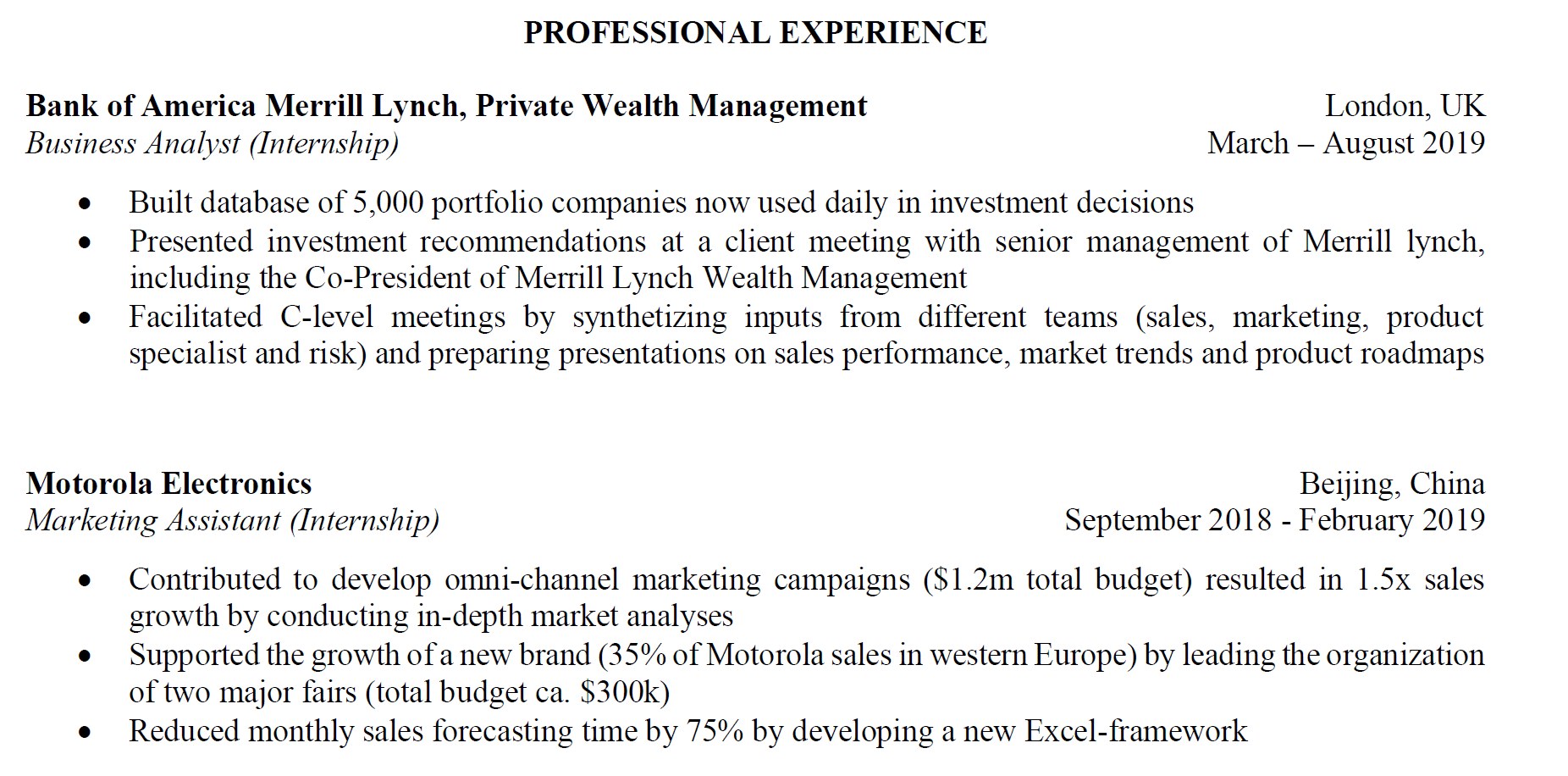
Other information section (mandatory)
This section may include the languages you speak.
Do you speak more than one language?
The more languages you speak, the better your chances.
Besides, you want to mention your hobbies.
While you don’t want to include a long list of hobbies, consulting firms want to get to know you personally.
They want to see what you do outside of work.
But let’s be blunt:
Even the most impressive hobbies are not deal-makers.
You might have climbed the Everest.
Yet, you’ll never be invited for an interview if your academic and professional achievements are below their expectations.

Your resume can also stand out from the competition by including optional sections like your profile summary and leadership experiences.
Career summary section (optional)
This section should condense your resume into three or four sentences.
The purpose?
Entice the readers to continue reading the other sections.
Note: the step-by-step guide below includes a framework for writing captivating profile summaries.
Leadership skills section (optional)
Have you had a leadership experience in an association?
Or have you been the president of a club while at college?
Then, mention it in this section.
You must turn these experiences into achievements.
How to organize your consulting resume sections
Now, in which order should you organize all these sections?
You have two options.
And you should choose one option or the other based on your situation.
Option 1: if you are still a student.
In this situation, the order of the different sections must be as follows:
- Contact information
- Career summary (optional)
- Leadership experience (optional)
- Other information.
Option 2: if you are not a student.
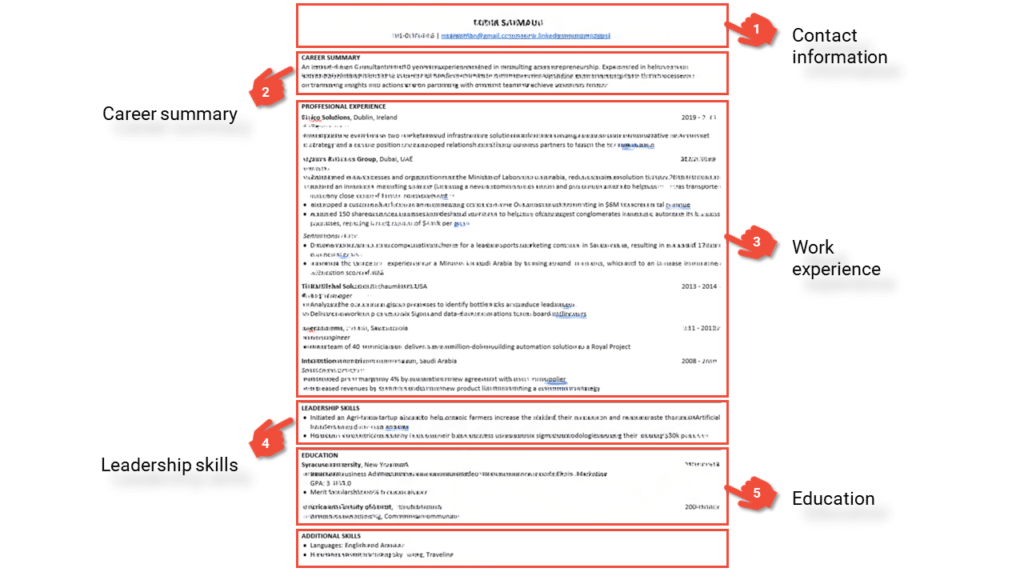
How to write a consulting resume: your step-by-step guide
Let’s talk about your management resume guide to get multiple offers.
Here are the 11 essential steps to writing a strategy consulting resume:
Step 1: Choose a suitable template
First and foremost, you must choose the format of your resume.
There are two types of resume formats: chronological and functional.
A chronological resume shows your work history in reverse chronological (the most recent first).
On the other hand, a functional resume (also called a skills-based resume) highlights skills and qualities.
For consulting applications, the classic prevails.
Therefore, you must have a traditional chronological resume.
And the style must be classic too.
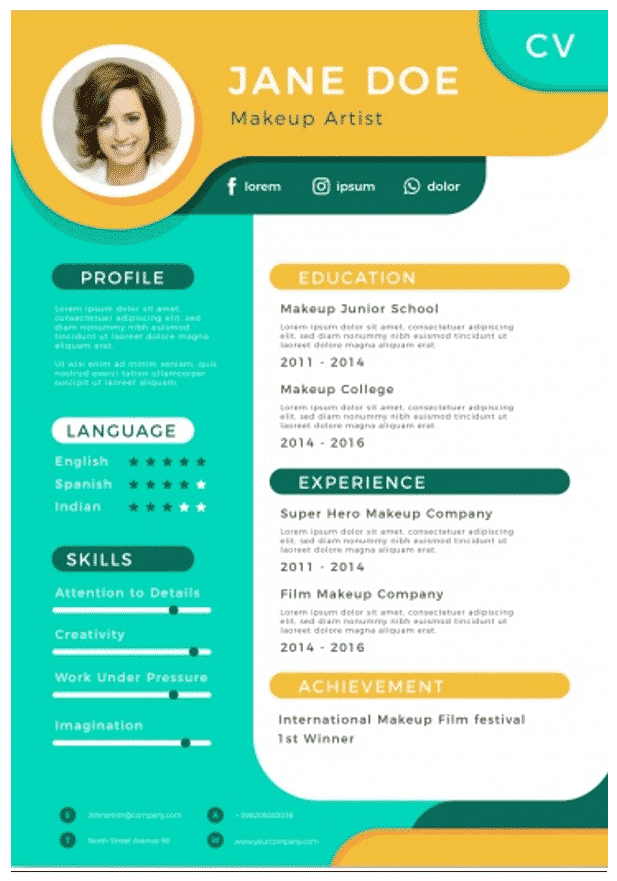
Don’t be creative!
You want to stand out with substance rather than with style!
Step 2: Add your contact information
In this section, you should include your personal details.
- Contact information: email and phone number
- Date of birth
- Postal address
Note: your email address should look professional.

Step 3: Update the Education section
You are competing with some candidates having exceptional academic credentials.
Here is a list of 7 ways to stand out in the EDUCATION section of your consulting resume:
- Ranking of your school: was your school ranked as a top university? The ranking is important, mainly if you apply abroad.
- Curriculum: have you focused on quantitative topics such as Math, Physics, Economics, Finance, Marketing, etc.?
- GPA: have you done better than other students? Have you graduated at the top of your class? If yes, which percentile?
- Standardized tests (i.e., GMAT, GRE, LSAT): have you performed well in a standardized test?
- Scholarship: Have you received a scholarship? How much? What % of the total fees? What % of your class received a scholarship?
- Awards: Have you received an award or a price such as being on the Dean’s list? Have you received any distinction?
- Leadership: Have you contributed positively to other students’ lives? Have you taken any initiative for the greater good? Have other students elected you to run a club or an association?
Besides, you can watch the video below , an extract of a workshop I gave at a University.
Step 4: List all your work experiences and achievements
Your business consulting resume must show how you moved the needle.
And to do so, there are two things you need to do:
- List all the situations where you had an impact
- Prioritize the situations that will appear on your resume
Let’s start with the first step:
Brainstorm: list all the situations where you had an impact
Start by listing all the situations – from your work experience, from school or from your extra-curricular activities – where you had an impact .
In other words, think where you moved the needle, or where you have been remarkable, or where people noticed your accomplishments, etc.
At this stage, you are in brainstorming mode, so:
- List everything out as it comes to you, and the filtering will come next; do not apply any judgment or filtering during this process
- Outline statements in the form of notes; you will refine them and turn them into powerful achievements later
You can use the following questions to help you list the accomplishments that may end up in your resume.
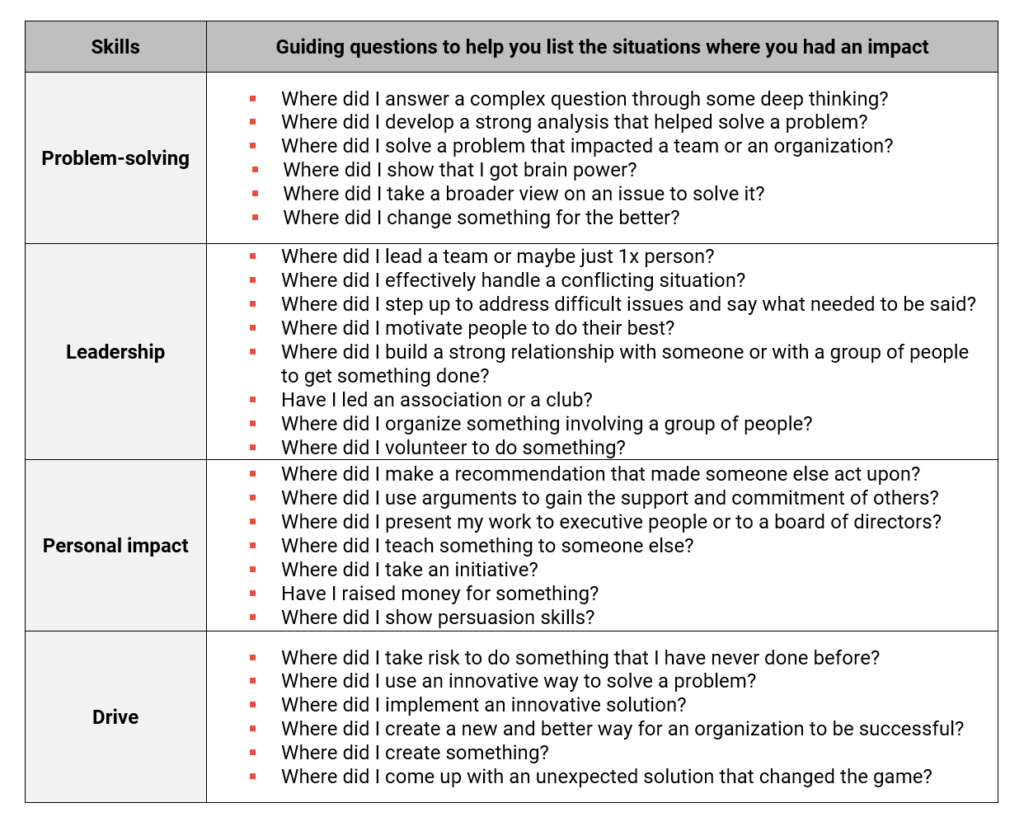
This is not an easy exercise.
Hence, do this exercise several times.
For instance, after doing it once, update your list of achievements the next day after a good night of sleep.
Then, rinse and repeat between 3 and 5 times.
Prioritize: select your most impressive achievements
Now you have a list of situations where you had an impact.
But you can’t put them all in your management consulting resume .
Thus, you must select some of them that will become the achievements in your CV.
So, how much should you select?
I recommend using this simple rule (based on the less is more principle):
- Select a maximum of four achievements per position for the most recent job positions (less than five years)
- Two achievements per position are enough for the oldest job positions
Get 4 Complete Case Interview Courses For Free

You need 4 skills to be successful in all case interviews: Case Structuring, Case Leadership, Case Analytics, and Communication. Join this free training and learn how to ace ANY case questions.
Step 5: Write EPIC bullet points
Now that you have a prioritized list of situations where you had an impact, it’s time to translate them into compelling business stories .
These stories must tell:
- Which problems you had to solved
- How you solved those problems
- Which impacts resulted from your actions
You want to show the readers how GREAT you are and the HUGE opportunity they would miss by NOT inviting you.
To do so, use the PAR framework (this is one of my favorite hacks) to tell the readers the IMPACT you had:
– [P] Problem : what PROBLEM did you have to solve?
– [A] Action : what ACTION did you take to resolve the problem?
– [R] Results : what was the RESULT of your action?
Not only will the PAR framework help you craft a great resume, but also it will help you prepare for your job interviews .
The problem you solved
Describe the problem you had to solve: what was the problem?
The secret to describing a problem is to think of the problem from the point of view of your company :
Why was this problem important to solve for your employer? What would have happened if you had not resolved the problem?
In addition to these questions, ask yourself:
- How big was this problem : which metric was impacted? By how much?
- What was the scale of the problem : how many product lines / geographies / teams / etc. have been impacted? How many people / teams were involved in the problem resolution process?
- Which were the challenges you faced : did you have to resolve this problem within a tight timeframe? With limited resources?
Your actions to solve the problem
Tell what you did and the skill that enabled you to solve the problem.
The key here is to be specific : even if you have used several skills to solve the problem (and you probably did), focus only on one skill.
To help you write the actions you did, you can use this list of consulting resume keywords.
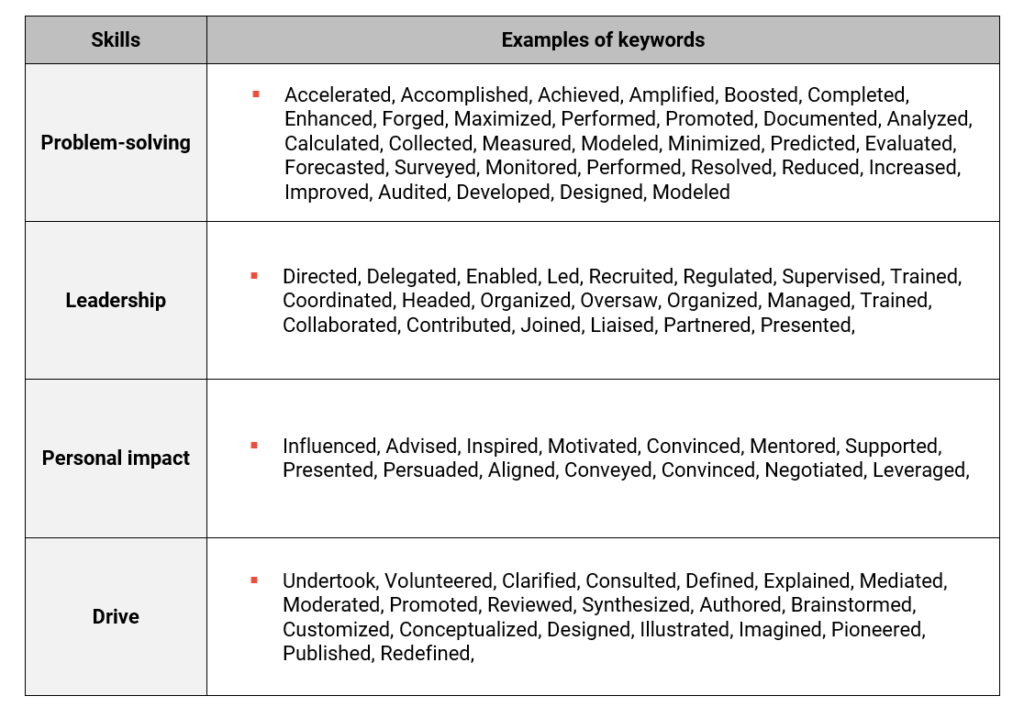
The result of your actions
Show the impact of your action.
The key here is to quantify your contributions .
For instance:
- Have you increased profits?
- Have you increased sales?
- Have you saved money?
- Have you increased productivity?
- Have you implemented a solution faster than expected? Or below budget?
- Have you made someone else’s job easier?
- Have you gained new customers?
- Have you increased customer’s satisfaction?
- Have you lowered customer churn?
- Have you improved a specific metric?
In addition, mention over what timeframe did you get these results .
For instance: “Increased customer satisfaction rate by 15% within 3 months.”
You must quantify the results of your actions.
It shows that you are result-oriented and comfortable with numbers .
20 examples of killer bullet points
Analytical skills :
- Analyzed a dataset of over 1 million customer interactions to identify key trends and recommended process adjustments that reduced operational costs by 15% within six months
- Designed and implemented a complex financial model to forecast the impacts of price changes on revenue, leading to an optimized pricing strategy that increased profits by 18% year-over-year.
- Resolved a long-standing issue with supply chain inefficiency by identifying key bottlenecks and implementing a real-time inventory management system that reduced delivery times by 33%.
- Led a task force to resolve a persistent quality control issue, devising a novel testing protocol that decreased defective product rates by 25% and saved the company $500,000 annually.
- Managed a team of 10 consultants in a high-profile market entry strategy project, guiding the client to expand into three new countries, resulting in a 20% increase in market share over two years.
- Directed a regional sales team through a critical turnaround strategy, reversing a two-year decline in sales and achieving a 10% growth in annual revenue within the first year of leadership
- Developed and presented monthly performance reports to senior management and stakeholders, enhancing the strategic decision-making process by providing clear insights and actionable recommendations.
- Authored a comprehensive training manual adopted across the company, which standardized procedures and improved training efficiency by 25%, enhancing overall operational readiness.
- Collaborated with cross-functional teams, including tech, marketing, and operations, to streamline the product launch process, reducing time-to-market by 30% and improving team satisfaction scores by 40%
- Partnered with software engineers and data scientists to develop a new analytics tool that improved data accuracy by 40%, enhancing the decision-making process across the business unit.
- Cultivated a client partnership that led to the firm securing a three-year service contract worth $3M, by consistently exceeding key performance indicators and delivering exceptional service quality
- Successfully managed client expectations and project deliverables in a complex IT overhaul, resulting in a 95% client satisfaction rate and subsequent referrals that generated additional business.
- Persisted in securing a pivotal client relationship amidst intense competition and initially unfavorable client sentiment, ultimately achieving a strategic turnaround that contributed to a 50% increase in the client’s investment
- Overcame significant project delays due to unforeseen regulatory changes, adapting project scope and timelines to meet new requirements while still delivering under budget and ahead of revised schedules
- Initiated and led a new digital transformation project that introduced AI-driven analytics to the firm’s service offerings, capturing a new market segment and increasing department revenue by 35%.
- Pioneered a market research initiative into emerging technologies, leading to the development of a new product line that captured an early mover advantage and resulted in a 20% revenue increase in its first year.
Step 6: Check the well-roundness of your profile
Now that you have EPIC bullet points, it’s time to check the well-roundness of your profile.
What does that mean?
It means you want to show you have ALL the consulting skills.
Or as many as possible.
Why is it important?
Because I see this mistake all the time:
Candidates with resumes showing only one skill.
For instance, the resume of an Engineer can only highlight their excellent analytical skills.
And waste an opportunity to show they have other consulting skills.
Like leadership, drive, or persuasion skills.
Don’t make the same mistake.
Step 7: Write the Executive Summary section
Just as the purpose of an advertisement is to get people to buy, a Career Summary is your opportunity to hook the reader’s interest and make him/her eager to scan further down the page .
However, this section shouldn’t take up more than four or five lines.
Otherwise, you’ll risk losing the recruiter before they move on to your professional experience.
The questions you need to ask yourself are:
- What are your core attributes? Dedicated, results-driven, and enthusiastic. [Note: check the Personal Attributes table below to help you answer this question]
- Who are you? A financial analyst.
- What is your experience, past and present? 4 years of investment banking experience.
- What are your core skills? Highly quantitative.
- What are your areas of expertise? Working with small corporates with revenues of up to €50m per annum.
- What have you achieved, or in which areas do you excel? Developing client accounts and increasing revenue.
- What do you enjoy doing? Team leading, client contact.
A dedicated Financial Analyst with 4 years of experience gained working for two of the UK’s leading investment banks. Experienced with managing and developing a portfolio of small corporate accounts with an annual turnover of €50m, positively impacting bottom-line profitability. Thrives on providing exemplary levels of customer service and managing small teams. Enthusiastic and results-driven with an innate ability to pay close attention to detail.
This is one of the toughest sections of the management consulting resume to write.
Because you only have a few sentences to highlight the most important attributes you think will catch the recruiter’s attention.
List of personal attributes
Able Dependable Innovative Punctual Accurate Decisive Intelligent Qualified Adaptable Detail-oriented Inventive Quick-thinking Adventurous Determined Loyal Rational Alert Diligent Mature Realist Ambitious Diplomatic Methodical Reliable Articulate Dynamic Meticulous Reputation Assertive Effective Motivated Resourceful Astute Efficient Multilingual Responsible Attention to detail Empathetic Objective Self-assured Bilingual Energetic Observant Self-confident Bright Enthusiastic Open-minded Self-motivated Calm Expertise Organized Self-reliant Capable Fast-track Outgoing Sensitive, Flexible Passionate Spirited Caring Focused Patient Successful Clarity Friendly People-oriented Supportive Committed Goal-driven Perceptive Talented Competent Persistent Tenacious Confident Hands-on Personable Thorough Conscientious Hardworking Positive attitude Thoughtful Consistent Helpful Presentation Time keeping Co-operative High-energy Principled Trustworthy Creative High-impact Proactive Understanding Cross-functional Honest Productive Versatile Decisive Imaginative Professional Willing Dedicated Independent Proficient
Step 8: Add the other information section
My recommendation here is to keep things simple and to list the foreign languages you master as well as your hobbies.
Things to include:
- Languages you master and your level of proficiency
- Hobbies (try to be original and put signs of success such as running a marathon in less than 4 hours or playing concerts, etc.)
- Certificates
- IT skills such as Excel, PowerPoint, or Word (it’s useless)
Step 9: Proofread and check typos
After you have completed the laborious process of distilling your life’s accomplishments onto a single piece of paper, it’s time to polish your consulting resume to make sure it stands out above the rest .
Your resume is one of the few things you need to be perfect .
Thus, you must put the same attention to detail in your resume as Management Consultants do with their slide deck presentations .
Perfection is the minimum standard your management consulting resume must pass to keep it out of the rejection pile.
Pay close attention to the following areas to make your resume bulletproof.
Consistency
A consulting resume demands consistency across every single element on the page.
The decisions you make about how you format your resume, from the styles of your headings to your font emphasis, must be consistent throughout the entire document .
For instance, if you use 12-point bold font for company names on your CV, all company names should be formatted the exact same way.
Another example:
If you’re styling your role in italics, then every job title in your resume should also be formatted in italics.
Spelling and grammar
Few things scream “unprofessional” quite as lo udly as spelling and grammar errors on a resume.
So pay extra close attention to avoiding these errors at all costs .
You can not make a single error here.
Hence, ask for at least three different people to read your resume.
The company Talent, Inc recently surveyed 379 recruiters and human resource executives and asked them, “What are your biggest resume ‘deal-breakers’ that can cost a candidate the job?”.
They confirmed that spelling and/or grammatical errors could lead to a candidate’s dismissal even before they finish reading the resume .
Here is a list of CV mistakes to avoid.
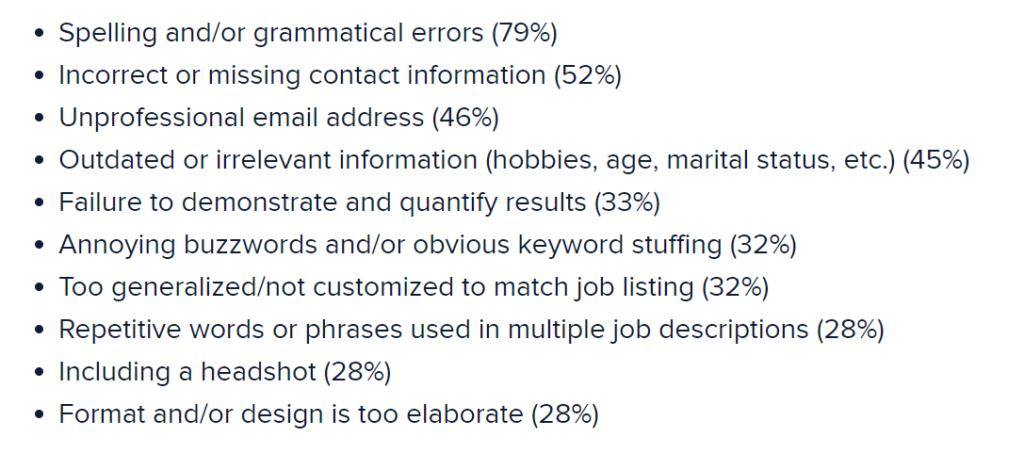
Every other formatting and stylistic element should be perfect, including spaces, tabs, line heights, font emphasis, horizontal dividers, margins, bullets, and alignments.
In addition, make sure indents are consistent throughout the resume; you can do this by clicking on the ruler mark at the top of the document (⌂) to show the vertical line of the left and right margins across the screen and see where the text lines up.
File name and type
First, use the PDF format when submitting your resume to a consulting firm unless otherwise specified by the company or recruiter.
Besides, when assigning a file name to your resume, include your first and last name along with the name of the company you’re applying to in the name of the file, like “Sébastien Ritter Resume McKinsey.”
Note: your consulting cover letter must respect the same guidelines about file name and type.
Step 10: Get your CV reviewed by a consulting expert
I cannot blame you if you are struggling to write your management consulting resume:
It can be overwhelming to decide which information to include in your resume.
And to choose which words to use to describe your achievements.
To ensure your consulting resume is great, share it (with this article 😉) with your friends and ask for feedback .
But do not ask all your friends.
Instead, focus on these three people:
- Someone who is a grammar champion,
- An HR person, preferably in the consulting industry),
- And a Management Consultant.
If you need help from a team of experts (including former MBB recruiters), check this page .
Why work with us?
Check these success stories from our clients and learn more about how we achieve an 85% success rate .
Step 11: Complement your resume with a great cover letter
I always recommend submitting a consulting cover letter .
Submit a consulting cover letter even when consulting firms don’t ask to.
This article will help you write a compelling cover letter .
My best consulting resume tips
In 2023, I analyzed 147 management consulting resumes .
As a result, here are my 7 best resume tips.
You’ll also learn the most common mistakes to avoid at all costs.
Consulting resume tip 1: Meet consulting requirements
McKinsey, BCG, Bain, and other top consulting firms are searching for candidates having consulting skills.
For instance, these consulting skills are problem-solving, leadership, impact on others, entrepreneurship, etc.
You will likely need to modify your standard resume, which you may already use for other jobs, to highlight the particular soft skills consulting firms seek.
If you don’t do this, your CV may be ignored because it isn’t sufficiently tailored to consulting.
Consulting resume tip 2: Simplify your writing
Clarify and condense your message.
Using complicated words and jargon would almost certainly fail to convey your intentions to the company, and the person reading the resume probably won’t bother with the rest of your application.
Consulting resume tip 3: Show how you moved the needle
Make sure to quantify your accomplishments.
If you can demonstrate your actions’ impact, especially at work, your accomplishments will appear more impressive.
Use numbers (e.g., produced 9% year-over-year sales growth and produced £92m in efficiency savings) whenever possible.
Having specific personal information can help you stand out from other applicants.
Consulting resume tip 4: Write for a 20-second scan
Consulting HRs will not spend 10 minutes reading your consulting CV.
Not even 5 minutes.
Instead, they will scan it.
Thus, a good first impression only has less than 20 seconds to make an impact.
To do so, use keywords that HRs are looking for.
Action verbs are a great place to start with.
Each of your sentences needs to begin with an action verb emphasizing a soft skill that top consulting firms are looking for.
For instance, your leadership bullet points should begin like this:
“Led a team of 4 Engineers…”
Another example: your problem-solving bullet point can look like this:
“Solved one of the most challenging productivity problems…”
These action verbs are significant because they come at the beginning of sentences.
The resume screener will say:
“Okay, this person has the right skills,” if you use the proper ones. I’d like to examine their resume in more detail. “.
Consulting resume tip 5: Emphasize big brand names
Ensure the prestigious universities you attended and the prestigious businesses where you worked are prominently mentioned on your resume.
Consulting resume tip 6: Remember that spelling counts
Grammar and spelling mistakes can indicate that you neglected to proofread your own resume.
Additionally, be consistent—do not represent a dash with “—” in one location and “–” in another.
Consulting resume tip 7: Give yourself time to write a quality resume
A strong consulting CV takes time to write, just like consulting cover letters do.
It’s important to consider your accomplishments and what sets you apart from others if you want to be successful.
Think twice before assuming you can create a quality management consulting CV in a single evening.
It necessitates numerous revisions, careful rereading, and prompt feedback.
Additionally, you must ensure that the management consulting CV complements your cover letter flawlessly and elaborates on your impressive abilities and experiences.
Five consulting resume examples that worked
Undergraduate consulting resume example.
Here is a first example of a winning McKinsey consulting resume.
This candidate has been invited for interviews and received an offer.
Note: this CV was also a winning BCG consulting resume and Bain consulting resume.
Note 2: I’ve changed some data for anonymization purposes.
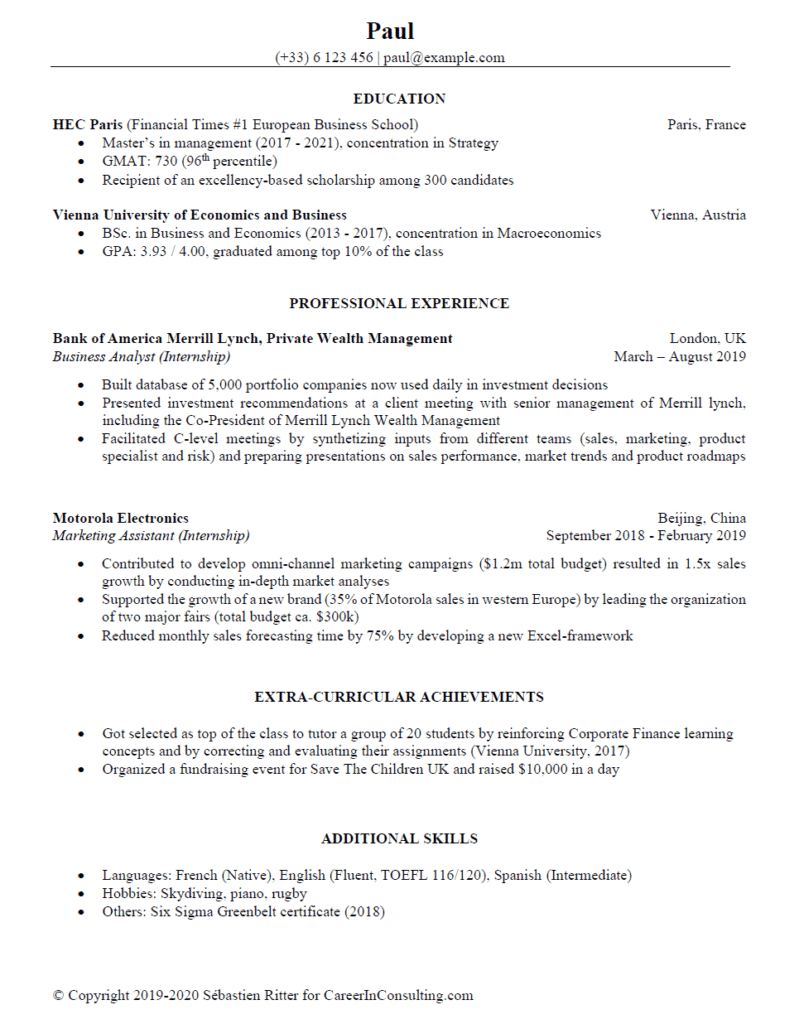

MBA consulting resume example
Consulting firms love hiring MBA students!
But the competition is fierce.
And it can be challenging to stand out from your peers.
Hence, here is an MBA consulting resume example that worked in 2023.
Use this consulting resume example to update yours.
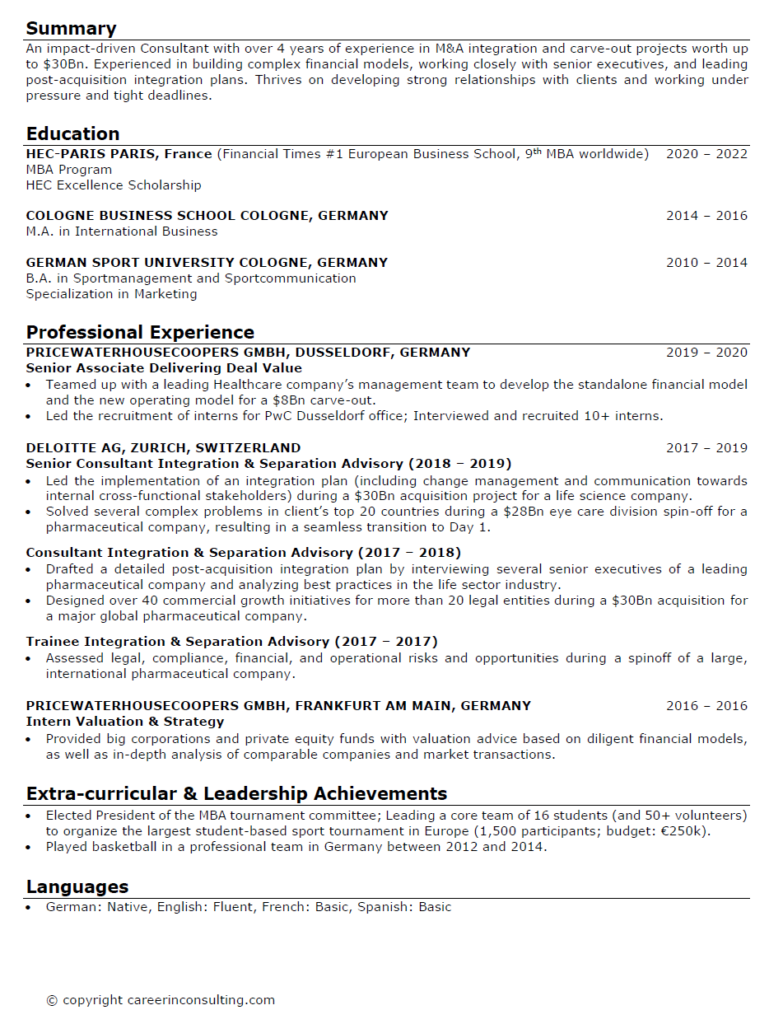
PhD consulting resume example
After a few years of working on their thesis, a PhD candidate can feel that academia is not for them.
I’ve worked with several PhD candidates willing to (re)start their careers by joining a top consulting firm.
Here is a MhD consulting resume example that worked.
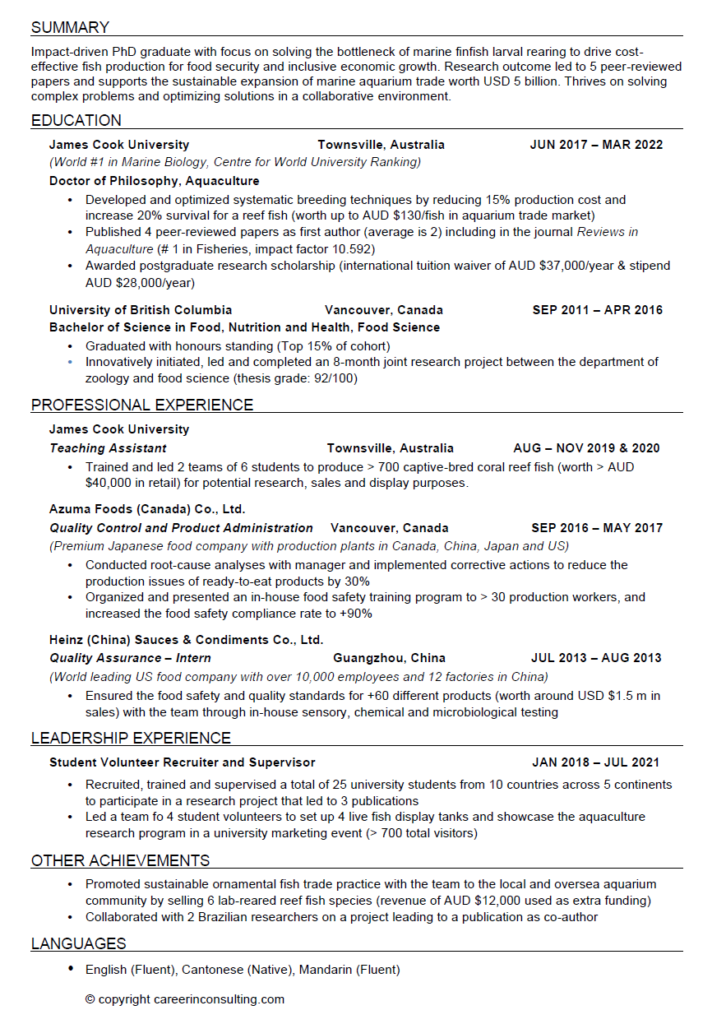
Experienced professional consulting resume example
After a few years, some experienced professionals might feel not challenged enough.
These professionals?
They don’t like the routine in their jobs anymore.
Hence, here is the turn to a career in consulting.
Next, a consulting resume example of an experienced professional.
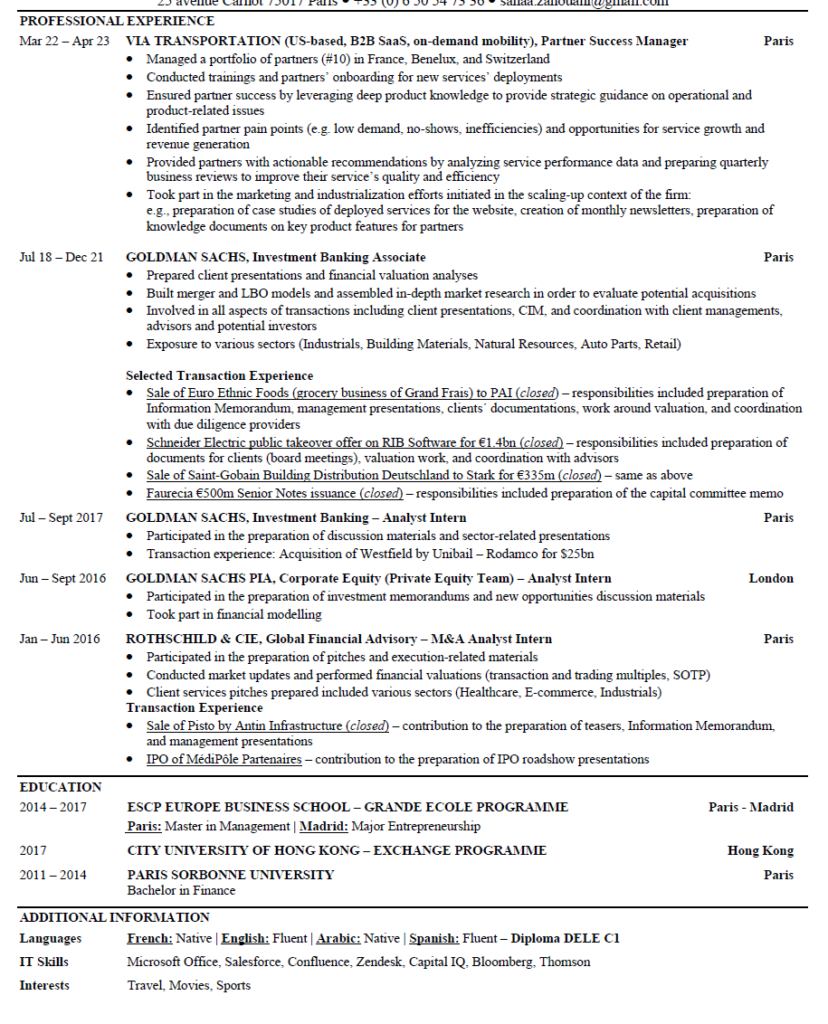
Bonus: Firmlearning's McKinsey CV
Besides, you can watch this video from the YouTube channel Firm Learning (hosted by a former McKinsey consultant):
Attention: you can find hundreds of consulting resume examples online.
But you should never copy/paste sentences from those consulting resume examples!
You must understand the principles of a winning consulting resume.
And how to apply those principles to your management consultant resume.
Consulting resume templates
Do not reinvent the wheel.
Thus, you can download free Word or PDF templates to fasten the writing process.
These are detailed templates that will help you outline your resume correctly.
You can use these templates to apply to any top-tier consulting firms, including the following:
- Bain & Company
- Oliver Wyman
- Roland Berger
- Deloitte Monitor
- Strategy&
- E&Y Parthenon
- And many more.
If you need help writing your resume, these templates will help you.
Here is the Word template .
And here is the PDF template .
Besides, check this article to download consulting cover letter templates and examples.
A consulting resume review
In this video, I’ll review the resume of Yash.
Yash is currently an MBA student, and he is planning to apply to McKinsey later this year.
We decided to go through his McKinsey resume.
I gave him feedback on what was good and how to improve the parts of his resume that didn’t work.
For instance, we discussed how to show his impact on his previous experiences better.
The cool thing about this is that you can use this feedback to improve your management consulting resume and pass the screening phases.
Enjoy the video!
Consulting resume: the ultimate checklist
Writing (or polishing) a resume that passes the screening phase is difficult.
And this guide comes with a lot of strategies and techniques.
Thus, to help you finalize your resume, I’ve prepared a checklist for you.
You can access this checklist by clicking on this link .
Then, you’ll see a Google spreadsheet that you can download.
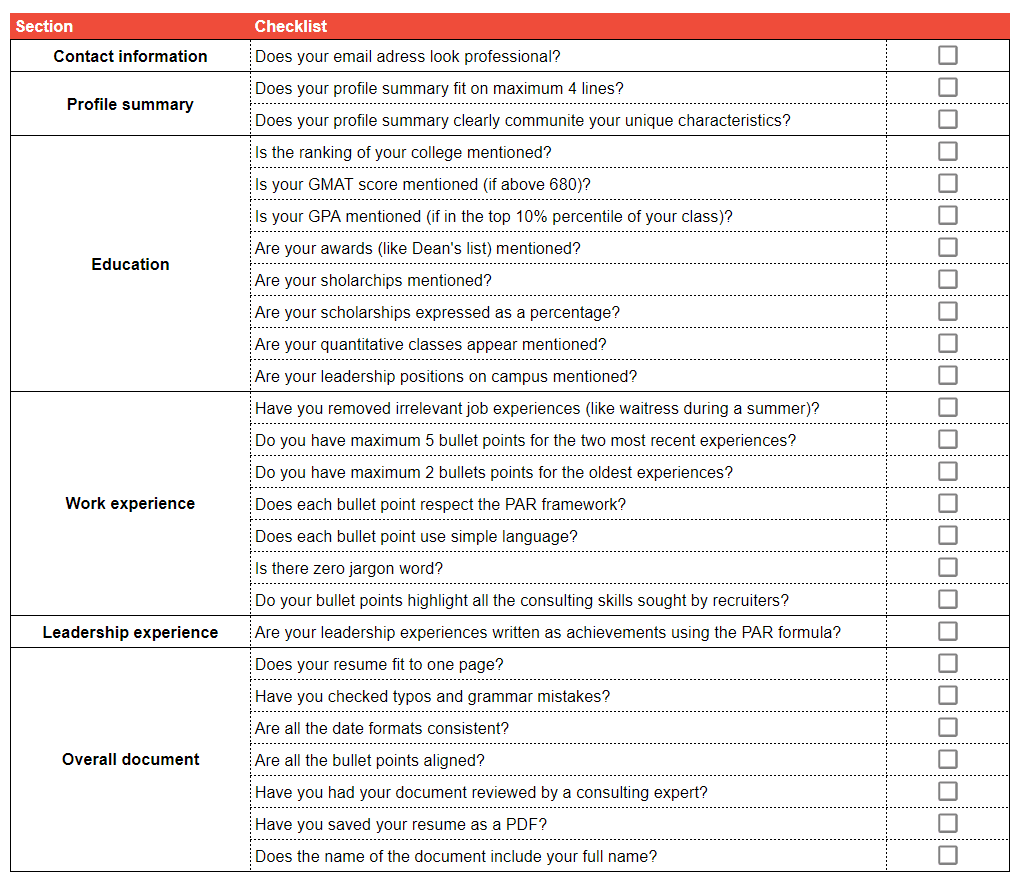
I use this checklist to help my clients write winning consulting resumes and secure interviews.
Frequently asked questions
Can i submit a 2-page resume.
Being able to prioritize information is key in consulting.
And it starts with the information you show on your management consulting resume.
Thus, consulting resumes must be 1-page resumes.
Should I include a company description?
Some people include a brief description of each company directly under the employment information, but I think it’s best to leave this off.
If you’ve caught a recruiter’s attention and haven’t heard of a company listed in your experience, they’ll do their own research and look it up on Google or LinkedIn.
And if the company is well-known, including a description of what they do will insult their intelligence.
Your accomplishments will primarily be what matter most to a recruiter, not where you achieved them.
Use that space for your results bullets instead!
Do I need a consulting experience on my resume?
You don’t need experience in consulting to land a job in consulting.
Show your transferable skills in your management consulting resume.
What’s different in a consulting internship resume?
There is no difference between a consulting internship resume and a full-time consulting resume.
Should I include all my education history?
Do not include high-school diplomas.
Instead: includes your Bachelor and Master’ degrees.
Should I submit a different consulting firm resume?
Write one perfect management consulting resume, and you’ll be good 🙂
Even the consultant resume summary section must be the same.
What can I do if I can’t quantify my achievements?
These are very common questions among job seekers.
Let’s see how to answer those questions based on 3 different situations.
First situation: your contribution can be quantified, but you don’t have the number.
Unless you were actively keeping track of your results at your job, you probably don’t know how much impact, exactly, did your work have.
The first solution is to ask your previous employers for the data .
They should be more than happy to send it over!
Another solution is to estimate the results by yourself (like doing a market sizing question ).
And that’s ok to put a rough estimate in your resume.
It shows that you are comfortable with numbers, and that’s great for consulting jobs!
But never lie in your resume or during job interviews .
Don’t say, “I increased sales by $15m,” if you know that the order of magnitude is not true.
Second situation: your contribution can’t be quantified, but the resources used to solve the problem can be.
If you can’t quantify the result, give a perspective on the scale of the problem by quantifying the resources involved .
How many people did you manage/work with? E.g., “Managed a team of 5 software engineers to develop software solutions for clients.” or “Worked with a team of 6 to create award-winning ad campaigns for Company X.”
What was the budget? E.g., “Successfully carried out X marketing campaign, going under the designated budget of Y USD.”
How many clients/customers did you work with? E.g., “Managed marketing campaigns of 5+ SaaS clients in the fin-tech and HR-tech industries.”
Third situation: you can’t quantify your result or the resources needed to solve the problem.
My first question is: are you sure?
If yes, don’t put a number .
Yet, try to put your achievements into perspective .
Supervised a team diversity initiative which led to a complete overhaul of the company’s hiring process
Created customer support strategy, which received approval from C-level executives
Introduced a product development framework now used by the engineering team across the company
How can I choose my achievements if I’m still a student?
If you’re a student or a recent graduate, you probably don’t have that much work experience
Yet, you can list achievements from:
- Internships
- School projects, for instance: I created a marketing strategy for Company X as part of my Marketing 101 class.
- University club activities, for instance: led the consulting club at XXX University
- Volunteering Experience, for instance: taught kids elementary mathematics as a volunteer at XXX’s orphanage.
Should I include a career objective section?
Your consulting resume should not include a “consultant resume objective” section.
Consulting firms know your career objective: land a job in Consulting!
So, let me repeat:
Your management consulting resume should not include a “career objective” section!
However, your cover letter can address why you want to pursue a career in consulting.
Should I include a skills section in a consulting resume?
Your management consulting resume has one objective:
Show that you can become a successful management consultant!
Consulting firms know what skills you must have (see the above section) to become a successful management consultant.
Putting other skills on your consulting resume tells them you haven’t understood their expectations.
Consulting resume: final words
I hope you have enjoyed this updated guide for writing consulting resumes that work in 2023.
Now, I’d like to hear from you:
Which tips from today’s guide will you use first to write your management consulting resume?
Are you going to rewrite bullet points?
Or start with the Education section of your management consulting resume?
Let me know by leaving a quick comment below right now.
P.S. Are you looking for help?
If you want a team of experts by your side throughout the entire consulting recruitment process, check if we would be a good fit by clicking here .
We’d be thrilled to help you secure a job in the top consulting firm of your dreams!
How to answer the question “Why consulting” and “Why McKinsey? Why BCG? Why Bain & Company?” .
Also: read this article to write a compelling and personalized cover letter.
SHARE THIS POST
7 thoughts on “Consulting Resume: 11 steps to get interviews (2024)”
Pingback: How To Write A Persuasive And Customized Consulting Cover Letter - Career in Consulting
Pingback: All About The McKinsey Recruitment Process - Career in Consulting
Pingback: What Does A Management Consultant Do? - Career in Consulting
Pingback: All About The BCG Recruitment Process - Career in Consulting
Pingback: All About Bain Recruitment Process - Career in Consulting
You mentioned to “sign up” to get the 100+ achievement examples by email, but I’m not seeing anywhere to sign up or anything to sign up for.
The list of examples has been removed for now.
Leave a Comment Cancel Reply
Your email address will not be published. Required fields are marked *
You need 4 skills to be successful in all case interviews: Case Structuring, Case Leadership, Case Analytics, and Communication. Enroll in our 4 free courses and discover the proven systems +300 candidates used to learn these 4 skills and land offers in consulting.
- DACA/Undocumented
- First Generation, Low Income
- International Students
- Students of Color
- Students with disabilities
- Undergraduate Students
- Master’s Students
- PhD Students
- Faculty/Staff
- Family/Supporters
- Career Fairs
- Post Jobs, Internships, Fellowships
- Build your Brand at MIT
- Recruiting Guidelines and Resources
- Connect with Us
- Career Advising
- Distinguished Fellowships
- Employer Relations
- Graduate Student Professional Development
- Prehealth Advising
- Student Leadership Opportunities
- Academia & Education
- Architecture, Planning, & Design
- Arts, Communications, & Media
- Business, Finance, & Fintech
- Computing & Computer Technology
- Data Science
- Energy, Environment, & Sustainability
- Life Sciences, Biotech, & Pharma
- Manufacturing & Transportation
- Health & Medical Professions
- Social Impact, Policy, & Law
- Getting Started & Handshake 101
- Exploring careers
- Networking & Informational Interviews
- Connecting with employers
- Resumes, cover letters, portfolios, & CVs
- Finding a Job or Internship
- Post-Graduate and Summer Outcomes
- Professional Development Competencies
- Preparing for Graduate & Professional Schools
- Preparing for Medical / Health Profession Schools
- Interviewing
- New jobs & career transitions
- Career Prep and Development Programs
- Employer Events
- Outside Events for Career and Professional Development
- Events Calendar
- Career Services Workshop Requests
- Early Career Advisory Board
- Peer Career Advisors
- Student Staff
- Mission, Vision, Values and Diversity Commitments
- News and Reports
How to transition from PhD to consulting?
- Share This: Share How to transition from PhD to consulting? on Facebook Share How to transition from PhD to consulting? on LinkedIn Share How to transition from PhD to consulting? on X
Going from PhD to consulting can feel intimidating. It’s hard to know which consulting firms recruit PhDs, and at which level. And it can also sometimes feel unclear if you’ll be using your PhD skills at all or completely starting from scratch.
So let’s walk through how you should manage your transition from PhD to consulting step by step. From which firms to target to how much you will be paid and how to ace your applications and interviews. Read the full article here .
How to Transition from a Ph.D. to Consulting
- Last Updated March, 2024
Former BCG Consultant
Why Become a Consultant?
What challenges do ph.d. & advanced degree candidates face in the consulting recruiting process, what do consulting firms look for in ph.d. & advanced degree candidates, what do you need to know to ace your consulting job application & interviews, which management consulting firms want to hire ph.d. candidates, resources for applying to consulting jobs..
What Do Consulting Firms Look for in PhD & Advanced Degree Candidates?
Which Management Consulting Firms Want to Hire PhD Candidates?
What Challenges Do PhD & Advanced Degree Candidates Face in the Consulting Recruiting Process?
Are you in your 3rd or 4th year of a Ph.D. or other advanced degree program and rethinking your future career in academia? Considering the transition from Ph.D. to consulting?
So here you are. Maybe you’re supposed to be writing your dissertation, but you’re dreading that upcoming job market and wondering about alternative career paths instead. Or you’re a postdoc and your principal investigator just asked you to stay in the lab the entire weekend for something that you deem ridiculous.
Like me, you probably entered your Ph.D. program with plans to be a researcher or an academic, and for whatever reason, this does not feel appealing anymore.
Luckily for you, the skills you’ve been building in your Ph.D. program can be extremely in management consulting. Furthermore, consulting firms, especially the MBBs (McKinsey, BCG, Bain) are very keen on us.
In this article, we’ll discuss:
- Why become a consultant?
- What do consulting firms look for in Ph.D. and advanced degree candidates?
- Which management consulting firms hire Ph.D. candidates?
- What challenges do Ph.D. and advanced degree candidates face in the consulting recruiting process?
- What do you need to know to ace your consulting job application and interviews?
- Resources for applying to consulting jobs.
Let’s get started!
1. It’s an Attractive Job & Great Entry Point into the Private Sector
First, all the usual arguments on why consulting is a great career apply. Consulting is an amazing ramp to launch you toward any other career in the private sector. This is even more true for academics with no business experience: it’s like getting a stamp of approval from the private sector.
It’s also a way for you to figure out what you like over the long run as you will get rapid exposure to many different industries, problems, and actors. You’ll also learn skills that are transferable to literally any other job. The pay is good, of course, and may represent an upgrade in lifestyle compared to your student stipend.
2. It Might Be Refreshing After Academia
In a Ph.D. program, you pick your one or two advisers, and then you spend a (very) long time on a precise question, make sure you go as deep as anyone else on it, and then a little bit deeper.
In consulting, you will change your client, case (the client problem you’re solving), and the team every few weeks to months. Each case delivers an answer to a (sometimes initially vague) question that the client has, and that answer is “good enough” to support the decisions they have to make: going any further would be a waste of resources that could be better spent.
That does not mean getting lazy either though: the bar consulting firms set for this “good enough” is high and that’s what justify the fees they charge their clients (and the hours you’ll be working).
Consulting is also extremely fast-paced: you might have a check-in with your immediate manager every few hours during the day with output to deliver each time. That’s a whole other story from taking a few months to revise an article or presenting your progress in a seminar twice a semester, which can be a refreshing change if you work better under pressure.
Nail the case & fit interview with strategies from former MBB Interviewers that have helped 89.6% of our clients pass the case interview.
3. Consulting and Academia Have a Lot in Common
Structured thinking. Both consulting and academia require a taste for rigorous analysis and structured thinking. In both worlds, you have to like solving problems and presenting your answers to others to succeed.
Teamwork. Consulting is really the place for teamwork, both with the rest of your case team and with your clients. This might be something you are more or less used to depending on your own field. Personally, collaborations were my favorite part during my Ph.D.
Impact. Consulting and academia are also similar in that successful people tend to care deeply about the impact that they have, which I believe is the case of most people who produce top research.
Continuous learning. Finally, they are both places of continuous learning which is quite precious in itself. This can’t be taken for granted in the rest of the labor force (you often hear people searching for a new job when they are not learning anything anymore in their current one).
4. You Might Be Very Good at It
No matter what your field is, the skills you spent 5 years or more honing are going to be helpful on the job: being analytical, structured, and independent (in consulting, this last one is called “ability to drive”).
When I say no matter what your field is, I mean it. My Ph.D. was in Economics, but my two best friends in my entry class at BCG wrote their respective dissertations in Philosophy and Biomedical Engineering.
Consulting firms got curious about hiring Ph.D.’s, postdocs, and the like because they kept growing faster than the MBA programs in top universities. They needed to look for other pools of talents that would allow them to target many great candidates easily.
They started hiring the occasional Ph.D., J.D., or M.D. to try it out — at BCG we used to be called “exotic candidates” a few years back. As these hires consistently performed well, top consulting firms started to systematically hire this candidate profile (and BCG went for the more sober “advanced degree candidates”).
During my recruiting process, a senior partner at BCG who was himself a Ph.D. told me that Ph.D.’s transitioning to consulting tend to have a steeper learning curve than their MBA counterparts, but that they end up performing better over the long run.
This might be a bit underwhelming to read (or if you’re very early in your application process, scary?), but the answer is simply: pretty much exactly the same as in any other candidate.
I’m no expert on the consulting resume / cover letter side of things, but make sure that your CV has some items that are not from academia so that they can tell from reading it that you are a well-rounded human being with a life outside of academia (whether or not you feel like it’s the case at the moment).
To show that you can make the transition from Ph.D. to consulting, you’ll need to show in your interview that you:
- Are a structured thinker.
- Know how to identify what the client’s problem is.
- Can solve it fast.
- Can communicate clearly.
- And are a driven individual who influences others and cares about impact.
Your Pool of Reference Is MBAs
One thing to note is that as a Ph.D., postdoc, M.D., or J.D., you are typically entering these firms as a second-level analyst (the name of that position changes for each firm). This means that the rest of your entry class will likely be all MBAs, in addition to a few first-level analysts getting promoted internally.
This also means that you are only about 2 years or so away from your first manager position if you get hired, so the soft skills and the independence matter more for you than they would for an undergrad who would be applying to enter as a first-level analyst.
Of course, your interviewer will expect you to be a little less polished than the average MBA candidate as they know that you didn’t spend the last 2 years preparing only for this one day of interviews (in between some heavy partying and an internship in an NGO).
However, they still want you to be someone they’d feel confident putting in front of a client. On top of your analytical skills, that means communicating clearly, understanding basic business terms, and showing the right set of soft skills such as presence, confidence, and personability.
The MBBs (McKinsey, Bain, & BCG)
Advanced degree candidates make up a larger share of the incoming classes at McKinsey, Bain, and BCG each year. These firms are the leaders of the industry and are generalist firms, meaning that you will be able to see many different industries while working there (but you don’t have to if you already know you want to specialize).
McKinsey, Bain, and BCG even have special immersive recruiting workshops called respectively “ McKinsey Insight ,” “ Bain ADvantage ,” and “ Bridge to BCG .” Links to both programs are included in our resource list below.
I went through Bridge myself, and these 3 days convinced me this was the firm where I wanted to work. Friends of mine who went through Insight shared similar things about it. My own experience at BCG showed me that my background in academia was really valued there
Other Generalist Firms
T hen you have all the other generalist firms. Each one has its own recruiting policy for advanced degree candidates, and you should get familiar with the recruiting process of any that you are interested in. (You can find a list of over 200 management consulting firms here ).
You can also use that recruiting process to get a sense of each firm’s familiarity with advanced degree candidates and whether you think you’d thrive there.
Specialized Arms of the Big Consulting Firms
Most big generalist firms also now have specific entities within them that focus on some particular industry. Examples include BCG Gamma for data science or Deloitte Federal Consulting for public sector and non-profit.
These entities typically have a separate recruiting process from their parent company and can be very interested in the expertise of certain academic profiles.
Boutique Firms
Finally, many specialized consulting firms look to hire Ph.D., M.D., and other postdoc candidates who work in related fields.
This is especially the case for life science consulting firms such as IQVIA or Putnam Associates , where the business problems their clients face cannot be fully separated from the technical side.
Moreover, when everybody in the client’s company has a Ph.D., it helps these consulting firms to build trust and credibility when the analysts they send speak the same language and have the same credentials.
Understanding What the Interview (and the Job) Are About
As a Ph.D. candidate, you’ve learned the jargon and the code of your academic field. You know how people think and talk, what they see as important. Consulting is just another world to discover, with a new set of codes that you have to learn and show that you know.
A consulting firm is hired by their clients to help them solve their business problems and help them make decisions based on what matters to them . The case interview is just a role play of that.
For that reason, it is not a differential equation to solve in your corner or a literature essay to write in full before publishing it: it is really about solving a business problem in real-time while taking the interviewer by the hand as you do so.
In practice, that means that you want to constantly (but succinctly) explain to your interviewer what you are doing before you do it, explain the logic in your steps, get their approval (we say “buy-in”) on any assumption that you have to make by justifying it, etc. Your job is to drive toward the answer while bringing your interviewer along with you each step of the way.
Being Efficient
The rhythm of the interview is a reflection of the intense rhythm on the job. Whether you’re laying out your structure for solving the problem, doing the math to support a recommendation, or answering a brainstorming question, you want to show that you know how to be efficient.
It’s not so much about speed (as long as you move fast enough to finish the case in ~25-30 minutes of course) as it is about your ease and steadiness. Strong candidates know exactly where they are going at all times, get their interviewer on board, and are just unrolling the steps to get there without getting stuck. They understand what matters for the answer and what does not as much and allocate their time accordingly.
In practice, that means getting enough practice so that you can:
- Lay out a MECE structure in under 2 minutes.
- Do not get stuck on the math and can go through calculations with ease.
- Know how to brainstorm a list of potential solutions.
Being at Ease with Business Concepts
I’m not saying you need to know every business concept. You just need to not be afraid of them. Ph.D. candidates and postdocs transitioning into consulting are often convinced that they will fail a case if a business concept they do not know shows up.
There are some extremely basic ones that for sure you should understand, but those you probably already know:
- costs (fixed and variable)
- market trends
- competitors
Sure, you need to understand what these words mean but you cannot go through the first 2 or 3 cases in your preparation without seeing them all.
There are also a few concepts that are slightly more complex and appear slightly less often but are as important. You’ll either need them to understand the question or because they basically are the answer to the case. These are:
- breakeven point
- product mix (and the related concept of cannibalization)
- turnover rate
Check out Case Interview Formulas You Need to Know for a primer on these important concepts.
Even for those though, you should realize that business concepts are just fancy words describing common-sense quantities of interest. If one that you do not know shows up, it’s completely fair game to ask your interviewer to clarify its meaning, and then use it as if you always knew it.
Again, business is not rocket science so if you spent x many years pushing the bounds of human knowledge forward, you can probably pull that one-off. The more you familiarize yourself with the basics through the casing and maybe listening to business podcasts or reading the business section of your favorite newspaper, the easier it will be for you. The point is not to know them all, simply to feel at ease and confident if a new one shows up.
Not Being Obsessed with Details
Solving the case is not the same as trying to think of any point and sub-point a reviewer might ask you to cover in order for your paper to be published. Remember that the answer you’re trying to get at has to be “good enough” for the client to make a decision, according to their criteria.
Of course, consultants like to go a little bit over the top and deliver some extra (such as an analysis of the risks to consider), but they do not try to get exhaustive the way an academic would. This has no point in the business world where we constantly bathe in massive uncertainty.
If there is a moment in the case when you realize that the data you’re given or the way the interviewer wants you to do the math is making an implicit assumption or is ignoring potential nitty-gritty cases, don’t feel like you have to hammer that nail and lose time.
At most, if it’s already going well you can just acknowledge that out loud. And if taking this into account wouldn’t change the answer, it’s not worth wasting time on.
Doing the Math the Consulting Way
Your current level of confidence around the math might depend on whether you are in an analytical field, but know this: consulting math is high school math, and you probably did ok in high school.
It’s all simple arithmetic. The trick is that you have to be at ease doing it under pressure, ideally without mistakes and without getting stuck. You should also be extremely structured in the way you approach it and detail to your interviewer everything you are going to do before you do it.
As you build more ease, you will also start seeing which shortcuts you can take to get to the right answer even faster.
Displaying the Right Soft Skills
Finally, you have to understand that consulting is a client services business and as such, the opinions of their clients matter. Therefore, consulting firms care about how their employees appear and the image they project, and you’ll have to conform to that to get the job. Moreover, the intensity of the job, its feedback culture, and the omnipresent teamwork also matter.
That means being a great communicator, displaying confidence, being present and making eye contact, and being personable is important. It also applies to something as simple as how you dress on interview day: make sure you come with a suit or other business formal wear that is well-tailored to you. Again, your interviewer has to feel confident you could represent their firm in front of a client.
As an academic, it’s not that you are naturally less gifted at any of these, it’s that so far you might have gotten a pass as long as your research was good. Now you are entering a world where those things matter as much as the content of your brain, and the people who have been in that world for longer simply had to work on it already. Now it’s your turn.
1. Do Your Research
Ph.D. candidates looking to transition to consulting need to identify the companies they’re interested in and learn the specifics of each. Reach out to alumni from your schools, friends, or friends of friends who work for these firms. You can also network with consultants who present at on-campus or virtual information sessions (or even cold message consultants on LinkedIn. The best people to reach out to are those who share your academic background).
The more exposure you get to this world, the easier it will be for you to figure out whether you like it and to show that you do if that’s the case.
2. Be Strategic in Your Application Process
Once you know where you want to apply, get familiar with their application process. Go to their recruiting events. Don’t miss deadlines.
When applying, don’t neglect polishing your Resume and Cover Letter so that they fit the mold of consulting. That means that if you are a postdoc, do not send an academic CV that is just the 17-page list of all your academic talks in bullet points.
3. Prepare for the Interview
As a Ph.D. student, this is maybe the scariest for you at this point. You probably have more to learn than an MBA who spent the entire year thinking about it, but the good news is that casing is not rocket science: you do not need a Ph.D. in it to excel.
It’s only about methodically planning your preparation so that you hone all the skills you’ll be tested on. The preparation is also a great way for you to see whether you’d like the job.
If you don’t know where to start, have a look at our Ultimate Guide to Case Interview Prep .
Good luck on your transition from Ph.D. to consulting!
- Bridge to BCG: What It Is & How to Get Accepted
- McKinsey Insight
- Bain ADvantage
- What Is Consulting?
- Consulting Resumes
- Consulting Cover Letters
- The Ultimate Guide to Case Interview Prep
– – – – – – – – – – – – – – – – – – – – – – – – – – – – – – – – – – – – – – – – – – – – – – – – – – – – – – – – – – – – – – – – – –
In this article, we’ve covered:
- What makes Consulting attractive after pursuing a Ph.D.?
- What are consulting firms looking for in advanced degree candidates?
- Which consulting firms should you apply to as a Ph.D. or postdoc?
- What challenges you might face as Ph.D. applying to consulting?
- How can you ace your recruiting process and case interview coming from academia?
Still have questions?
If you have more questions about transitioning from a Ph.D. to consulting, leave them in the comments below. One of My Consulting Offer’s case coaches will answer them.
Help with Your Consulting Application
T hanks for turning to My Consulting Offer for advice on transitioning from a Ph.D. to consulting. My Consulting Offer has helped almost 89.6% of the people we’ve worked with to get a job in management consulting. We want you to be successful in your consulting interviews too. For example, here is how Ellen was able to get her offer from BCG.
© My CONSULTING Offer
We are excited to invite you to the online event.
Where should we send you the calendar invite and login information.

Hacking the Case Interview

Are you looking to transition from a PhD or advanced degree program and get into management consulting ? Unsure of how exactly to do this?
We have you covered! This comprehensive article covers:
- Why consulting firms hire PhD / advanced degree candidates
- Firms that hire PhD / advanced degree candidates
- Challenges that PhD / advanced degree candidates face
- PhD / advanced degree consulting recruiting process
- Submitting a PhD / advanced degree consulting application
- Passing consulting interviews with a PhD / advanced degree
- Recommended PhD / advanced degree case interview resources
If you’re looking for a step-by-step shortcut to learn case interviews quickly, enroll in our case interview course . These insider strategies from a former Bain interviewer helped 30,000+ land consulting offers while saving hundreds of hours of prep time.
Why Consulting Firms Hire PhD / Advanced Degree Candidates
Consulting firms hire PhD and advanced degree candidates for many reasons.
One, consulting firms want to hire top talent wherever they may be. While consulting firms have traditionally hired from top-tier undergraduate and MBA schools , they have been moving towards also hiring from top-tier medical schools, law schools, and graduate schools. Talented future consultants can be found anywhere and consulting firms want to hire them.
Two, a lot of the skills that PhD and advanced degree candidates have can be transferred to consulting. PhD students gather data, break down problems, write papers, and present their work to others. Analyzing data and presenting your work are critical skills that consultants use every day.
Three, the work that consultants do is increasingly becoming more specialized, requiring specialized expertise. This is where PhD and advanced degree graduates shine. If a consulting firm is helping a pharmaceutical company develop a strategy to launch a new drug, who better to help them than a biochemistry PhD or MD that understands healthcare ?
Therefore, if you are interested in transitioning to the business world, know that consulting firms do hire PhD and advanced degree candidates that have no business backgrounds.
As a PhD or advanced degree hire, you’ll typically be placed at roughly the same level as an MBA hire. However, if you only have a master’s degree, you may be placed at the same level as an undergraduate hire.
Firms That Hire PhD / Advanced Degree Candidates
All three of the top-tier management consulting firms, McKinsey, BCG, and Bain, hire PhD and advanced degree candidates. In fact, they have special programs that are tailored to helping PhD and advanced degree candidates go through the recruiting process.
In addition, many other top consulting firms hire PhD and advanced degree candidates, including Deloitte , Strategy& (part of PwC) , EY-Parthenon , LEK , and Roland Berger .
If you have a PhD in life sciences or an MD, there are many consulting firms that specialize in life sciences consulting . These consulting firms include: ClearView Healthcare , Guidehouse (Navigant ), ZS , Putnam Associates , and Huron Consulting .
Overall, there are many consulting firms that will hire PhD and advanced degree candidates.
Challenges that PhD / Advanced Degree Candidates Face
Although PhD and advanced degree candidates have some skills that will transfer over to consulting, there are many skills that will not. There are six main challenges that PhD and advanced degree hires will face when they recruit for and enter consulting.
Understanding essential business concepts
PhD and advanced degree candidates spend years studying fields that have nothing to do with business. One of the biggest challenges that these candidates face is ramping up on fundamental business knowledge.
Consulting does not require specialized business knowledge, but candidates should be familiar with fundamental business concepts, such as profitability, market share, and competitive advantage.
Additionally, many PhD and advanced degree candidates will lack the business judgment and acumen that a traditional MBA candidate has. Building up a strong business instinct takes time.
Solving problems quickly
PhD candidates may work on one project for many years, extensively researching the topic and going very deep into the details and nuances of the problem.
In contrast, consulting projects are typically solved in 3 – 6 months. As a new consultant, PhD and advanced degree candidates will need to learn how to solve problems quickly by focusing on the most important issues or areas.
Doing simple math calculations quickly
PhD candidates likely use sophisticated and complex mathematics in their research and work, such as differential equations or linear algebra.
In consulting, only very basic math is used. Surprisingly, during interviews, PhD and advanced degree candidates have a much more difficult time performing basic math calculations than undergraduate candidates. This may be because PhD candidates are used to doing higher level math using statistical software rather than doing simpler math calculations by hand.
Therefore, PhD candidates will likely need to brush up on their basic math skills to perform calculations quickly and accurately during their interviews.
Making things simple and easy to understand
One of the key skills in consulting is to make things simple and easy to understand. This is important in order to make clients understand their business situation and act on the recommendations that the consulting firm has provided.
PhD and advanced degree candidates deal with complex and intricate problems that are often difficult to explain to the average person. To be a successful consultant, PhD and advanced degree hires will need to practice explaining complex things in a simple way.
Not focusing too much on the nitty gritty details
In a PhD program, you go very deep into one particular area or topic. To become an expert in the field, you typically read all of the scientific papers published on the topic and know all of the details.
Consulting is less focused on the nitty gritty details. Consultants will learn just enough about a particular topic or area in order to be able to solve the business problem.
Focusing more on the overall business problem and focusing less on minute details is one skill that PhD and advanced degree hires will need to learn and develop.
PhD / Advanced Degree Consulting Recruiting Process
Some consulting firms, such as McKinsey, BCG, and Bain, offer programs that specifically help PhD and advanced degree holders apply and transition to consulting. Participating in these programs will help you build connections and increase the likelihood of receiving an interview.
These programs are fairly competitive and require you to submit an application in order to be accepted into the program.
- McKinsey Insight Program : This program provides an overview of management consulting and McKinsey, an opportunity to connect with consultants that share a similar background to you, and a mock case study.
- Bridge to BCG Program : This program provides an overview of consulting and what makes BCG special. You’ll have the opportunity to solve a BCG case in a case team simulation, network with consulting staff, and participate in social activities.
- Bain ADvantage Program : This week-long consulting internship immerses candidates into life at Bain and a career in consulting. You’ll have a full day of training followed by four days of a staffing assignment on a real case team. If accepted into this program, you will receive a guaranteed final-round interview for a full-time Consultant position.
Outside of these programs, the PhD and advanced degree recruiting process looks like the following:
- Submit your consulting job application
- Pass your first-round consulting interviews
- Pass your final-round consulting interviews
- Receive your consulting job offer
Submitting a PhD / Advanced Degree Consulting Application
Consulting firm job applications typically have three components: the resume , cover letter , and the optional referral.
We’ll briefly cover each of these components of the application over the next few sections. Each section has a link to a more comprehensive, in-depth guide that you should read.
Consulting Resume
Your resume is the single most important factor that decides whether or not you will receive a consulting interview. Consulting resumes are quite different from the type of resumes you would use in a PhD or advanced degree program.
For example, you will not need to list publications you have contributed to or conferences that you have attended. You’ll also need to simplify the topic of your research so that the average recruiter can understand what you have worked on and what you have accomplished. Finally, make sure to focus less on the details of your work and more on the overall accomplishment and impact.
Make sure to tailor your resume so that it follows the structure and format of a consulting resume.
In short, keep your resume to one page and quantify the impact of your accomplishments.
Consulting firms like to see:
- High grades
- Prestigious schools that you have attended
- Brand name companies that you have worked for
- Significant impact in your work experiences
- Meaningful leadership positions in your extracurricular activities
For a step-by-step guide to crafting the perfect consulting resume, check out our comprehensive resume guide .
Consulting Cover Letter
The cover letter is less important than your resume, but can make the difference between receiving a consulting interview and not receiving one if your resume is on the borderline.
Your cover letter should be concise and straight to the point. Introduce yourself and then briefly explain why you are interested in consulting. Spend most of the cover letter explaining what qualities you have that would make you a great fit for the firm.
To avoid having a generic cover letter, include specific reasons why you are interested in the consulting firm you are applying to. Mention former or current employees that you have spoken to and what aspects of the firm you find most attractive.
For a step-by-step guide to crafting the perfect consulting cover letter, check out our comprehensive cover letter guide .
Referrals are not part of the official application process for consulting firms, but they are a quick way to make your application stand out.
If you have a friend or colleague that works at the consulting firm you are applying to, ask if they would be comfortable giving you a referral.
Getting a referral means that someone at the consulting firm will send your name and resume to the recruiter that is in charge of resume reviews. Your application will get a closer look and be viewed a bit more favorably.
Referrals are not required to get interviews, but can help a lot. For the McKinsey Insight Program, Bridge to BCG Program, and Bain ADvantage Program, referrals can make a big difference given how competitive these programs are.
Passing Consulting Interviews with a PhD / Advanced Degree
A few weeks after the application deadlines, you’ll receive invitations from consulting firms for the first of two rounds of interviews.
Passing First-Round PhD / Adv. Degree Consulting Interviews
At most consulting firms, the first round of interviews consists of two separate 40- to 60-minute interviews. These interviews will mainly focus on case interviews, but you will also get a few other types of questions.
There are three types of consulting interview questions :
Case Interviews
- Behavioral Interviews
Why Consulting? / Why this Firm?
We’ll briefly cover each of these types of consulting interview questions over the next few sections. Each section has a link to a more comprehensive, in-depth guide that you should read.
Case interviews are a special type of interview question that consulting firms use to assess a candidate’s potential to be a great consultant. In a case interview, you’ll be placed in a hypothetical business situation and asked to develop a recommendation or answer to a business problem. A case takes about 30- to 60-minutes to complete.
Here are some examples of case interview questions:
- How can Coca-Cola increase its profitability?
- What should Netflix do to increase customer retention?
- Should Facebook enter the smart phone market?
- How should Apple price its new iPhone?
Case interviews begin with the interviewer reading you the background information on the case. You’ll then get the chance to ask clarifying questions to better understand the business situation and case objective.
Next, you’ll develop a framework to help you solve the case. A framework is a tool that helps you structure and break down complex problems into smaller, more manageable components.
You’ll then be asked to answer quantitative and qualitative questions to build support for a recommendation. You may need to calculate expected profitability, interpret charts and graphs, or brainstorm and prioritize different ideas.
At the end of the case interview, the interviewer will ask you to deliver a final recommendation to address or solve the business problem.
Behavioral Interview Questions
Consulting behavioral interview questions ask you to give an example or story of a time when you displayed a particular quality, such as leadership, problem solving, or resilience.
Here are some examples of behavioral interview questions:
- Tell me about a time when you exceeded expectations
- Give me an example of a time when you had to persuade someone
- Describe a situation in which you resolved team conflict
- Give me an example of a time when you failed to meet expectations
- Describe a difficult or complicated problem that you solved
To prepare for these questions, develop a list of five different stories or examples that cover a wide range of positive qualities. You should select stories or experiences that are the most impressive and impactful.
When asked a behavioral interview question, mentally run through your list of prepared stories and select the one that is most relevant to the question that is asked.
You’ll want to share your story or experience by using the STAR method to ensure that you answer the question in a clear and structured way. STAR stands for Situation, Task, Action, and Result.
Situation : Provide a brief overview of the situation and any context that is needed to understand the story better. Keep this section as concise as possible because it is less important than the other parts of the story.
Task : Describe what you were asked or required to deliver or achieve. Again, keep this section concise since it is less important than the other parts of the story.
Action : Explain what steps you took to handle the task or meet the goal or objective. This is an important part of the story, so focus on sharing exactly what you did.
Result : Describe the outcome that your actions had, quantifying the impact. Also describe your key takeaways from the experience and how it impacted or influenced you as a person. This is the most important part of the story.
For a step-by-step guide on how to best answer all consulting behavioral and fit interview questions, check out our complete guide on consulting behavioral interview questions .
You will almost certainly be asked the “Why Consulting?” question at some point during your interviews. Interviewers want to know why you are interested in consulting to see if you know what you are getting yourself into and whether you are genuinely interested.
As a PhD or advanced degree candidate, you will need to provide compelling reasons why you are choosing to pursue consulting instead of the field that you have spent years studying.
There are many reasons you can give for why you are interested in consulting:
- You want to make a larger impact on the world by working with large companies to solve their most challenging business problems
- You see consulting as the quickest way to develop the skills to transition to the business world and become a business executive
- You enjoy working closely in teams to solve challenging business problems
- You value the mentorship and personal development opportunities that consulting provides
- You want to tackle a wide variety of different problems and consulting allows you to work on projects in many different industries and functions
Use the following structure to answer this question:
- State that consulting is your top career choice
- Provide three reasons to support this
- Reiterate that consulting best fits your professional needs and goals
In addition to the “Why Consulting?” question, you may also be asked “Why this Firm?” This question assesses whether you are genuinely interested in working at the consulting firm that you are interviewing for.
Again, there are many different reasons you could give:
- You have loved the people that you’ve met from the firm and would enjoy working with them
- The firm has an empowering work culture where you feel you would thrive
- The firm has deep expertise in a particular industry or function that you are passionate about
- The firm places a heavy investment in mentorship and personal development, which you value tremendously
- Several of your mentors and role models have worked at the firm and have recommended that you work there
Make sure to structure your answer to this question so that your answer is clear and easy to follow. You can use a similar structure to the “Why Consulting?” question:
- State that the firm you are interviewing for is your top choice consulting firm
- Reiterate that the firm best fits your professional needs and goals
For a complete guide on answering this question, check out our "Why consulting?" article.
Passing Final-Round PhD / Adv. Degree Consulting Interviews
Consulting final round interviews typically consist of two to three separate 40- to 60-minute interviews. You’ll see the same three types of questions that you saw in your first-round interviews.
There are three main distinctions between consulting first-round interviews and consulting final-round interviews.
First, your interviewers will be more senior people. This means that the case interviews you receive may be less structured and feel more like a qualitative discussion. You and the interviewer may just be discussing your opinions and ideas on a business problem.
Second, there is more of an emphasis on assessing your personality and cultural fit with the firm. Interviewers will not only assess whether you can solve case interviews, but they will also assess whether they would want to work with you on a team. Interviewers want to see if you are coachable, collaborative, and easy to work with.
Third, your interviewers may read the notes that your previous interviewers wrote about you. If there is a particular area of the case interview that you struggled with, interviewers may specifically test you on it again to make sure it is not a weakness.
Overall, you should still use the same strategies that you used in your first-round interviews for your second-round interviews.
Receiving your PhD / Adv. Degree Consulting Job Offer
After finishing all of your interviews, all you have to do is to wait. Consulting firms typically call candidates to tell them whether or not they are being extended a job offer.
Some candidates receive a phone call with good news on the same day of their final-round interview. Other candidates receive calls within a few days.
Be patient while waiting to hear back from consulting firms. If you have not heard back within a week, you can send a polite follow-up email with the recruiter to ask for an update.
When you finally get your call, all that is left to do is sign your offer letter to secure your consulting job!
Recommended PhD / Advanced Degree Case Interview Resources
Here are the resources we recommend to learn the most robust, effective case interview strategies in the least time-consuming way:
- Comprehensive Case Interview Course (our #1 recommendation): The only resource you need. Whether you have no business background, rusty math skills, or are short on time, this step-by-step course will transform you into a top 1% caser that lands multiple consulting offers.
- Hacking the Case Interview Book (available on Amazon): Perfect for beginners that are short on time. Transform yourself from a stressed-out case interview newbie to a confident intermediate in under a week. Some readers finish this book in a day and can already tackle tough cases.
- The Ultimate Case Interview Workbook (available on Amazon): Perfect for intermediates struggling with frameworks, case math, or generating business insights. No need to find a case partner – these drills, practice problems, and full-length cases can all be done by yourself.
- Case Interview Coaching : Personalized, one-on-one coaching with former consulting interviewers
- Behavioral & Fit Interview Course : Be prepared for 98% of behavioral and fit questions in just a few hours. We'll teach you exactly how to draft answers that will impress your interviewer
- Resume Review & Editing : Transform your resume into one that will get you multiple interviews
Land Multiple Consulting Offers
Complete, step-by-step case interview course. 30,000+ happy customers.

- 1 . 19 . 20
- Entrepreneur
Consulting With a PhD – 8 VITAL Steps (2023)
- Posted by: Chris
Updated May 15, 2023.
Six months into my post-PhD career, I left a job at a think tank to do consulting with a PhD.
I was watching the money the think tank was taking in to do these research projects. It was a lot of money. And they’d pay me by the hour. And when I sold a $50k project that took me 4 months to do, I confess I started to wonder why I needed the middleman.
Why couldn’t I just sell that project and do it myself?
It turns out it was harder than I thought. People paid the think tank because of their name and reputation, and I didn’t have that yet.
So I struggled to sell, and eventually failed miserably and ran back into a job.
Why do I tell you this at the beginning of a post on consulting with a PhD?
Because it’s possible to make a lot of money consulting. And I do consult successfully now. But it’s not easy.
Here are 8 things you should do to build a career in consulting with a PhD. (NB this post is about building your own business as a consultant rather than getting hired as a consultant with a big firm. You can read about that here. )
–post continues below —
And if you’re ready to launch your consulting business, check out my step by step guide here (opens in a new window).
This post contains links to affiliate products, which–if you choose to purchase–pay us a commission at no extra cost to you. This helps to support our work. We only promote products we’ve used and love . We love partnering with FreshBooks, which is dead simple to use and perfect for consultants!
1. Build your network
2. define what you offer, 3. consider working a job first, 4. learn business basics, 5. figure out how much to charge for consulting, 6. build your personal brand, 7. get professional help, 8. get ready to battle yourself.
Networking is everything. Your network will create wealth and opportunities for you. The bigger and better it gets, the more you’ll have.
If you aren’t willing to build a network constantly, don’t go into consulting. Consulting with a PhD can require near-constant selling, especially if your contracts are small.
And the first point of sales is relationships.
People are most likely to choose you from several people they could pick because they know you. If you’re on their radar, they won’t google someone; they’ll call you.
The great thing about building your network is that it doesn’t have to happen at some magical point when your PhD is done. You can start now:
See the related posts (Links open in a new tab):
Many Students Have No Idea How to Network. Here Are 5 Tips.
6 Mistakes PhDs Make When Networking
Here’s Why Networking Will Dramatically Change Your Career
In this video, I told the story of how my network helped me land my first $40,000 consulting client!
You should know what it is you have that companies occasionally, and preferably routinely, pay for.
Consulting represents a sweet spot where employers really need to or want to get something done, but don’t have enough employees to do it and can’t justify hiring one. Enter you.
Let’s say that hiring a new research assistant would cost them $40K for a year. If you’re there and will save them the hassle of doing this, plus they get a PhD on it, they might throw $20k or $30k at you to do the project.
But define, define, define.
Be specific. Don’t just say that you’re a researcher. Be clear on what your offer is.
Some of your transferable skills CAN be really valuable here.
I can do Program Evaluation, Stakeholder Mapping, and Convening, and write policy papers in the areas of immigration, education and skills, and innovation and economic development.
If you’re on LinkedIn (which you should be), you can add certain services to your profile — making you more searchable for those things.
Here’s mine…
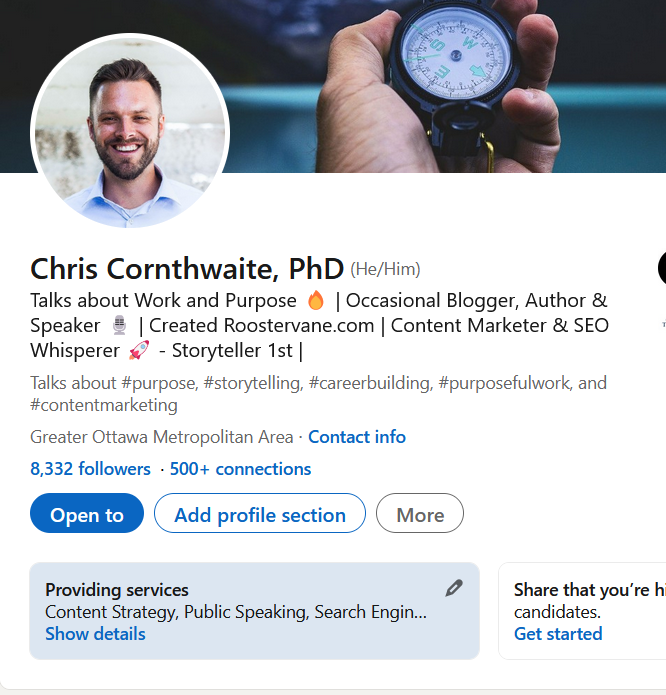
Pro Tip – As you meet people and build your network, ask what their specific needs are. Ask how often they hire consultants, what they usually hire consultants for, and if there’s a list you should be on. Do they need an engineer to run two months of tests to validate a concept? Do they need a policy researcher with expertise in gender studies to write a report? Figure it out! And use what you learn to adapt your offerings.
What is a science consultant?
A science or scientific consultant brings specific scientific area knowledge to a company that might need fractional help–either specialized or general. For example, here is a story of a molecular biologist who consults on grant applications for major medical projects .
What is a management consultant?
A management consultant is trained to understand corporate structures and processes, to step into a situation from the outside and offer suggestions. Many consulting companies hire PhDs because of excellent critical thinking skills, occasionally combined with specialized knowledge fields (ie. biotech, data processing, etc.).
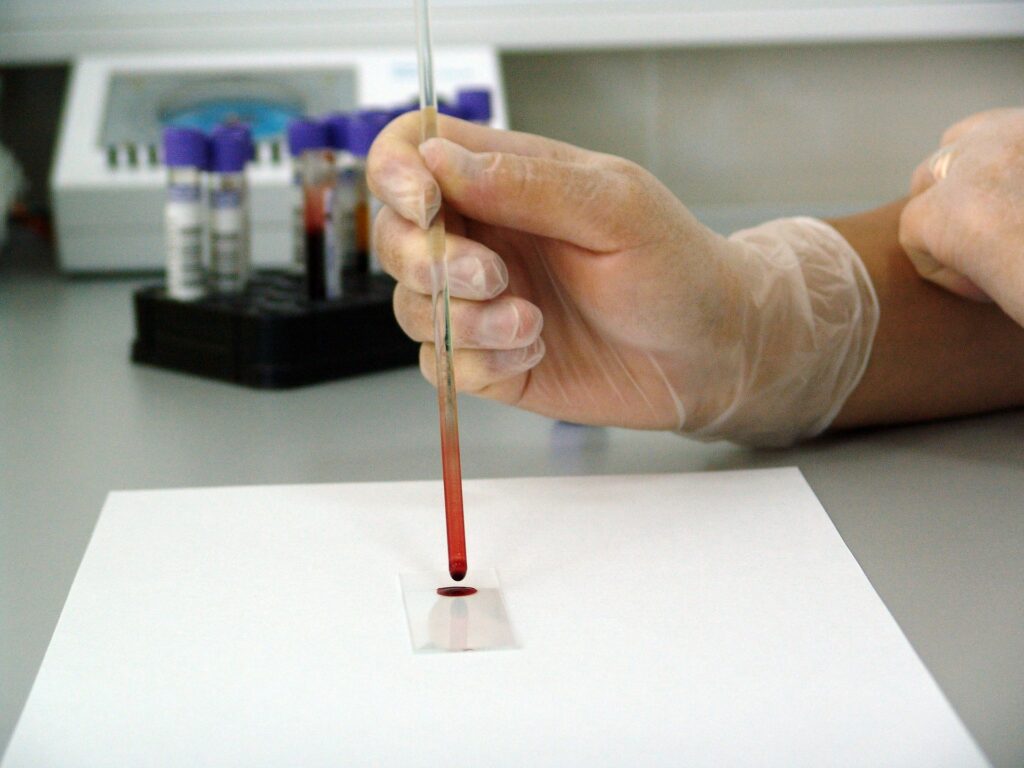
If you can make the jump from PhD to consulting, more power to you. Even more power to you if you can do it on the side while you study . But if you don’t know the field you want or the value you offer, it might be worth getting “paid training” through working in a job.
I wish more would-be PhD consultants knew this…
When I worked at the think tank, I ran projects, won grant money, and worked with stakeholders. My next job in government taught me how much I didn’t know about how government works , how things get done, and how to use a bunch of acronyms.
When I recently told a director (a mid-level manager in the Canadian government) that I was going into consulting, he was excited—every time they hire consultants they have to teach them about how they do things.
He realized that if he hired me he wouldn’t have to do that.
If I had jumped straight into consulting from the PhD, I would have had a difficult time. I’m not sure what I would have sold (writing or editing probably) and, if I were successful, my life would look very different.
I learned so much from working every job I’ve done that makes succeeding in consulting more possible—but still far from a sure thing.
Don’t rule out working a job if your goal is to eventually do consulting.
What about PhD Consulting Jobs?
If you want to get a first-class consulting training, you might consider a consulting firm. For a PhD management consulting might be a great fit. These consultant jobs mean that you won’t be an entrepreneur per se, but you will get a fantastic introduction to the wide world of consulting. Check out McKinsey , Bain , or Boston Consulting Group (BCG). All of them have entry level consulting jobs for PhDs. And (BTW), many people who start with these companies eventually found their own.
Ok, so you’re launching a consultancy.
- Will it be a corporation, a partnership, or will you operate as a sole proprietor?
- Do your clients hire sole proprietors, or do they require incorporation?
- How will you do your bookkeeping?
- Are you keeping track of your tax write-offs?
- Do you need insurance?
You don’t need to know EVERYTHING about business , but the things I mentioned above are considered basics.
Try reading some business books. Drop by a local small business support center, or browse government websites dedicated to helping.
Learn as much as you can.
Two things that helped me:
Bookkeeping for Dummies — It wasn’t John Grisham, but I read it cover to cover. Learn these basics if you are serious about running a business.
FreshBooks – This is an amazing and simple bookkeeping solution, perfect for consulting. It’s simple, but lets you send pro invoices, keep track of profit and loss, and expenses.
Pricing” target=”_blank” rel=”noreferrer noopener sponsored”> Click here to check the price for FreshBooks in your region.
I don’t want to discourage you. With all the weird stuff you’ve learned, you can learn the basics of business!
But go do it! Treat it as seriously as your most important academic investigation. Because the skills you grow will change your life.
It’s really hard to learn how to charge for consulting.
If you’re going to charge $15 an hour as a consultant, you might be better off working at McDonald’s. It’s tempting to bid cheap to win contracts, and sometimes you might have to do that.
But your foray into consulting can’t be a race to the bottom or you won’t make it.
Price your service high enough that some people might say no (again make sure you know what your value proposition is). Recognize that people equate price with value, and expect to pay a little more for someone who will do a great job.
To give you a frame of reference, my own PhD consulting hourly rate was $70 an hour for most clients. For the occasional passion projects or non-profits, I’ll go lower—my lowest right now would be $55 an hour.
Now, of course, I don’t actually charge by the hour—I charge by the project.
But if a client wants to know what my hourly rate is, that’s it. And when I estimate a project, that’s the framework I use. (Update-I now charge between $100-$350 hourly. I’ve upped my rates as time goes on.)
Now let me guess. You’re sitting there as a graduate student thinking that this is an obscene amount of money.
And from a $15k stipend, it seems like it.
It’s actually a win-win. I didn’t make $70 an hour in any career job I worked. As a PhD consultant, I’m assuming all the risk. I’m personally not willing to assume a high level of risk to make the same as I made in a job.
And it’s a win for the employer too, believe it or not. It costs an employer anywhere from $70,000-$130,000+ a year to hire someone full-time to do what I can do–and it’s a headache.
So if someone hires me for $40,000 to get done what it would normally cost them $80,000 they’ve saved a lot. If I can get between 4-10 contracts a year that are between $20,000-$45,000 I’ve made some fantastic money.
Now—before you see the dollar signs rolling in front of your eyes, let’s add a caution here. If I sold 4-10 projects a year worth $1,000 each I’d be living in poverty.
Some consultants do–especially the first year. Just because you CAN make a ton of money consulting doesn’t mean you WILL.
Again, I don’t want to discourage anyone, but it’s important to have a realistic view of what might happen and prepare for anything.
Did you know? – The challenge that sinks most consultants is the balance between selling and delivering. They get their first contract and work hard at it, forgetting about finding the next one. Or they get caught up in chasing leads and their quality suffers. It’s a tough balance — you’ll have to work to figure it out.
If people are going to pay you $70 an hour to be a consultant for them, they want you to be professional. That means putting the grubby PhD student identity away (if they’re still around). Polish, polish, polish your brand.. Work on your LinkedIn and share material on it, get professional head shots. Perhaps get a website. You’re in the business of marketing YOU inc. right now, so make sure you would want to hire you.

Work on how you carry yourself. Practice your handshake so it’s firm. Study speaking and projecting confidence.
I know these things sound so ridiculous, but they seriously make a huge difference and will make you more likely to succeed. Confidence especially is critical and is easier said than done.
And get ONLINE! I get consulting clients now from my digital presence. If you want to know how to get started, I created a free email course on mastering your digital brand and making money from it!
Book Recommendation: There are two great books on building confidence: Steal the Show — a book about “performing” your roles in life, and The Confidence Code — directed towards helping women grow confidence.
5 Personal Brand Tips to Put Your Growth on Autopilot
If you’re serious about consulting, you can’t be the expert on everything.
There are two people every entrepreneur should have in their ear: a lawyer and an accountant.
- The lawyer will help you be legal and legitimate (if you decide to incorporate) but can also offer advice on contractor agreements, non-disclosure agreements, and a whole bunch of other legal processes that are vital for entrepreneurs.
- The accountant will tell you how to structure a company, and teach you how to pay only the taxes you need to (I’m not talking about setting up a shell company in Panama here—but you really don’t want to pay more taxes than necessary), and what you need to keep for bookkeeping, tax write-offs, etc.
You need both of these people.
You don’t need either of them full-time.
Chances are, once you’re running, you’ll only see your accountant once a year and your lawyer perhaps less than that.
But do find someone with the heart of a teacher that you can call with little questions as you have them. If your lawyer or accountant makes you feel like an idiot or won’t explain things to you, fire them.
Pro Tip: Don’t spend tons of money upfront. Lawyers and accountants have tons of things they can charge you for—monthly check-ins, extra paperwork, etc. I chose to do the bare minimum UNTIL I had cashflow. You should absolutely make sure you’re going to have some money coming in, perhaps even have your first few clients tentatively signed, before you drop a ton of money on lawyers and accountants. It’s too easy to get in way over your head up front.
Just like in academia, imposter syndrome among entrepreneurs is rampant. So you may never feel good enough. And in the end, it’s one more place you’ll have to #fakeittillyoumakeit.
If you’re making the leap, make sure to prepare for this. Find a good mentor–a BUSINESS mentor (not your PI). Look for mastermind groups or meetups of business people, and surround yourself with people who think like entrepreneurs.
Deal with your money blocks before they bite you in the ass.
This is a very minimal guide to consulting. I’m still learning lots about it, so I’ll post more as I learn. What do you think? Are you planning to make the jump? Have you thought it through? Have I missed anything?
If you’re ready, follow my 7 Easy Steps To Launch Your Consulting Business This Week. And good luck!
Now Read- What My $40,000 Client Taught Me About Starting a Consulting Business (Video)

Book Recommendation
If you’re looking for a fantastic book that will give you some great advice on building a consulting practice, this is a great book to start with.

Consulting Secrets 3 – Landing Clients
Photo by Christian Sterk on Unsplash There’s a new type of post buzzing around LinkedIn. I confess, I’ve even made a few. The post is

You’re Not Good Enough… Yet
Last year, I spent $7k on a business coach. She was fantastic. She helped me through sessions of crafting my ideas to become a “thought

$200/hr Expert? Here’s the Secret!
Photo by David Monje on Unsplash I was listening to Tony Robbins this week. He was talking about being the best. Tony asks the audience,
SHARE THIS:
EMAIL UPDATES
Weekly articles, tips, and career advice
Roostervane exists to help you launch a career, find your purpose, and grow your influence
- Write for Us
Terms of Use | Privacy | Affiliate Disclaimer
©2023 All rights reserved

About Features Online Exclusives From the President Career Consultation Knowledge Share Explore
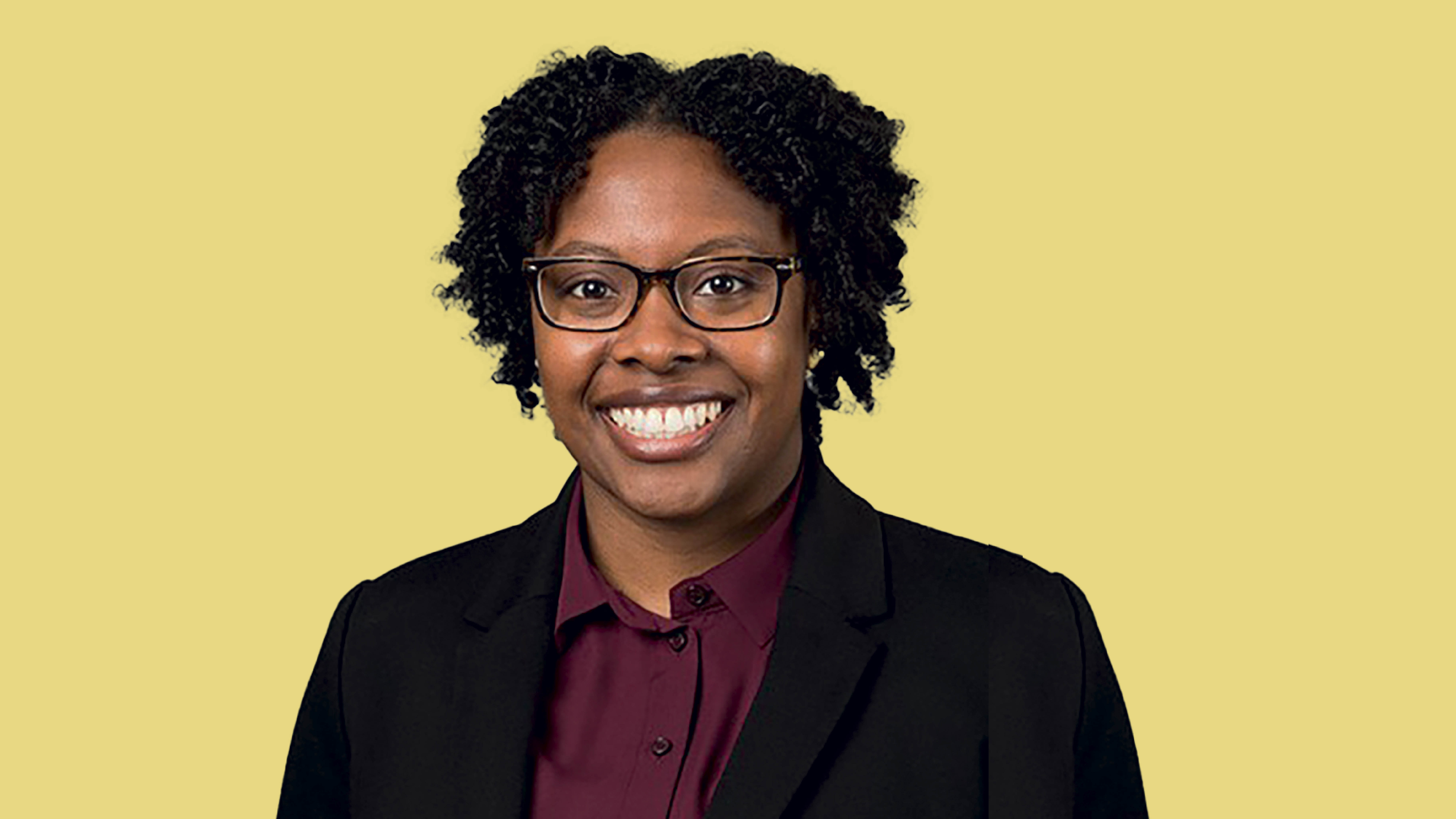
Workplace Wellness in Clients with Disabilities
Five strategies counselors can use to help clients with disabilities overcome employment challenges and improve workplace wellness.
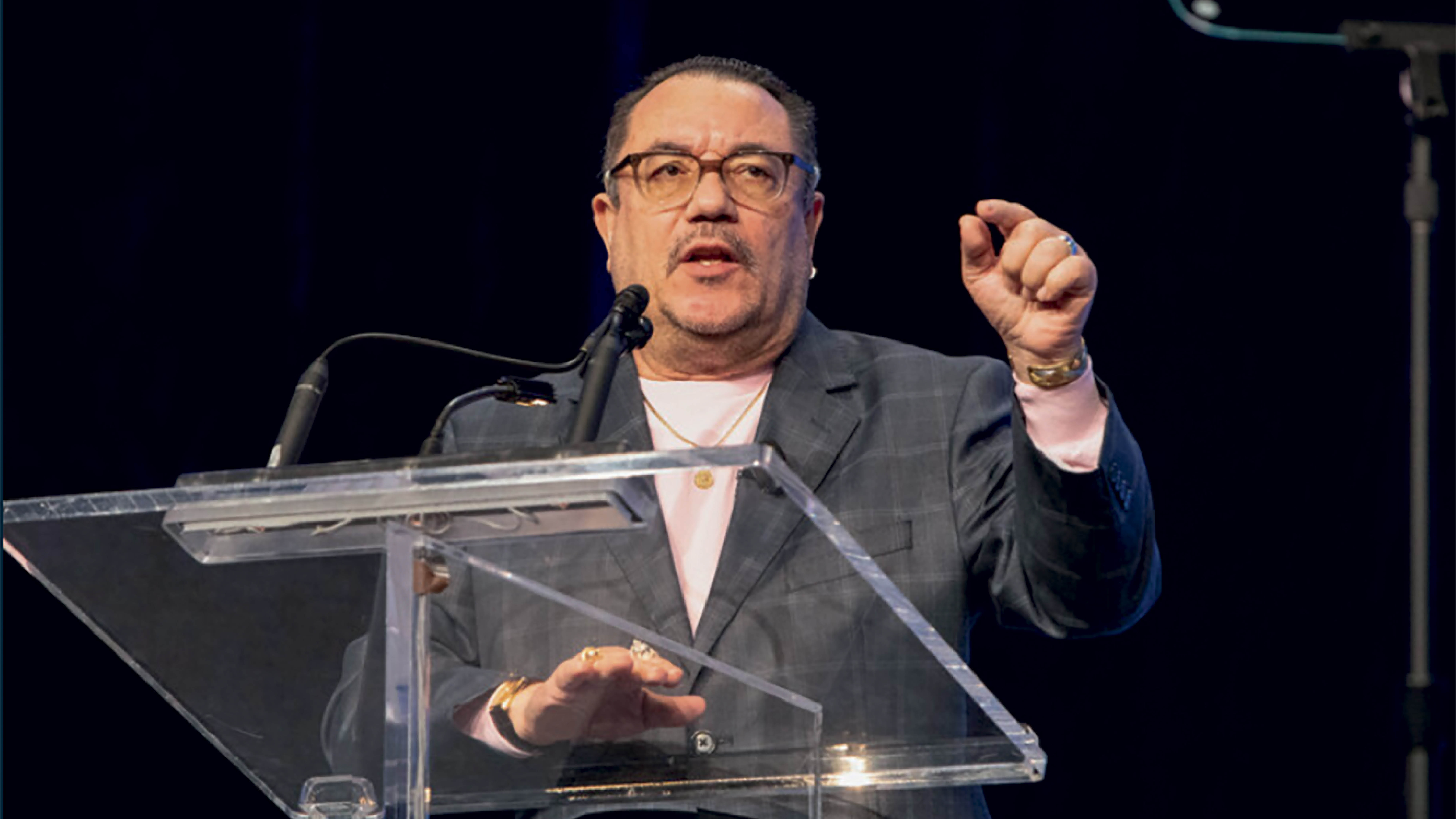
A Year of Growth

Path to Discovery
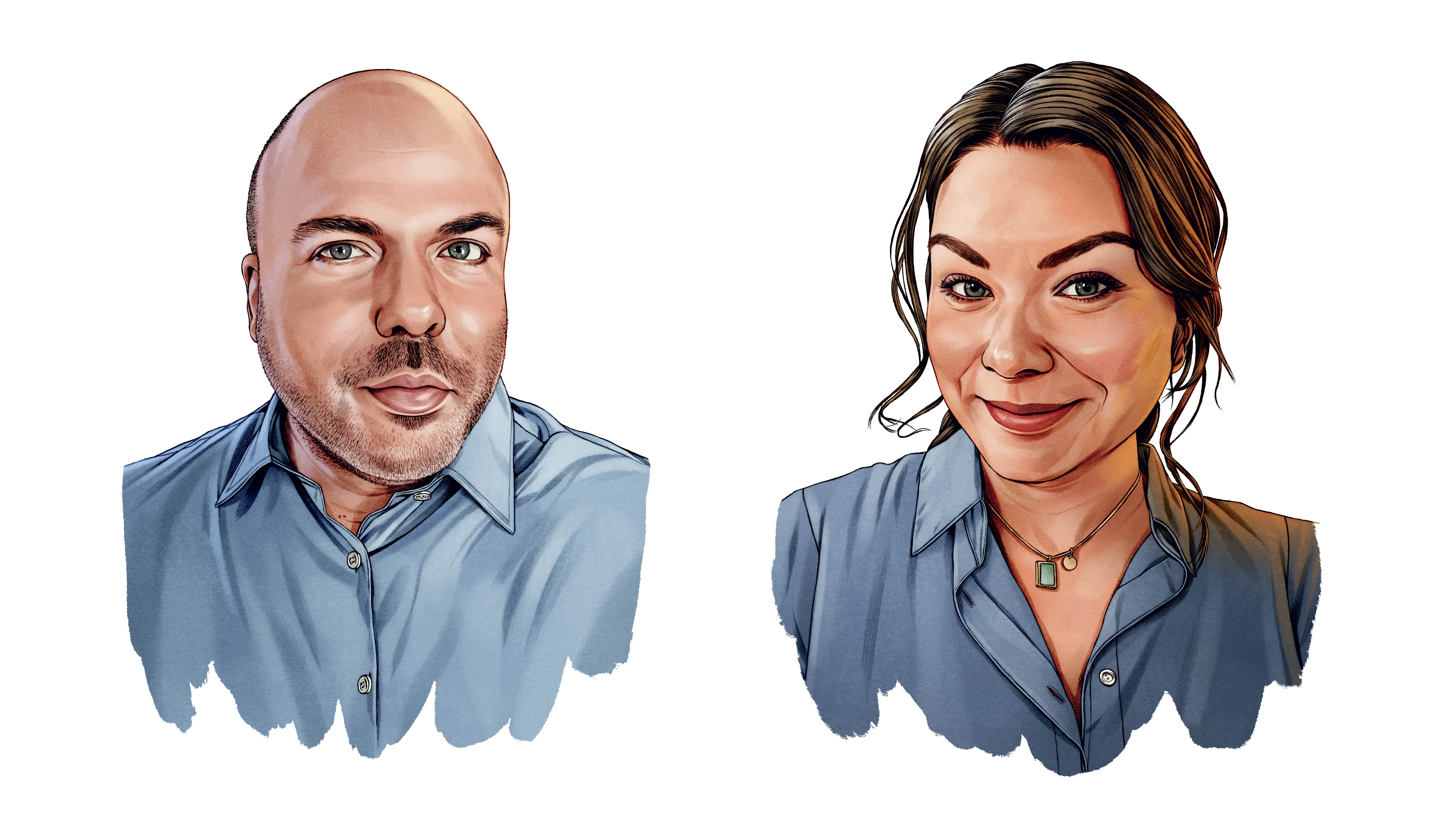
How an Associate Counselor Can Target Clientele
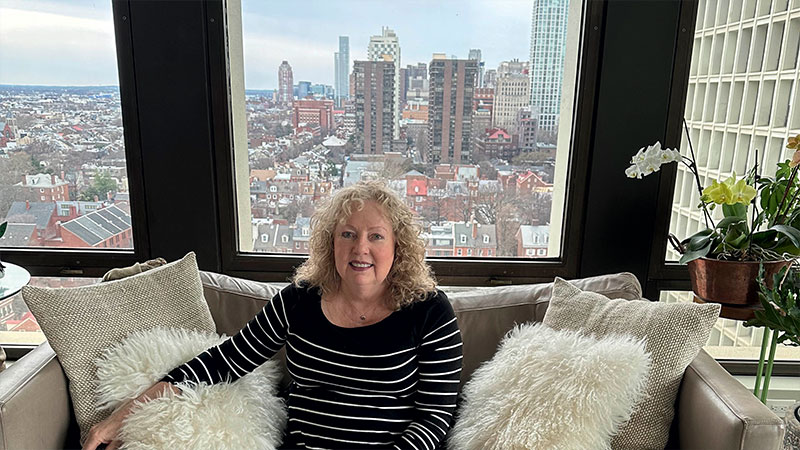
Choose Your Own Adventure

Bridging the Gap
MORE FROM THIS ISSUE
Online Exclusives
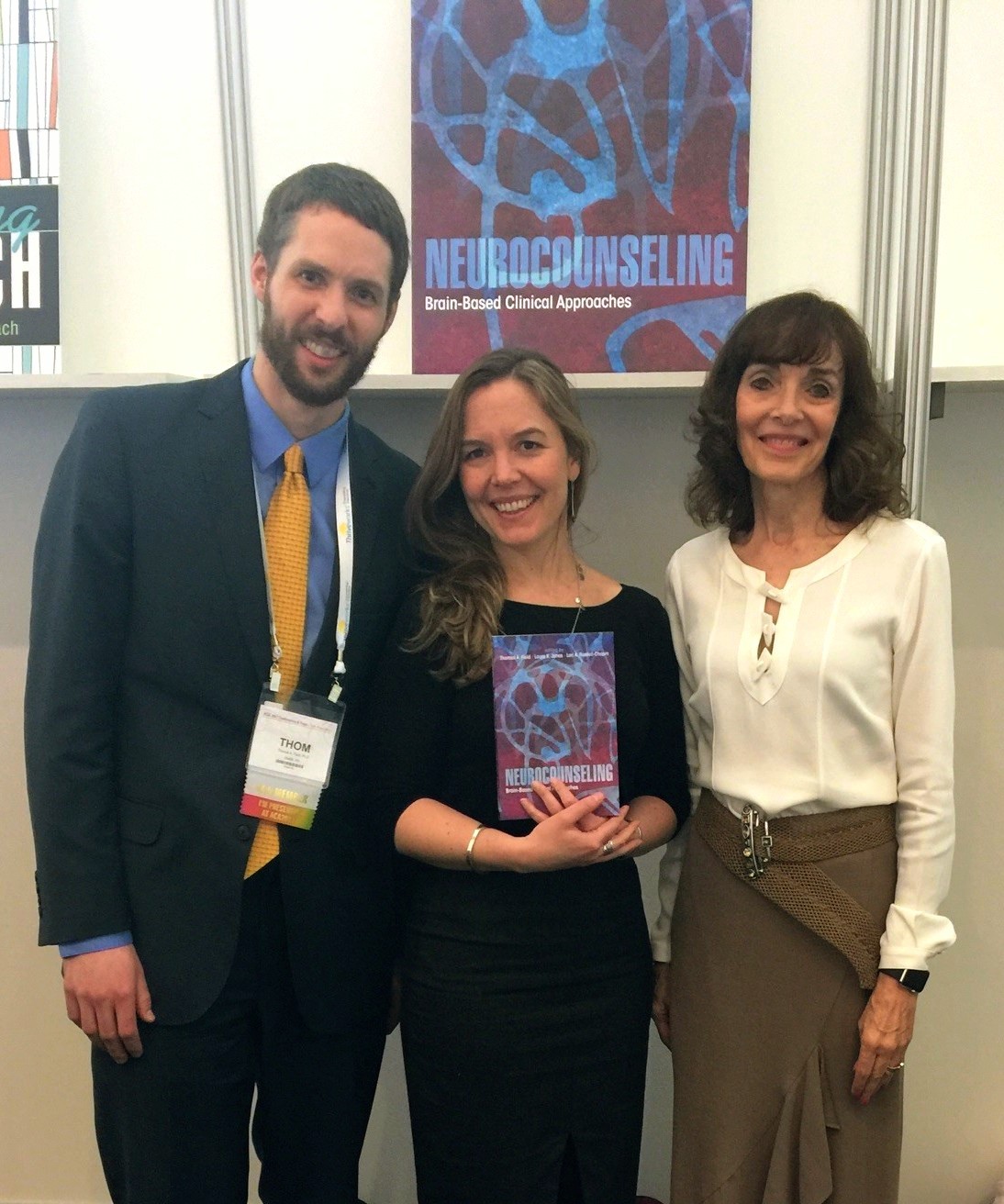
The editors of Neuroscience Informed Counseling discuss what it means to be a neuroscience-informed counselor.
- Counseling Specialties & Workplace Settings
- Professional Development
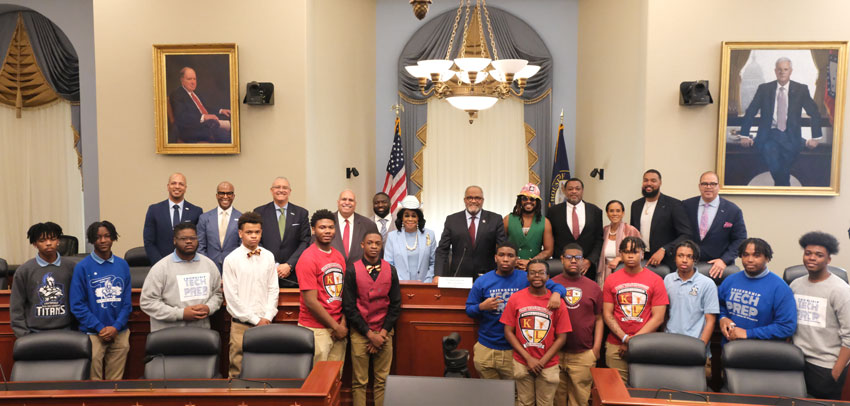
ACA CEO Shawn Boynes, FASAE, CAE, and other mental health leaders testified before Congress on the need for innovative solutions, better representation and pay, and collaboration to improve the mental well-being of Black men and boys
- Cultural Responsiveness
- General Public
- Professional Counseling
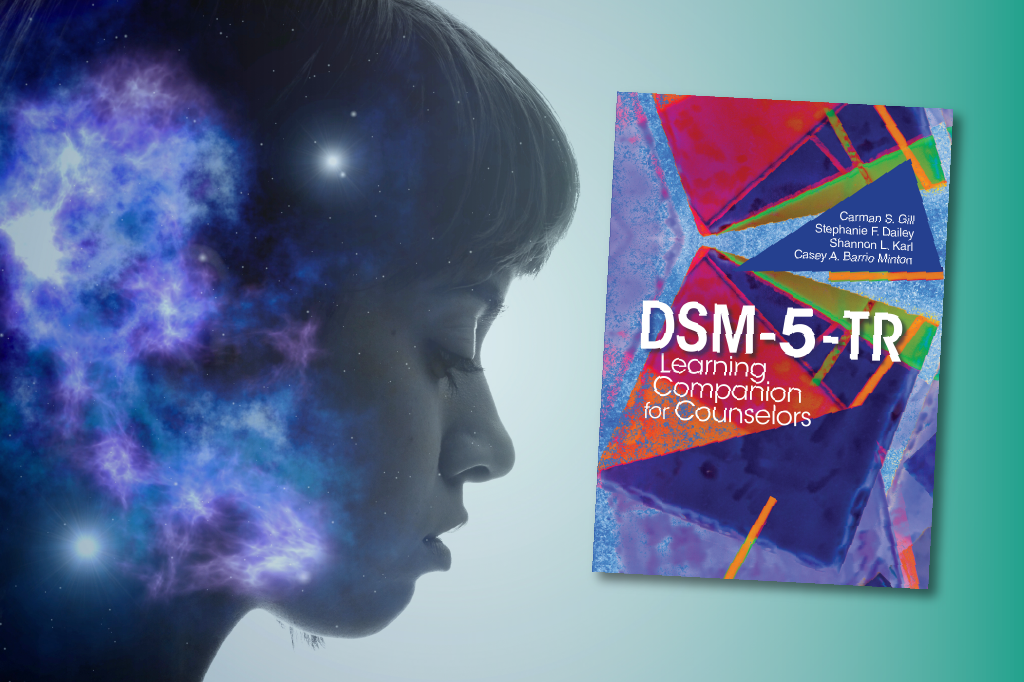
The authors of the DSM-5-TR Learning Companion for Counselors discuss how their book can help counselors better understand and implement recent changes to the DSM in their clinical practice.
- Assessment, Diagnosis & Treatment
- Diagnostic / Assessment Tools
Explore More Online Exclusives
Counseling Today Blog
By Laura Smestad, PhD, LMHC
.jpg?sfvrsn=273d45d0_1)
Here are some ways to gain professional experience as a graduate student that will help you craft a stronger CV:
- Pursue teaching assistant opportunities. Being a teaching assistant is a great way to start adding teaching experience to your CV. At the graduate level, instructors will often allow doctoral student teaching assistants to co-teach the class or facilitate some class sessions independently. This also allows you to build stronger connections with faculty members. (As a bonus, they may even be willing to serve as a reference when you apply for a teaching position in the future!) Reach out to your doctoral program directors or instructors to see if they can help place you in a master’s-level class as a teaching assistant.
- Volunteer your time. Professional service is a fulfilling way to give back to the counseling profession, and it can provide opportunities for growth as well. You can apply to serve on various graduate student committees (like ACA’s) or get involved in Chi Sigma Iota, either at the national level or through your local chapter. Volunteering can sometimes lead to leadership roles within organizations, which can also benefit your CV.
- Explore fellowship opportunities at your university or professional organizations. Many counselor education and supervision programs offer fellowships to their students in areas such as research, leadership and advocacy. Being a fellow allows students the opportunity to be mentored by faculty members who have expertise in areas that align with the student’s career goals. The Counselor Education and Supervision journal also offers editorial fellowship positions for doctoral students, which is another opportunity to add research experience to your CV. Additionally, the National Board for Certified Counselors offers scholarships through the Minority Fellowship Program . Even if you are not awarded a fellowship, you can still reach out to professors at your university to see if anyone needs a research assistant to help with any of their current projects.
- Offer to guest lecture. If you have an area of expertise, connect with faculty members and offer to guest lecture in one of their courses. This is another way to add teaching experience to your CV and forge connections with professors. For example, during my first year as a counseling graduate student, I emailed the instructors teaching the psychopathology course the upcoming quarter to see if they were interested in having me lecture on obsessive-compulsive disorder, which is my focus area as a clinician. As a result, I have done a significant amount of guest lecturing because I have found instructors are eager to have someone with expertise come talk to their class. This was also a great way for me to meet professors whom I otherwise may not have encountered as a doctoral student.
- Apply for leadership opportunities. There are many leadership opportunities in the field, especially for doctoral students. Each region of the Association for Counselor Education and Supervision (e.g., Western ACES, Southern ACES) typically has an emerging leaders program that is designed for graduate students who want to pursue leadership opportunities, and these programs provide mentoring opportunities as well as guest speakers. You can join these organizations’ email lists and learn more about their leadership programs. Local counseling organizations also typically look for new committee leaders. There may even be leadership opportunities available at your own university!
Finally, remember that you don’t have to gain these professional experiences all at once. You can space out these opportunities throughout your doctoral program, especially if you start early. If you slowly take advantage of opportunities, then you will have a competitive CV by the time you graduate!
- Career Development
Search CT Articles
Current Issue
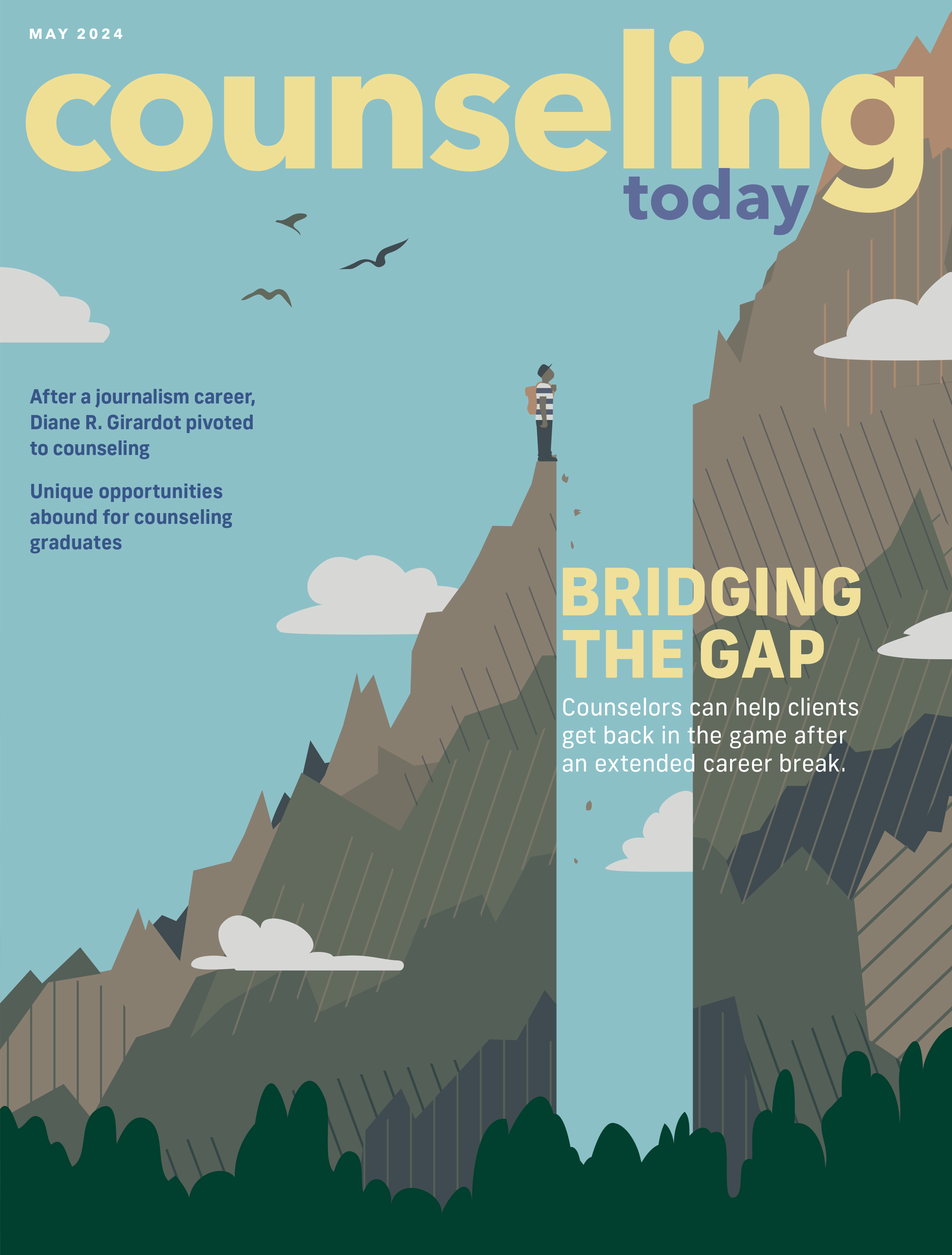
Editor's Picks
- Diversification and Burnout Prevention for Counselors
- Treating anxiety in children
- A closer look at the mental health provider shortage
- Generational trauma: Uncovering and interrupting the cycle
- Making every moment of clinical supervision count
-250x250-ad-3-20-24-kdf.png?sfvrsn=a0e044d0_1)
Share Your Thoughts
Online Readers Survey
Sign Up for Updates
Keep up to date on the latest in counseling practice. Sign up to receive email updates from Counseling Today .
CT on YouTube
Download Recent Issues
ACA members receive access to past full issues of Counseling Today . Log in to download copies from the archive.
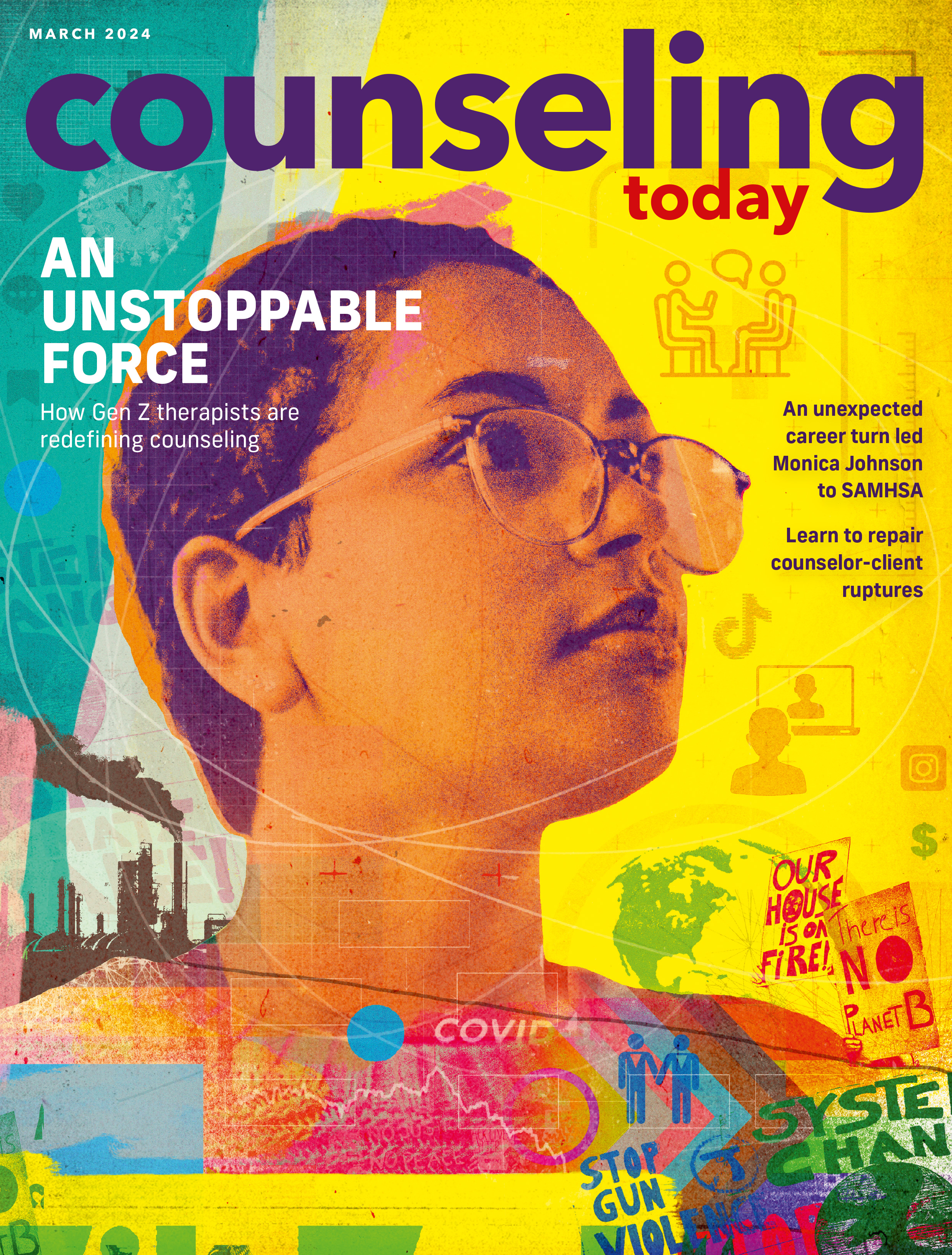
January 2024
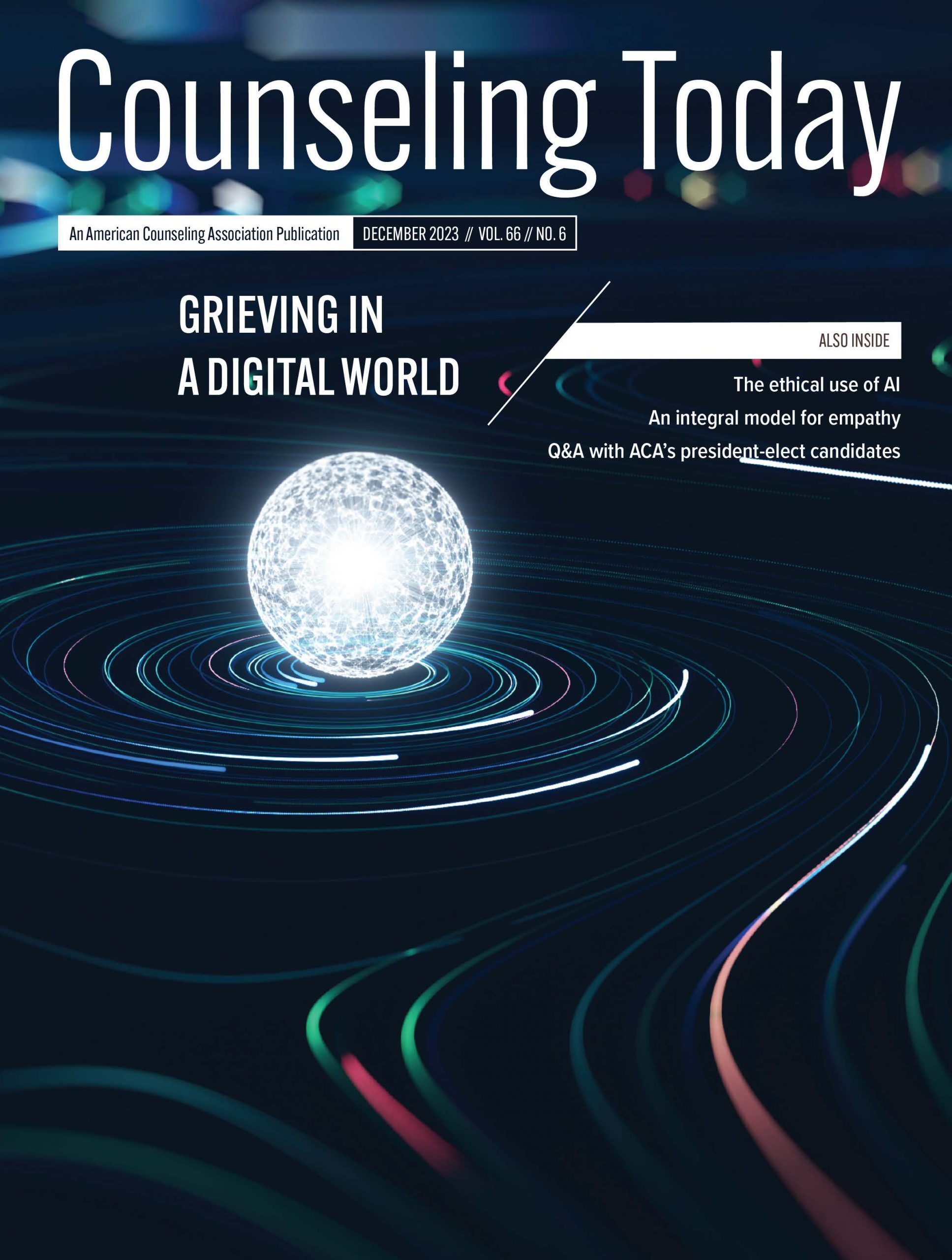
December 2023
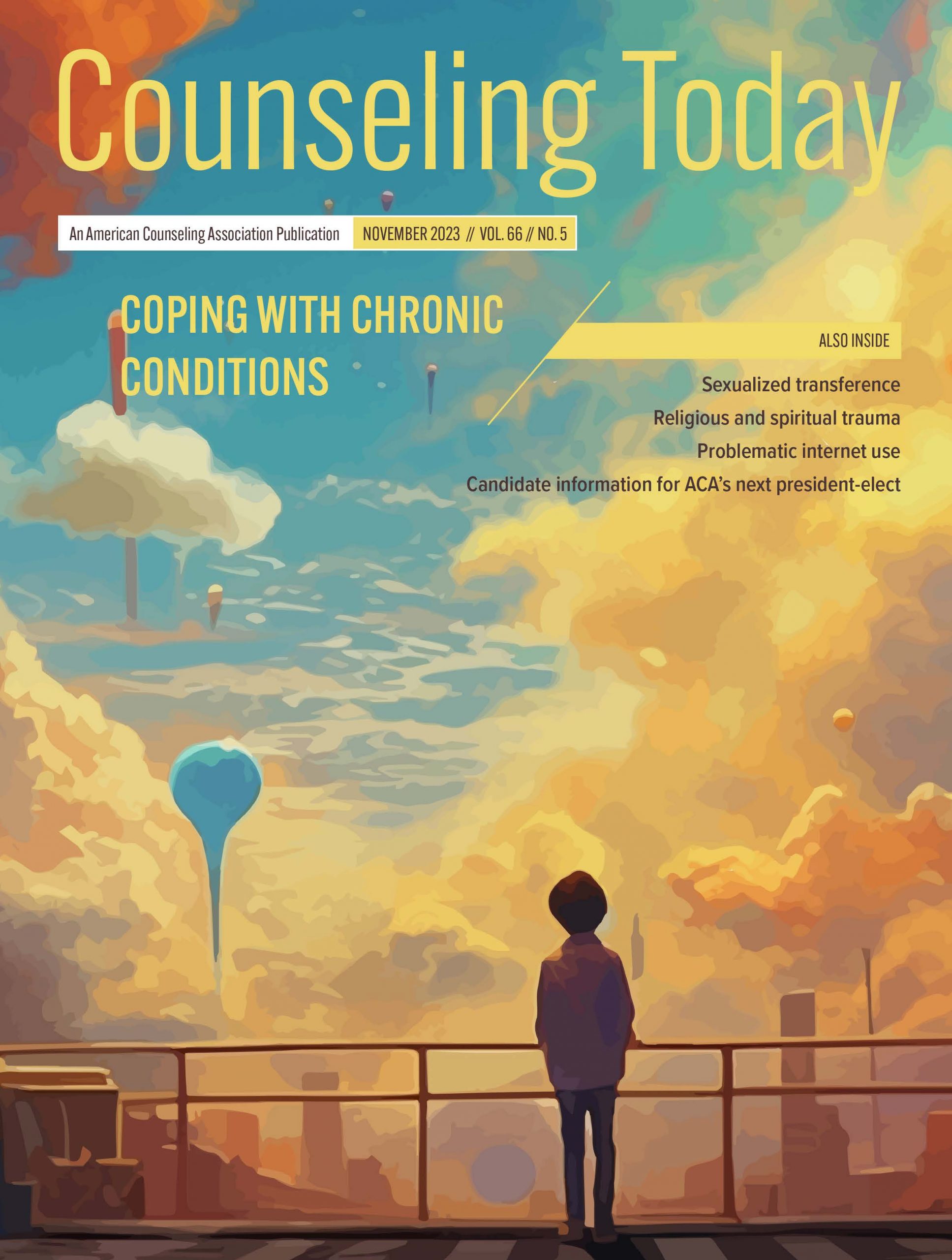
November 2023
VIEW RECENT ISSUES

2461 Eisenhower Avenue, Suite 300, Alexandria, Va. 22314 | 800-347-6647 | (fax) 800-473-2329
My ACA Join Now Contact Us Privacy Policy Terms of Use © All Rights Reserved.
Follow Puck Worlds online:
- Follow Puck Worlds on Twitter
Site search
Filed under:
- Kontinental Hockey League
Gagarin Cup Preview: Atlant vs. Salavat Yulaev
Share this story.
- Share this on Facebook
- Share this on Twitter
- Share this on Reddit
- Share All sharing options
Share All sharing options for: Gagarin Cup Preview: Atlant vs. Salavat Yulaev
Gagarin cup (khl) finals: atlant moscow oblast vs. salavat yulaev ufa.
Much like the Elitserien Finals, we have a bit of an offense vs. defense match-up in this league Final. While Ufa let their star top line of Alexander Radulov, Patrick Thoresen and Igor Grigorenko loose on the KHL's Western Conference, Mytischi played a more conservative style, relying on veterans such as former NHLers Jan Bulis, Oleg Petrov, and Jaroslav Obsut. Just reaching the Finals is a testament to Atlant's disciplined style of play, as they had to knock off much more high profile teams from Yaroslavl and St. Petersburg to do so. But while they did finish 8th in the league in points, they haven't seen the likes of Ufa, who finished 2nd.
This series will be a challenge for the underdog, because unlike some of the other KHL teams, Ufa's top players are generally younger and in their prime. Only Proshkin amongst regular blueliners is over 30, with the work being shared by Kirill Koltsov (28), Andrei Kuteikin (26), Miroslav Blatak (28), Maxim Kondratiev (28) and Dmitri Kalinin (30). Oleg Tverdovsky hasn't played a lot in the playoffs to date. Up front, while led by a fairly young top line (24-27), Ufa does have a lot of veterans in support roles: Vyacheslav Kozlov , Viktor Kozlov , Vladimir Antipov, Sergei Zinovyev and Petr Schastlivy are all over 30. In fact, the names of all their forwards are familiar to international and NHL fans: Robert Nilsson , Alexander Svitov, Oleg Saprykin and Jakub Klepis round out the group, all former NHL players.
For Atlant, their veteran roster, with only one of their top six D under the age of 30 (and no top forwards under 30, either), this might be their one shot at a championship. The team has never won either a Russian Superleague title or the Gagarin Cup, and for players like former NHLer Oleg Petrov, this is probably the last shot at the KHL's top prize. The team got three extra days rest by winning their Conference Final in six games, and they probably needed to use it. Atlant does have younger regulars on their roster, but they generally only play a few shifts per game, if that.
The low event style of game for Atlant probably suits them well, but I don't know how they can manage to keep up against Ufa's speed, skill, and depth. There is no advantage to be seen in goal, with Erik Ersberg and Konstantin Barulin posting almost identical numbers, and even in terms of recent playoff experience Ufa has them beat. Luckily for Atlant, Ufa isn't that far away from the Moscow region, so travel shouldn't play a major role.
I'm predicting that Ufa, winners of the last Superleague title back in 2008, will become the second team to win the Gagarin Cup, and will prevail in five games. They have a seriously well built team that would honestly compete in the NHL. They represent the potential of the league, while Atlant represents closer to the reality, as a team full of players who played themselves out of the NHL.
- Atlant @ Ufa, Friday Apr 8 (3:00 PM CET/10:00 PM EST)
- Atlant @ Ufa, Sunday Apr 10 (1:00 PM CET/8:00 AM EST)
- Ufa @ Atlant, Tuesday Apr 12 (5:30 PM CET/12:30 PM EST)
- Ufa @ Atlant, Thursday Apr 14 (5:30 PM CET/12:30 PM EST)
Games 5-7 are as yet unscheduled, but every second day is the KHL standard, so expect Game 5 to be on Saturday, like an early start.
Loading comments...
- Yekaterinburg
- Novosibirsk
- Vladivostok

- Tours to Russia
- Practicalities
- Russia in Lists
Rusmania • Deep into Russia
Out of the Centre
Savvino-storozhevsky monastery and museum.

Zvenigorod's most famous sight is the Savvino-Storozhevsky Monastery, which was founded in 1398 by the monk Savva from the Troitse-Sergieva Lavra, at the invitation and with the support of Prince Yury Dmitrievich of Zvenigorod. Savva was later canonised as St Sabbas (Savva) of Storozhev. The monastery late flourished under the reign of Tsar Alexis, who chose the monastery as his family church and often went on pilgrimage there and made lots of donations to it. Most of the monastery’s buildings date from this time. The monastery is heavily fortified with thick walls and six towers, the most impressive of which is the Krasny Tower which also serves as the eastern entrance. The monastery was closed in 1918 and only reopened in 1995. In 1998 Patriarch Alexius II took part in a service to return the relics of St Sabbas to the monastery. Today the monastery has the status of a stauropegic monastery, which is second in status to a lavra. In addition to being a working monastery, it also holds the Zvenigorod Historical, Architectural and Art Museum.
Belfry and Neighbouring Churches

Located near the main entrance is the monastery's belfry which is perhaps the calling card of the monastery due to its uniqueness. It was built in the 1650s and the St Sergius of Radonezh’s Church was opened on the middle tier in the mid-17th century, although it was originally dedicated to the Trinity. The belfry's 35-tonne Great Bladgovestny Bell fell in 1941 and was only restored and returned in 2003. Attached to the belfry is a large refectory and the Transfiguration Church, both of which were built on the orders of Tsar Alexis in the 1650s.

To the left of the belfry is another, smaller, refectory which is attached to the Trinity Gate-Church, which was also constructed in the 1650s on the orders of Tsar Alexis who made it his own family church. The church is elaborately decorated with colourful trims and underneath the archway is a beautiful 19th century fresco.
Nativity of Virgin Mary Cathedral

The Nativity of Virgin Mary Cathedral is the oldest building in the monastery and among the oldest buildings in the Moscow Region. It was built between 1404 and 1405 during the lifetime of St Sabbas and using the funds of Prince Yury of Zvenigorod. The white-stone cathedral is a standard four-pillar design with a single golden dome. After the death of St Sabbas he was interred in the cathedral and a new altar dedicated to him was added.

Under the reign of Tsar Alexis the cathedral was decorated with frescoes by Stepan Ryazanets, some of which remain today. Tsar Alexis also presented the cathedral with a five-tier iconostasis, the top row of icons have been preserved.
Tsaritsa's Chambers

The Nativity of Virgin Mary Cathedral is located between the Tsaritsa's Chambers of the left and the Palace of Tsar Alexis on the right. The Tsaritsa's Chambers were built in the mid-17th century for the wife of Tsar Alexey - Tsaritsa Maria Ilinichna Miloskavskaya. The design of the building is influenced by the ancient Russian architectural style. Is prettier than the Tsar's chambers opposite, being red in colour with elaborately decorated window frames and entrance.

At present the Tsaritsa's Chambers houses the Zvenigorod Historical, Architectural and Art Museum. Among its displays is an accurate recreation of the interior of a noble lady's chambers including furniture, decorations and a decorated tiled oven, and an exhibition on the history of Zvenigorod and the monastery.
Palace of Tsar Alexis

The Palace of Tsar Alexis was built in the 1650s and is now one of the best surviving examples of non-religious architecture of that era. It was built especially for Tsar Alexis who often visited the monastery on religious pilgrimages. Its most striking feature is its pretty row of nine chimney spouts which resemble towers.

Plan your next trip to Russia
Ready-to-book tours.
Your holiday in Russia starts here. Choose and book your tour to Russia.
The Unique Burial of a Child of Early Scythian Time at the Cemetery of Saryg-Bulun (Tuva)
<< Previous page
Pages: 379-406
In 1988, the Tuvan Archaeological Expedition (led by M. E. Kilunovskaya and V. A. Semenov) discovered a unique burial of the early Iron Age at Saryg-Bulun in Central Tuva. There are two burial mounds of the Aldy-Bel culture dated by 7th century BC. Within the barrows, which adjoined one another, forming a figure-of-eight, there were discovered 7 burials, from which a representative collection of artifacts was recovered. Burial 5 was the most unique, it was found in a coffin made of a larch trunk, with a tightly closed lid. Due to the preservative properties of larch and lack of air access, the coffin contained a well-preserved mummy of a child with an accompanying set of grave goods. The interred individual retained the skin on his face and had a leather headdress painted with red pigment and a coat, sewn from jerboa fur. The coat was belted with a leather belt with bronze ornaments and buckles. Besides that, a leather quiver with arrows with the shafts decorated with painted ornaments, fully preserved battle pick and a bow were buried in the coffin. Unexpectedly, the full-genomic analysis, showed that the individual was female. This fact opens a new aspect in the study of the social history of the Scythian society and perhaps brings us back to the myth of the Amazons, discussed by Herodotus. Of course, this discovery is unique in its preservation for the Scythian culture of Tuva and requires careful study and conservation.
Keywords: Tuva, Early Iron Age, early Scythian period, Aldy-Bel culture, barrow, burial in the coffin, mummy, full genome sequencing, aDNA
Information about authors: Marina Kilunovskaya (Saint Petersburg, Russian Federation). Candidate of Historical Sciences. Institute for the History of Material Culture of the Russian Academy of Sciences. Dvortsovaya Emb., 18, Saint Petersburg, 191186, Russian Federation E-mail: [email protected] Vladimir Semenov (Saint Petersburg, Russian Federation). Candidate of Historical Sciences. Institute for the History of Material Culture of the Russian Academy of Sciences. Dvortsovaya Emb., 18, Saint Petersburg, 191186, Russian Federation E-mail: [email protected] Varvara Busova (Moscow, Russian Federation). (Saint Petersburg, Russian Federation). Institute for the History of Material Culture of the Russian Academy of Sciences. Dvortsovaya Emb., 18, Saint Petersburg, 191186, Russian Federation E-mail: [email protected] Kharis Mustafin (Moscow, Russian Federation). Candidate of Technical Sciences. Moscow Institute of Physics and Technology. Institutsky Lane, 9, Dolgoprudny, 141701, Moscow Oblast, Russian Federation E-mail: [email protected] Irina Alborova (Moscow, Russian Federation). Candidate of Biological Sciences. Moscow Institute of Physics and Technology. Institutsky Lane, 9, Dolgoprudny, 141701, Moscow Oblast, Russian Federation E-mail: [email protected] Alina Matzvai (Moscow, Russian Federation). Moscow Institute of Physics and Technology. Institutsky Lane, 9, Dolgoprudny, 141701, Moscow Oblast, Russian Federation E-mail: [email protected]
Shopping Cart Items: 0 Cart Total: 0,00 € place your order
Price pdf version
student - 2,75 € individual - 3,00 € institutional - 7,00 €

Copyright В© 1999-2022. Stratum Publishing House

COMMENTS
Click here to book a 1-to-1 resume review session with an ex-McKinsey recruiter or interviewer. 5. BCG resume example. The below resume belongs to David, a consulting interview coach on our platform (currently a hiring manager at Revolut for the Global Strategy Team). It's the resume that got him into BCG in 2020.
How to transition from a Ph.D. to consulting. You can transition from Ph.D. to consulting by following these nine steps: 1. Identify firms where you want to work. Consulting firms of different sizes and specialties recruit Ph.D.'s., so it's helpful to research the firms that hire consultants in your field.
Lecturer in Molecular Engineering and Bioengineering Researcher: Biomedical Engineering, Ph.D. resume example. Electronic Product Design and Engineering Lab Technician, Ph.D. Mechanical Engineering resume example. APTA Certified Physical Therapist, Doctor of Philosophy in Rehabilitation Science resume example.
In fact, moving from a PhD or Advanced Degree to consulting is a very well-respected career path in the world of top-tier management consulting. Bain, McKinsey, and BCG are looking for the best and the brightest. They want to build a talent pool of sharp problem-solving critical thinkers. In this article, we'll first explore why consulting ...
Resume and cover letter. Maths and logic test. 1st round interviews. 2nd round interviews. Each round of interview typically includes 2 to 5 interviews where you will be asked a mix of case questions and fit questions. The first hurdle you will need to overcome is writing a great PhD consulting resume (template available here).
Follow our 3 tips to write an effective PhD resume: 1. Customize your PhD resume to the job. Where you're applying determines: what sections to include. what skills to list. the order of your sections. the detail with which you discuss your study area and subject-specific skills.
Step 11: Complement your resume with a great cover letter. I always recommend submitting a consulting cover letter. Submit a consulting cover letter even when consulting firms don't ask to. This article will help you write a compelling cover letter.
5) Win with structure. Give your resume structure with clearly demarcated sections. A study tracking where recruiters looked at resumes show they spent nearly 80% of their time on six points: name ...
Going from PhD to consulting can feel intimidating. It's hard to know which consulting firms recruit PhDs, and at which level. And it can also sometimes feel unclear if you'll be using your PhD skills at all or completely starting from scratch. So let's walk through how you should manage your transition from PhD to consulting step by step.
Tip #2 - Use Consistent Formatting. Looks matter. In a detail-oriented, client-facing profession like consulting, how your deliverables look are as important as what they say. The same is true for your management consulting resume. Consistency is the name of the game. Make sure to align and space everything equally.
3. Prepare for the Interview. As a Ph.D. student, this is maybe the scariest for you at this point. You probably have more to learn than an MBA who spent the entire year thinking about it, but the good news is that casing is not rocket science: you do not need a Ph.D. in it to excel.
In contrast, consulting projects are typically solved in 3 - 6 months. As a new consultant, PhD and advanced degree candidates will need to learn how to solve problems quickly by focusing on the most important issues or areas. Doing simple math calculations quickly.
According to the website GlassDoor.com, a junior consultant hired by BCG in the United States—most fresh Ph.D.s enter at this level—can expect to receive a starting salary of $115,000 to $145,000 annually. An entry-level associate with a master's degree can expect to start at $58,000 to $80,000.
Advanced degree holders (JDs, MDs, and PhDs) bring unique and valuable perspectives to our casework. Your expertise, eagerness to learn, and problem-solving abilities will drive change for our clients from day one—but you won't do it alone. You'll join a collaborative and supportive network of digital innovators to deliver extraordinary ...
Updated on 13 July 2023. A move into management consulting can be an excellent option for candidates who have recently completed a PhD, medical degree or law degree. However, the competition to land a coveted offer from a top-tier firm like McKinsey, BCG or Bain can be intense. In this article we explore the firms' 'advanced degree ...
Professional Profile - Example #1. An IT consultant specializing in developing scalable IT infrastructure for enterprise companies. Expertise in cloud technology, Microsoft Azure, and data-driven decision-making. A proven track record of partnering with diverse technology teams to execute large-scale IT initiatives.
Senior Research Consultant Resume Examples & Samples. A minimum of 7 years' research experience, with at least 3 years of this spent in an agency/consultancy. Excellent research and analysis skills - we are looking forqualitative, quantitative and dualist researchers. Ability to influence high performing teams.
Consulting With a PhD - 8 VITAL Steps (2023) Updated May 15, 2023. Six months into my post-PhD career, I left a job at a think tank to do consulting with a PhD. I was watching the money the think tank was taking in to do these research projects. It was a lot of money. And they'd pay me by the hour. And when I sold a $50k project that took ...
By Laura Smestad, PhD, LMHC. Life as a doctoral student can be stressful and overwhelming at times. Between writing papers, working on internship hours, completing course readings and maintaining a work-school-life balance, it can be easy to forget about building a curriculum vitae (CV) that will make you marketable in the field of counselor education and supervision.
3 tips for writing an effective resume summary, says ex-Nvidia recruiter: 'Leave out the years of experience'. Former Google and Nvidia recruiter and current HR consultant Stefanie Fackrell ...
Elektrostal , lit: Electric and Сталь , lit: Steel) is a city in Moscow Oblast, Russia, located 58 kilometers east of Moscow. Population: 155,196 ; 146,294 ...
Much like the Elitserien Finals, we have a bit of an offense vs. defense match-up in this league Final. While Ufa let their star top line of Alexander Radulov, Patrick Thoresen and Igor Grigorenko loose on the KHL's Western Conference, Mytischi played a more conservative style, relying on veterans such as former NHLers Jan Bulis, Oleg Petrov, and Jaroslav Obsut.
Zvenigorod's most famous sight is the Savvino-Storozhevsky Monastery, which was founded in 1398 by the monk Savva from the Troitse-Sergieva Lavra, at the invitation and with the support of Prince Yury Dmitrievich of Zvenigorod. Savva was later canonised as St Sabbas (Savva) of Storozhev. The monastery late flourished under the reign of Tsar ...
Burial 5 was the most unique, it was found in a coffin made of a larch trunk, with a tightly closed lid. Due to the preservative properties of larch and lack of air access, the coffin contained a well-preserved mummy of a child with an accompanying set of grave goods. The interred individual retained the skin on his face and had a leather ...